




GRAND PRESIDENT
HARRY L. BROWN 15 70 Old Colony Bldg. , Chicago, Ill.
GRAND VICE-PRESIDENT AND GRAND COUNSELLOR ]. A. WOODWARD
Leetonia, Ohio
GRAND TREASURER ]. W. SHERA
1602 Lytton Bldg., Chicago, 111.
GRAND SECRETARY
A. A. JENKINS 85 Devonshire St ., Boston, Mass.
GRAND EDITOR
W. G. MANN
402-3 Boston Block Seattle, Wash.

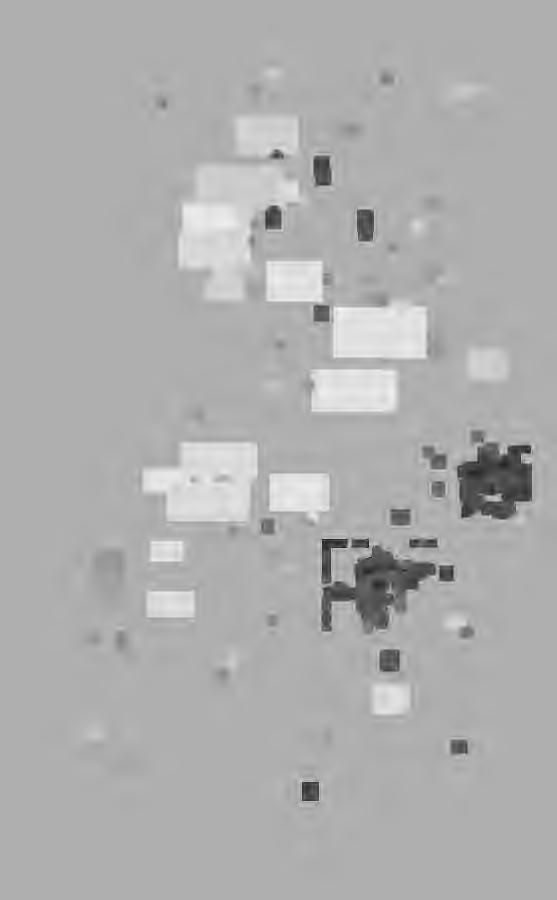

VOLUME XII DECEMBER, 1916
There are many things in this old world On which the changes ring, But Brotherly l ove, Relief and Truth Are the eternal things.
There are many emblems meaning much, But none can quite In practical, suggestive worth To the Compass and the Square.
There are investitures that men Give out with pride and zest, But among what ages may recall · The Lamb Skin is the best.
So in these three abide the tmth In which we can agree Who wear the emblems and whose hearts Are true to Masonry.
And this suggests that warmth of soul Troughout intensive Art Will follow if the Lamb Skin be The clothing of the heart.
2
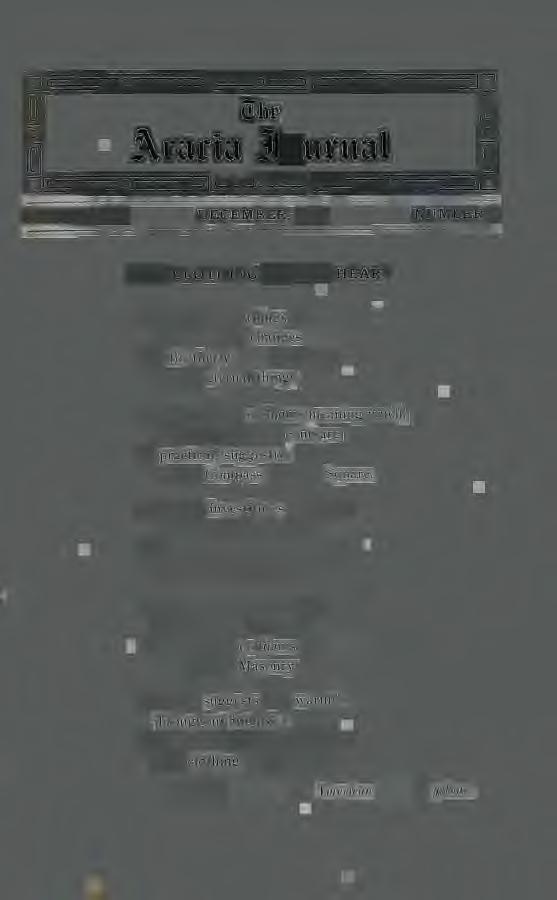
L. B. Mitchell in Th e American Tyler Keystone.
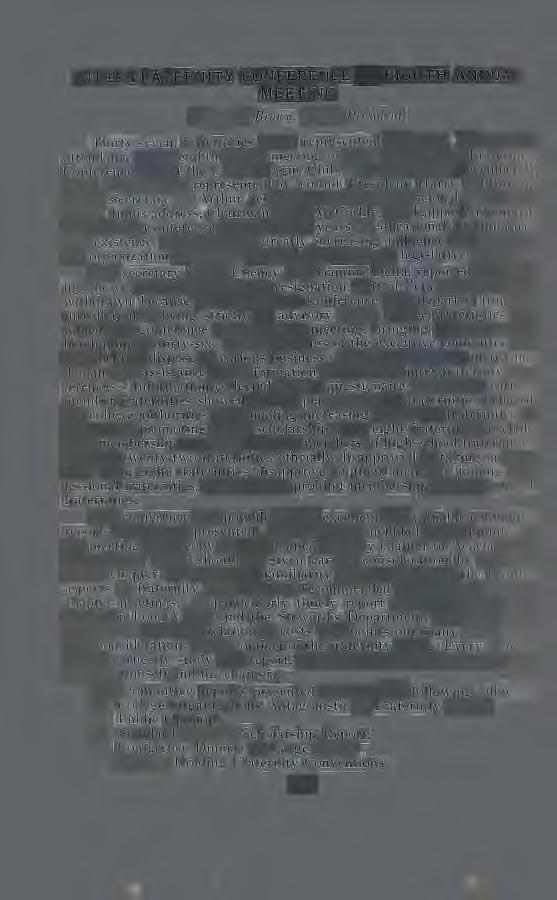
Thirt y -sev en fraternities w ere represented and over 150 m e n in attend a nce at the ei g hth annual meeting of the National Inter-Frat e rnit y Conference held at the Union League Club, New York City, Decemb er 2, 19 16. Acacia was represented by Grand President Harry L. B r own, Grand Secretary A. A rthur Jenkins and Grand Counselor ]. A. W oodward. In his address ; Chairman H . H. McCorkle, Phi Kappa Psi , point ed out that the Conference had had seven years of educational and inf o rm ati v e existence , and noted the greatly increasing influence and v alu e of th e organization in spite of the fact that it has no legislative pow er .
The secretary, 0. H. Cheney , Phi Gamma Delta, reported that du ring the year there had been one resignation, that of Zeta Psi, which had w ithdrawn because it felt that the Conference had departed fr om its juri s diction of being strictly an advisory body. Three fraternitie s h ad joined the Conference since the last meeting, bringing the total m embership up to thirty -six. Seven meetings of the executive committ ee h ad been held to dispose of various business. There had been an incr ea sing demand for assistance in the formation of new local inter-fraternity conferences. Information collected from a questionaire s e nt to the va ri ous member fraternities showed that 85 per cent of the fraternities b elie ved the college authorities were making increasing use of the fraterniti es as a means of promoting better scholarship; that eight fraternities ex clu de from membership men who had been members of high-school fraterniti es, and that twenty-two fraternities officially disapproved of taking in th e -e men; that eight fraternities disapprove of their members joinin g p rofessional fraternities, and that nine prohibit membership in other gen era l fraternities
The conference was notable for the excellent and valuable c o mmitt ee reports which were presented. These will be included in the minut e of th e meeting and a copy of them mailed to every chapter of Acacia i n the near future. They should be given careful consideration by th e individual chapters in order that familiarity may be had with the broader as pects o f fraternity life , and it is recommended that they be r ead in ch a pter meetings. A particularly timely report was that of th e committ e e on Food Value s and the Steward ' s Department, as it deal s with f oo d v alues and their relation to costs , and points out many other perti nent considerations in the conduct of the fraternity table .' Every s t eward sh o uld earnestly study this report, as he will find much of inter est and value to himself and his chapter.
The c o mmittee reports presented were on the following s ubj ects :
1. C o lle g e Organizations Antagonistic to Fraternity Ideals.
2 . Public Opinion .
3. Standard Form of Scholarship Report.
4 . Conference Dinners in Large Cities.
5. Time of Holding Fraternity Conventions . 148
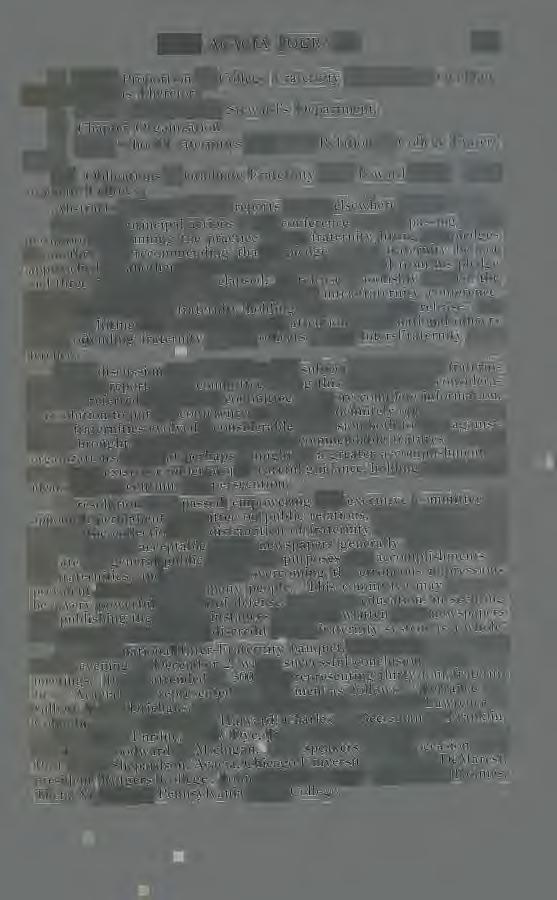
6. What Proportion of College F rat ernity Men Fail to Graduate and the Reasons Therefor.
7. Food Values and the Steward's Department.
8. Chapter Organization.
9 High School Fraternities and Their Relation to Co ll ege Fraternities.
10. Obligations of Graduate Fraternity Men Toward Their Undergrad uat e Fellows.
Abstracts of some of these reports appear elsewhere in this issue. One of the principal actions of the conference was the passing of the resolution condemning the practice of o ne fraternity liftin g the pledges of another and recommending that a pledge of o ne fraternity be not approached by another until he shall have been released from hi s pledge and three months shall have elapsed . If relea se is foolishly refu sed , the matter is to be taken by him to the local int er-f rat e rnity co n ference, which shall cause the fraternity h o lding him t o grant the r e l ease. Instances of lifting are to be called to the attention of the nati o nal of fic ers of the offending fraternity by the officers of the Inter-Fraternity Conference.
Much discussion was also had on the subject of hi g h school fraternities and the report of the committee having this matter under consideration was referred back to the committee for m o re complete informati on. A resolution to put the conference on record as d e finitely opposed to high schoo l fraternities evolved a considerable discussion both for and against. It was brought out that there are some commendable features t o the se organ izations, and that perhaps it might be a g reater accomplishment to fo ter their existence under proper , careful guidance, holding to th e better ideals, than to continue the persecution.
A resolution was passed empowering the executive committee to appoint a permanent committee on public relations, which s hall ha ve as its duty the collection and distribution of fraternity news item s in such form as will be acceptable to the newspapers generally, as a means to educate the general public in the real purposes and accompli s hment s of the fraternities, and to assist in overcoming the erroneous impre ssions prevalent in the minds of many people. This committee may prove to be a very powerful weapon of defense, as well as education , in sec urin g and publishing the truth of instances which are written up in in a manner to reflect great discredit on the fraternity system as a whole.
The first national Inter-Fraternity banquet , held at the Asto r Hotel on the evening of December 2, was a successful conclusion of the day's meetings. It was attended by 500 men , representing thirty-f ou r fraternities. Acacia was represented by ten men as follows: T er rance W. Gi lb ert, I. W. Driehaus, S. A. D. Jones and Dr. G. Alfred Lawrence of Co lumbia; A. A. Jenkins of Harvard, Charles G. Beers man of Franklin, A. W. Neel of Purdue, W. S. Dye, Jr. , of Penn State, and H. L. Brown and J. A. Woodward of Michigan. The speakers for the occasion were Pro f. F. W. Shepardson, Acacia, Chicago University; W. H. S. DeMare st, pre ident Rutgers College; John Dewitt Warner, and Albert Holmes, Theta Xi, dean of Pennsylvania State College.
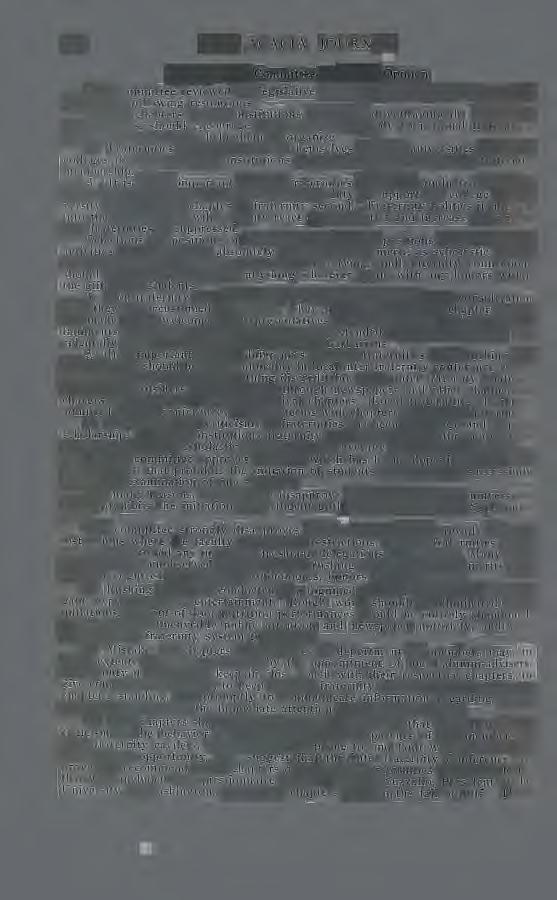
Repo rt of t he Com m itt ee o n Public O pinio n
This committee reviewed the legislative action during the past two years and offered the following resolutions:
I. The chapters in State institutions, instead of discouraging the creation of new chapt e rs, should encourage local societies to apply to national fraternities for chart e rs a nd should help them to organize.
2. Frat e rnities should not confine themselves to State universities and State colleges if there are other institutions that afford good material for fraternity membership.
3. It is vitally important that the fraternities should be conducted in such a spirit that the members will consider it their duty to support the college or univ e r s ity first and their chapter or fraternity second. Fraternity politics if injected into the student body will certainly react on fraternities and increase the clamor that fraternities be suppressed.
Selections for positions on athletic teams and for positions in other student activities should be made abso l utely on the basis of merit, as scholastic honors are awarded by the faculty to the most deserving, and fraternity connections should not be allowed to have anything whatever to do with any honors within the gift of the students
4. Non-fraternity men should be treated by Greeks with more consideration than they are accustomed to receive. They should be invited to chapter houses and made to feel welcome, and representatives should be invited to chapter entertainments and shown as much attention as is extended to any other guests. Incidentally, they should not be called barbs or barbarians.
5. It is important that all differences between fraternities as to rushing and other matters should be settled amicably in loca l inter-fraternity conference agreements, so that there shall be nothing discreditable about inter-fraternty relations, and so that outsiders shall not learn through newspapers and other channels of charges of bad faith on the part of rival chapters. Local fraternities should be admitted to local conferences on equal terms with chapters of national fraternities.
6. One of the chief criticisms of fraternities has been on the ground of poor scholarship. In many institutions fraternity men have suffered the reproach of having made poorer scholastic grades than the average of the student body.
7. The committee approves the rule, which has been adopted by many college faculties, that prohibits the initiation of students who have not successfully passed the examination of one semester.
For many reasons, however, we disapprove of the rule in some universities which prohibits the initiation of a student unti l he has entered the Sophomore class.
The committee strongly disapproves of the custom which prevails in some institutions where the faculty imposes no restrictions, but the fraternities themselves refuse to bid any man after freshman delegations are secured. Many good men will pass unobsefved during the fall rushing period, and their merits may not be recognized until they are sophomores, juniors or even seniors.
8. Rushing should be conducted in a dignified manner, and without extravagant expenditure for entertainment. Rough work should be eliminated from initiations, and out-of-door initiation performances should be entirely abandoned, as they attract unenviable public attention and newspaper notoriety, and tend to expose the fraternity system to ridicule
9. Mistakes by chapters and excesses in deportment by members may, to some extent, at least, be avoided by the appointment of local alumni-advisers , whose duty it shall be to keep in close touch with their respective chapters, to give counsel where needed, to keep national fraternity officers informed as to the chapter ' s standing, and promptly to communicate information regarding conditions that may require the immediate attent ion of the higher officers.
10. The chapters should set their houses in order, so that there may be no criticism of the behavior of the inmates from the parents of the members or from fraternity cavilers , who are only too prone to find fault whenever there is any possible opportunity. We suggest that the Inter-fraternity Conference approve. and recommend to the chapters of the various fraternities the House Rules included a questionnaire which Dr. Henry Suzzallo, President of the Umvers1ty of Washmgton, sent to the chapters there in the fall of 1915. The
House Rules are appended to this report. They were published, with a review of the answers to the questionnaire, in Banta's Greek Exchange for July , 1916.
11. The increasing tendency towards extravagance in chapter house life should be constantly resisted. The charge of extravagance which is frequently made against fraternities prejudices the public against them. To prevent misunder s tanding, every chapter should annually inform the parents of its members as to the amount of fraternity and chapter dues and the price of board and lodging in the chapter house.
Economy should be practised in conducting the chapt e r house, and entertainments involving expense should be strictly limited In this connection we recommend the co-operative scheme for buying chapter house supp li es conducted at Cornell by Mr. A . B . Weller, and we recommend that the Conference authorize a n explanatory pamphlet on the subject to be printed and distributed to all chapters where there are two or more chapters in any institution.
12. There is no telling in what State legislature th e fight on fraternities will be fi·rst renewed, or in how many legislatures th e re will be such attacks during the next year, but in this era of preparedness the fraternities should take some steps toward preparation. We suggest that a collection s hould be made of endorsements of college fraternities from men of national reputation or of high position in the educationa l world, so that these endorsements may be pub li shed broadcast when needed, to confute those who would cast aspersions on fraternities while anti-fraternity legislation is pending. We underst a nd that Mr. William C. Levere, Manager of the Fraternity Reference Bureau , has mad e a collection of such endorsemen t s, and we s u ggest that the Conference rcommend that all frat e rnities co-operate with him in making the co ll ection more complet e.
While the enemies of college fraternities are probably mor e num e r ous n ow than ever before, and more able to affect public opinion by misr eprese nt at ion , it is gratifying to not e that the status of fraternities has improved in two institutions during the past year, both of them in the South and church controlled. Last Decemb e r th e rule against fraternities at Wofford Colle ge was re sc ind ed, and several fraternities h ave r es tored their chapters there. For seve ral years there has been a violent agitation aga inst frat e rnities at M e rcer University, but la s t June the trustees settled the qu es tion favorably to th e Greeks, with instructions that they are to be "regu lated and contro ll ed" by the president and faculty so as to avoid any discrimination " for or against either fr a ternity or n o n -fraternity men in all college activities.
Walter B. Palmer, Chairman ; Wil li a m W . Bride, Walter J. Se a r s an d Jam es B Curtis made up the committee.
Addenda
Study Hours-
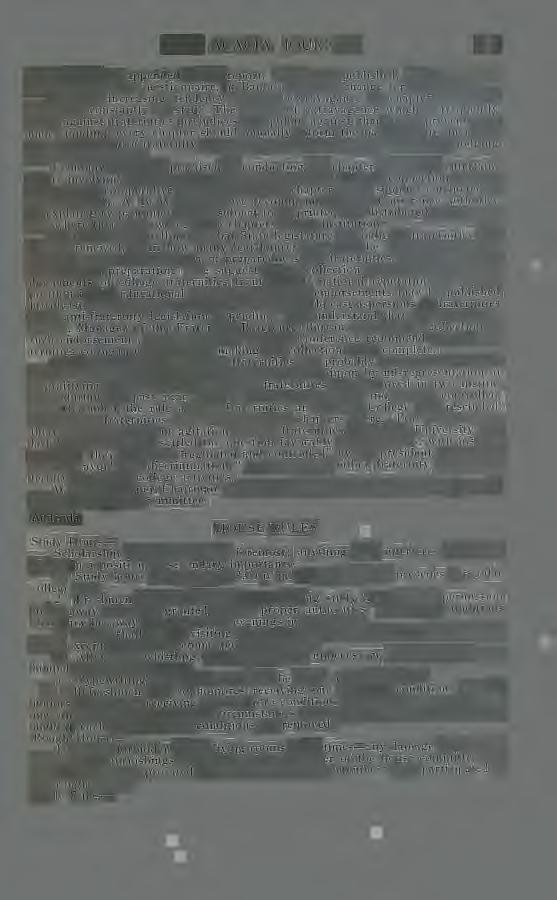
Scholarship should be placed foremost; anything that interf e res should be placed in a position of secondary importance.
1. Study hours sha ll begin at 8:00 p. m. on any day that prec e des a regul a r co llege day.
2. Fres hm en shall be in their rooms during study hours unl ess p e rmi s ion to be away has been granted by the proper authoriti es. Under no conditions shall they be away more than two evenings in each week.
3. There shall be no visiting back and forth between rooms during study hours except on business connected with lessons .
4. All music, whistling, loud talking and unnecessary noise s hall be prohibited during study hours.
5. Typewriting after 9:30 p. m. shall be done on the fi r st floor.
6. All freshmen and sophomores receiving one or more conditions and all juniors and seniors receiving two or more conditions shall be in th e ir room s during study hours, and under no circumstances shall they be away more than one night in each week until the cond ition s are removed
Rough House-
Is strict ly forbidden in the living-rooms at all times-any damage don e to the house or the furnishings sha ll be r epaired by order of the house th e bill for repairs prorated on the accounts of the members who part1c1pated m the rough h o u se.
Table Rules-

No profanity , vulgarity nor boisterous will be allowed. .
Sweaters may be worn at breakfast, soft shirts at lunch; a white collar, tie and coat must be worn at dinner.
No girl's name shall be mentioned at the table.
Clothes and Books-
Are not to be left in the li ving-rooms under penalty of charge of Sc for each article; nor are they to be taken from a room without the express corisent of the owner .
Rooms-
1. Only those in authority are a llow ed in the kitchen and _pantry.
2. All lights to be extinguished on leaving r ooms; the last man leaving the living-rooms to be responsible for extinguishing the lights
3. No noise on th e s l eeping porch nor in the dormitory between 9:30 p m. and 7:00 a. m.
4. All rooms to be neat and clean so as to pass inspection at all times.
Tobacco-
!. F r eshmen not to smoke cigarettes in the living-rooms.
2. Chewing not allowed in the li ving-rooms
Liquor-
No intoxicating liqu or allowed in the house at any time.
Cards and Gambling-
No card playing except on S aturday a nd then not in the living-rooms.
No gambling of any description allowed in the house.
Profanity and Vulgarity- ·
To be discouraged at all times.
Honor System-
To be supported, not on ly at examination time, but in all phases of college activity.
Power to enforce these rules sha ll be given to the upperclassmen, supported by the sentiment of the chapter.
GOVERNING THE CONDUCT OF MEMBERS OUTSIDE OF THE CHAPTER HOUSE
1. Realize that the reputation of the chapter i s NOT the sum total of the reputations of the individual members-but that it is determined by the thoughtless act of one individual.
2. Practice a ge ntl eman ly consideration for the rights of others at all tim es and in all places
3. Take a positive stand for honesty in a ll walks of life.
4. Take a positive stand for clean speech, clean athletics, and clean life.
S. Take a positive stand against indul gence in intoxicating liqu or.
6. Have a high regard for womankind and take a positive stand again s t mdulgence in illicit intercourse.
In its report to the 1915 Conference this committee reviewed briefly the la ck of uniformity among marking systems, and suggested a form of informal intraterm report upon a student's work.
This year the committee has turned its at t ention t o the standardization of scholarship reports by the fraternities themselves, and presents to this Co nference its suggestions in the form of a report to be made by a chapter to its fraternity government, field secretary central office.
In exp lan ation of our suggestions we may say:
The fraternity is more concerned with e limin ating scholarshiv weaknesse s in a chapt e r than in ascertaining small differences between individuals or chapter s. Accordingly the form of report does not ca ll for the mark in each study, nor ev e n the prec ise average mark of each student.
Albert S. Baird, Chairman; Don R. Almy and Charles B. Howe acted on the committee
The committ e e sugge s ted the following form for reports:
Period covered by report
From
To
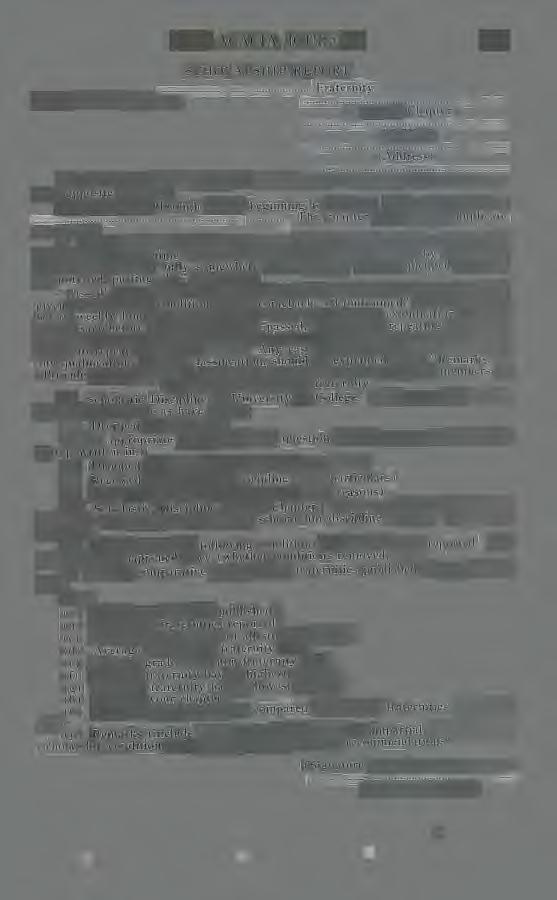
Fraternity.
( arne of Chapter)
(College)
(Add ress )
(If a wide sheet is used, print the above ners, opposite the title.)
Read this form through before beginning to fill out. Fill out and m a il to The chapter must keep a duplicate for its fi l es.
l. In the "Na me" column enter every student who has been a m e mb e r of the chapter at any time, however short, during period covered by this report and account for him fully somewhere in the report . Include pledged men not yet initiated, putting "Pl." after name "Passed" means the number of hour s per week for which the student has been given credit without condition or any comeback. "Conditioned" m ea ns th e number of weekly hours in a course as to wh i ch some further examination or work is necessary before the student will be "passed," but without rer.cating the course. "Fai led" means the number of weekly hours in a course which the student is required to repeat in order to "pass." Any case not falling into th ese class es, or any qualifications to such classification, sho uld be explained under " Remark s." (Provide eno ugh spaces in this section of the r.eport to take in the memb ers of the largest chapter in the fraternity.)
II. Scholastic Discipline by University or College. Give names and cla sses of such of the above as have been-
(a) Propped out of co llege
(Leave appropriate space after each question for the answer to be written or typewritten in.)
(b) Dropped into class below (give also new class).
(c) Received ot her forms of discipline (state particulars).
(d) Have left college for oth er reasons (g ive reasons).
III. Scholastic Discipline by the Chapter. Have any students been s ubjected by _ the chapter t o any special scho lar sh ip discipline or help? If so, who and what?
IV. In last report the following conditions and failures were reported. Report what has h appened s ince (w h ether co nditi ons remov e d, etc ).
V. Are the comparative grades of the fraternities published in your in s titution?
If so,
(a) When were they last published?
(b) Number of fraternities reported?
(c) Average grade (mark) of a ll students (men)?
(d) Ave ra ge grade of a ll fraternity men?
(e) Average grade of all non-frat e rnity men?
(f) Grade of fraternity having highest average?
(g) Grade of fraternity having low est average?
(h) Grade of your chapter? ,
(i) Rank of your chapter as compared with other fraternities (1st, 2nd, 'e tc.)?
(j) Remarks ( includ e here, among other things, an impartial revi ew of your scholarship condition as it appears to you , with any recommendations ).
(Signature of officer making report)
(His chapter office)
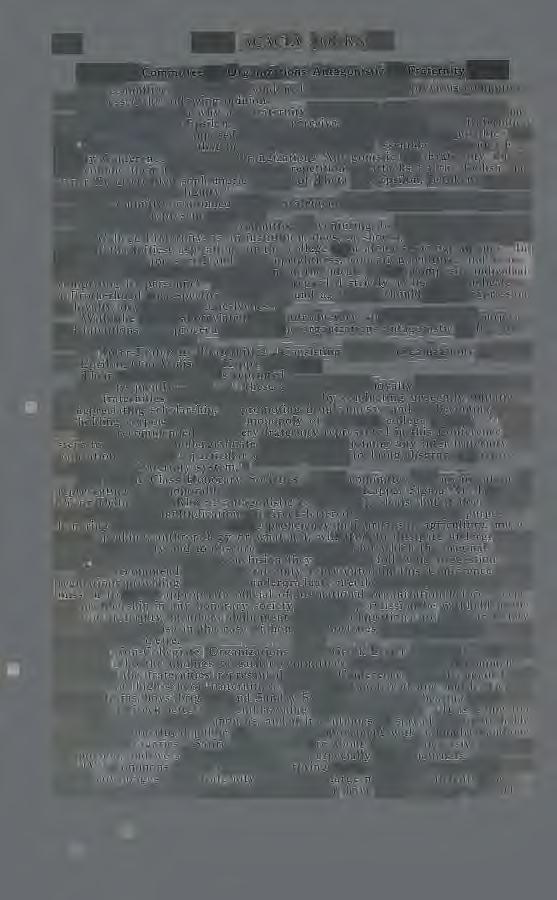
The committee at the outset condoned the action of the previous committees and expressed the following opinion:
"We see no reason why any fraternity should lift a ban which h as been imposed on Theta Nu Epsilon, and we perceive many reasons why fraterniti es which hav e not as yet imposed such a ban should do so as soou as possible. At the ·same time, we feel that now, for mature men to assemble in an Inter-Fraternity Conference to discuss Orangizations Antagonistic to Fraternity Ideals and confine their talk and action to a repetition of attacks on the foolish and generally discredited sophomoric society of Theta Nu Epsilon, betokens a waste of time and a loss of dignity."
The committee continued w ith a statement of the minimal id eals the fraternities should r epresent as follows:
"A nd in this sense your committee is venturing to affirm that the Greek Letter College Fraternity, as a n institution, does, or should, stand as the embodiment of the loftiest aspirations of th e co lle ge man along sociological lines In all that makes for soc ial and civic uprightness, education, culture, and r efi n ement, it is, or should be, a reflection of the ideals of the composite - individual comprising its personnel. It should b e regarded strictly as its name indicatesa Brotherhood,-irrespective of all else, and as such it should be the expression of loya lty, devotion , and cohesiveness."
With the above abbreviated brief introductory statement of their purposes and intentions they proceed to divide the organizations antagonistic to fraternity id ea ls into four classes .
I. Inter-Fraternity Fraternit ies. Consisting of such organizations as Theta Nu Epsilon, Quo Vadis and Kappa Beta Phi.
Th e ir comment in part is re printed:
"Too frequently * * * these societies divert lo yalty from the bona fide college fraternities and create grave scandal by conducting unseemly initiation s, by depreciating scho l arship, by promoting drunkenn esss , and by becoming a sort of 'ho ldin g corporation' for the monopoly of class and college offices ." * * •
"It is recommended that every fraternity represented in this Confer e nce t ake steps to prevent its undergraduate members from joining any inter-fr a ternity organization which in a particular college is likely to bring disgrace or reproach on the whole fraternity system ."
II. Upp e r Class Honorary Societies. Your committee has no intention of representing s uch honorabl e societies as Phi Beta Kappa , Sigma Xi, Tau Beta Pi, or Delta Sigma Rho as antagonistic to fraternity ideals, but it does belie ve that the further multiplication of Greek-lettered societies for the purpos e of h o noring students who show some proficiency in journalism, agriculture, music, public speaking, anthropology or what not , will tend to dissipate undergradu ate ene rgy and loyalty and to obscure the real purpose for which the original Gr eekletter soc ieties exist, and in conclusion th e y make th e following suggestion:
"vVe recommend that eac h fraternity r e presented in this Conference adopt regulations providing that every undergraduate member must obtain special permission from the appropriate offic ia l of his national organization before accept· in g membership in any honorary society, and that permission be withheld in the case of fraternity members delinquent in their obligations to th e ir fraternity chapter and likewis e in the case of honorary societies which appear to have no proper "ra ison d'etre."
III. Non-Collegiate Organizations with Gr e ek-L e tter Names. "We shall her e but ec ho the findings of earlier committees and repeat th eir recommend ati ons th at th e fraternities represented in this Conf e renc e legi s late again s t the nui sance of hi g h-school fratern iti es. There are non-academac musical clubs, a thletic teams , boys ' brigades and Sunday School classes , each bearing some combination of Greek lett e r s an d emblazoning some mystic badge. It is going too far. It is casting ridicule upon us, and if it continues to spread it is quite liable to cause th e uncritical public to confuse our movement with a hundr ed-and-one odd itie s and vaga ries . Satire and sarcasm are about the only defensive weapons we oossess, and we should use th e m fr ee l y, especially in our journals."
IV. Commons Clubs. "They may spring from a real desire to afford some of the advantages of the fraternity system to a l arge numb e r of students in a par· ticular co ll ege who for one reason or another have not 'made' a Greek-l etter
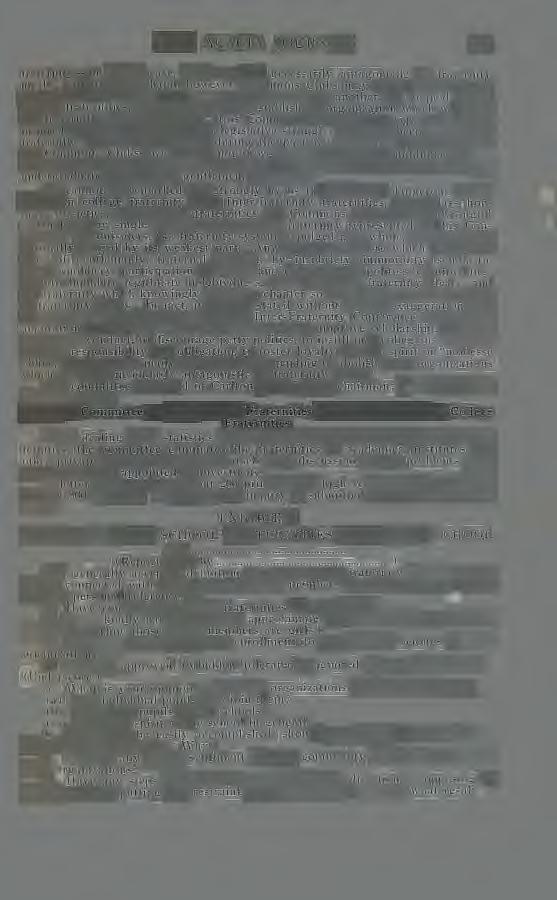
fraternity,-in which case, they are not necessarily antagonistic to fraternity ideals. On the other hand, however, Commons Clubs may sprmg from the endeavors of one or two men who, for one r easo n or another, are piqued at the regular fraternities, and are resolved to establish an organization which will fight the fraternities tooth and nail. It is Commons Clubs of this typ e which have inspired much of the rancor in tht> legislative struggles that hav e be e n waged over fraternities in the Midd l e West during the past few years. We cannot attack the Commons Clubs-we should not if we could; but we can minimiz e the effects of their attacks by seeing to it that our hou ses a re in order and th at our undergraduate brothers are gentlemen, not snobs."
"It cannot be remarked too strongly by us that far more dangerou!\ to the American college fraternity than Inter-fraternity fraternities, upper-cla ss honorary soc i eties, high school fraternities, or Commons Clubs, is the wrongful conduct of any sing le chapter of any single fraternity represent ed in this Conference. By outsiders, the fraternity-system is judged as a whole, a nd the whole is u s ually judged by its weakest part . Any chapter anywhere which breaks the rul es of gentleman ly, fraternal conduct, by insobriety, immora lity , sc hol ast ic laxity , snobbery, participation in 'che a p and dirty' college politics , or unwillingne s to liquidate l eg itim ate indebtedness, is a m e na ce to fraternity ideals; and the fraternity which knowingly permits a chapt e r so to behave is a grave menace to fraternity ideals In fact, it may be stated without f ea r of exaggeration that all the reports and a ll the acts of th e Int e r-Fraternity Conference since its inauguration in 1909, in so far as they have served to impr ove scholarship , to better morals and conduct, to discourage petty politics, to instill into collegian s a greater se nse of responsibility and obligation, to foster loyalty and the spirit of " n ob le sse oblige," have been so many reports and acts tending to abol ish thos e organizations which are most in sidious l y antagonistic to fraternity ideals."
The comm ittee consisted of Carlton J. H. Hayes, chairman; J. C. Griffin a nd Louis L. Moore
Report of Committee on High School Fraternities and Their Relation to College Fraternities
After d ea lin g with statist ics relative to the numb e r of High School Fraternities, the committee eliminates the fraternities in academies, institutes and other private schoo ls and confines its e lf to a discu ss ion of the problem s upon which they were appoin ted to investigate.
A lett e r was mailed to about 200 principals of high schoo l s, with an attendance of 500 or more. A copy of the inquiry is submitted with the answers r eceived:
REPORT oN HIGH FRATERNITIES FROM rtiGH SCHOOL AT .................... .... ................... .. .... ...
(Report fi ll ed by )
The generally accepted definition of a high school fraterni1y is "a ny organization co nnect e d with a high school who se members are chosen s olely on the basis of personal reference."
1. Have you a ny high school fraternities in your school?
2. 1f ,so, kindly name them with a pproxim a te date when each was sta rted . (N B. Underline those whose m e mbers are girls.)
3. What per cent of your total e nrollment do you es timate b e longs to these organizations?
4. Are they approved, forbidden , tolerated or ignored by your school board? (Un der sco re. )
5. vVhat is your opinion as to these organiz a tion s and their effect upon:
(a) The individual pupils who join th e m?
(b) The other pupils in the schools?
(c) Upon the spirit of th e school in general?
6. If it cou ld be easi l y acco mplished, should you prefer to see them excluded from your school? Why?
7. Is ther e a ny strong sentiment in your commtmity either for o r agai nst these organizations?
8. Have any steps b ee n taken a t any tim e in the direction of opposing or ousting them or putting any restraint upon th e m , and , if so, witn what result?
9. How many of your t eac h e r s ha ve been member s of som e college frat e rnity?
10. How many of th e s up e rvi s ing o ffic e r s of th e s ch o ol . h ave b e en memb ers of so m e college fraternity?
11. In th e op inion o f your teach e rs , if action were taken by college frat e rniti es r e fu s ing to admit to th e ir membership, after a specified date, any p e r sons who h ave join ed a high sc hool frat e rnity, would such act ion tend to eliminate or t o discourage high sc hool fraternities?
12 Wh a t is your own personal opinion on this last question?
13. Do y o u (or y o ur t ea cher s) fee l that such a step would be a good thing for high schools?
EXHIBIT C
SUM MA RY OF REPLIES TO A QUESTIONN•AIRE CONCERNING HIGH SCHOOL FRATERNITIES SENT TO THE HIGH SCHOOLS WIT H AN ENROLLMENT OF 500 OR MORE
High Citi es Sch ools
1. N umber of citi es t o which . qu es tionn a ir e was se nt .. .. ....................
2. Number of high schoo l s in vo lv ed ( e s timat e d ).................. ..
3 N umber of cities replying -- ---·---- 140
4. N umb er of high sc hool s involv e d.
5. Have frat e rnitie s -- - -
6. Have no fratern iti es n ow - -
7. Never had
8.
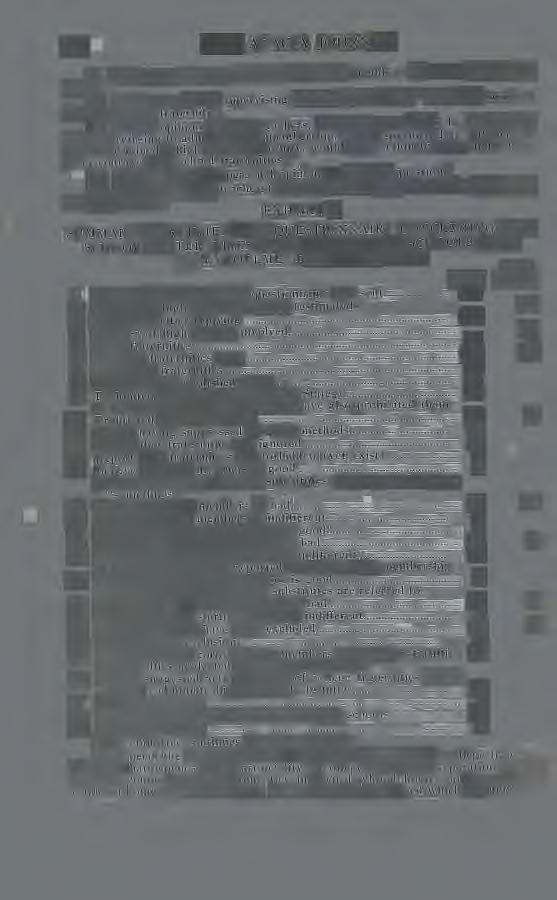
N. B. - At least thr ee oth e
epo rt o n thi s it e m.
26. Beli eve s u gges ted ac tion o n p a rt of co ll ege fraternitie s would t e nd t o e liminat e hi g h sc h oo l fraternities..... .... ........ ........ ........... 89
27. Do n o t so believe ·--- - - - ----···· 3
28. Be li eve suc h ac tion wo uld b e nefit the hi g h sc hool s.... .. .. .. ... ........... 84
29. Do not so believe - - --------------··········-
The co mmitt ee continues in part as follow s: . " The n eed, th e r e al n ee d which all of us b e lie ve in, for the coll ege fraternity IS a n e ed th a t depends on th e a rtificiality of college lif e and the se p a r a tion for four years of yo un g m e n from h o me ti es in their boyho o d h o m es and b efore th<'Y es tabli s h h ome ti es of their own. It is a d efi nite soc ial n ee d which th e uni ver ity
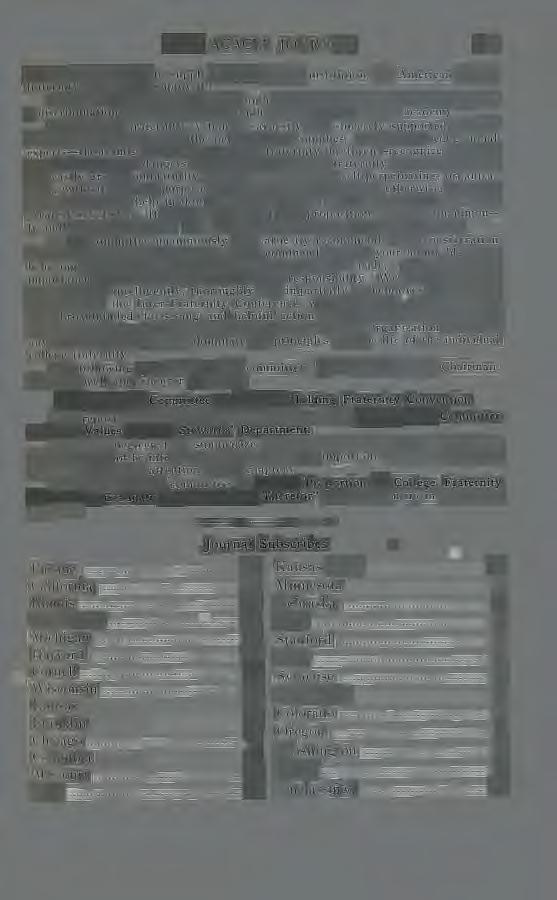
and the college failed to supply and that unique institution, the American college fraternity, grew up to supp l y it.
"There is no such need in public high school life, and here is the ground for a discrimination between the public high school and the private academy.
"The college fraternity system is earnestly and sincerely supported by educational experts because of the need which it supplies. These same educational experts-thousands of whom are your fraternity brethren-recognize the fact that all those same dangers l urk in the high school fraternity system, that there is a vast l y greater immaturity in these secret, boyish, self-perpetuating, organizations, without any real purpose that cannot better be secured otherwise, and they appeal to you for he l p in doing away with them. Your action would be of the greatest assistance. 1t could be no harm. The proposition is unanimously and hearti l y ca ll ed for. It is in your power and you can do great good.
"Your comm i ttee unan imous l y and earnestly recommends such consideration and further study of th is matte r as may commend itself to your honorable body, believing that you cannot afford to ignore it or push it aside, either as of minor importance or as outside of the field of your responsibility . We believe th a t such study, app li ed intelligently, thoroughly and impartial l y as behooves a body constituted as is th e Inter-Frat e rnity Conference, will l ea d either now or la t e r to uch broadminded, far-seeing and he l pfu l action as our report points to . The pure l y se l fish aim cannot safe l y control the actions of this orgar:ization of Greeks any more tha n it can safe l y dom i nate t h e princip les a n d the l ift of the individual college f r aternity."
The fo ll owing men acted on this committee: John Calvin Hanna, Chairman; Otis Caldwell and Spencer R Smith.
The Report of Committee on Time of Holding Fraterni ty Convention
This report is in the hands of e ach chapter, as is the Report of the Committee o n F ood Values and the Stewards ' Department.
We have neg l ected to summarize these reports because we feel that the alumni would not be interested . These reports are important, however , and should be given the closest attention of the chapters.
The report of the committee on " What Proportion of College Fratern ity Me n Fail to Graduate and the Reasons Therefor " w ill be taken up in the February issue.
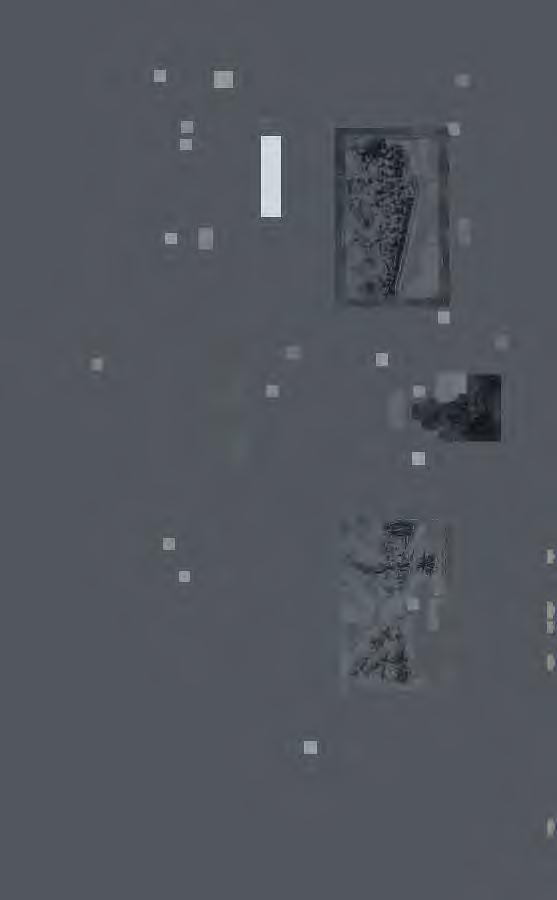
 HARRY E. KILMER
HARRY E. KILMER
Every college fraternity has among its members one or more individuals whose names stand out' prominently and whose interest in, and achievements for, the organization secure for them a place of honor on the fraternity's roll of fame. . ·
While Acacia must always honor those men whose vision led to the organization of the mother chapter and to the expansion which quickly followed, there is no doubt that the name which above all others is to stand out conspicuous in the hearts of the men of the future, as it has already found its place in the affections of the brothers of today, is that of Harry E. Kilmer.
W .hile by his own decision the fraternity is no longer have his services as its Grand Secretary, the things which he has done for the upbuilding of Acacia have been so notable as to deserve the highest praise . Something of the man himself and of his personal characteristics ought to find a permanent place in our official publication.
Brother Kilmer was born in Yorkshire, Harrison County , Iowa, January 31, 1879. He was made a Mason in Skidmore Lodge, No. 512, Skidmore, Mo., in 1901. He graduated from Warrensburg State Normal School in 1903 and that fall entered the University of Missouri. While at Columbia he became a member of the Columbia Chapter R. A. M., and St. Graal Commandery, K. T . He was a very active student in the University of Missouri, being a member of the debating team, editor of the Savatar and prominent in the work of the Y. M . C. A. He also was a member of the Phi Gamma Delta Fraternity, Q. E. B. H., the Senior Society Order of the Coif, president of the Independent Board and editor-in-chief of the Independent in 1908 In the law school he was a member and consul of Phi Delta Phi. All reports of his undergraduate life describe him as a hard working and unusually effective administrator who made a notable impression upon the university life of his period. He received his degree of Bachelor of Arts in 1905 , and along with it the election to membership in Phi Beta Kappa, and three years later the degrees of Master of Arts and Bachelor of Laws.
To win election to the Senior Honor Society, to win the coveted Phi Beta Kappa key, and in the law school to be selected for the honorary law fra'ternity, namely, the Order of the Coif, testifies to Brother Kilmer's steadfast devotion to the real work of his university car ee r.
When the Mem Chapter of Acacia was established at Missouri on May 17, 1907, Brother Kilmer was one of the charter members and became its first secretary . He was sent as the first representative from the chapter to the third grand Conclave held at Lawrence , Kansas, in 1907. In the third numb e r of the Acacia Journal, dated 1908, Brother Kilmer's picture appears in two places, once as a member of the Lawrence Conclave group, and again as a member of the Mem Chapter. Although the figure is more youthful than that now familiar to Acacians,
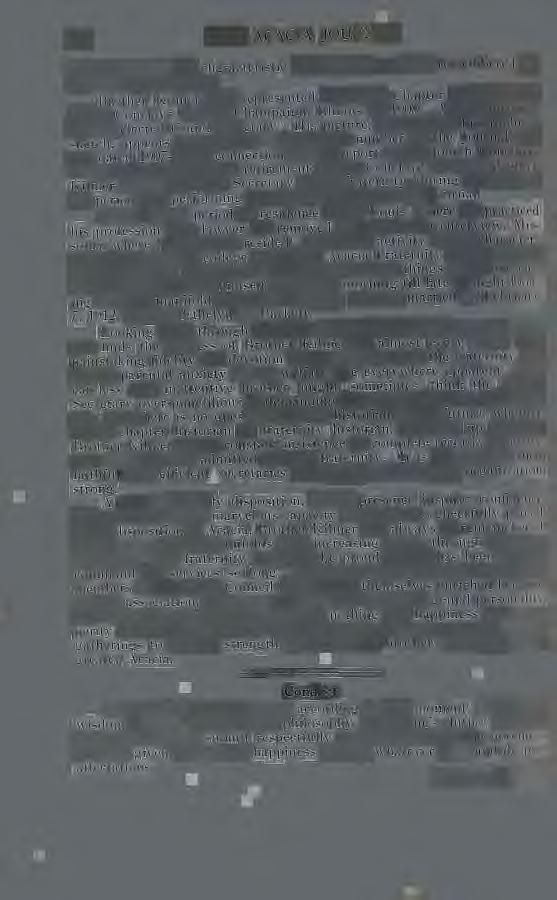
the face shows the characteristic lines which are well remembered by all who have met him.
Brother Kilmer also represented the Mem Chapter at the fourth Grand Conclave , held at Champaign, Illinois, in 1908. At this meeting he was elected Grand Secretary. His picture, with a brief sketch, appears on page 17 of the fourth number of the Journal , the one dated 1907-08, in connection with a report of the fourth Conclave. From that time until his retirement at the Conclave of 1916, Brother Kilmer served as Grand Secretary of the fraternity, during the mo t of the period also performing the duties of Editor of the J onrnal.
After a short period of residence in St. Louis, where he practiced his profession as a la wyer , he removed to a farm at Centerview, Missouri , where he has since resided. The same activity which characterized all his work in co ll ege and in the Acacia Fraternity marks his labors as a farmer. He is not of the type who leave things to the mercie of hired help, but toils himself from early morning till late at night looking after the manifold details of his place. He was married on February 7, 1912, to Miss Ethelyn C. Baskett.
Looking back through the files of the Journal from year to y ear, one finds the impre ss of Brother Kilmer on almost every page. Hi painstaking fidelity, his devotion to the lofty ideals of the fraternity , his almost parenta l anxiety for its welfare, are everywhere apparent. The careless and inattentive brother might sometimes think the Gr a nd Secretary over-punctilious in demanding full details in this or that matter. But there is no question that the historian of the future, whether he be chapter historian or fraternity hist orian, will rise up to bless Brother Kilmer for his constant insistence on complete records for every man wh o has been admitted into the fraternity. It is the work of s uch faithful and efficient secretaries that helps to make any organizati o n strong.
A man of friendly disposition, whose presence inspires confiden ce and trust and whose marvelous capacity for work was cheerfully pla ce d at the disposition of Acacia , Brother Kilmer will always be rememeb ered as the story of Acacia unfolds with increasing power through the coming years. The fraternity may we ll be proud that it has been able t o command his services so long. Those who have served with him as members of the Grand Council have all felt themselves enriched becau e of such association , and every one who has known his genia l person a li ty will echo the h o pe that he may have nothing but happiness and properity in his life and that fr o m time to time he may appear at Aca cia gatherings to add his strength to that of the brothers who plan fo r a great e r Acacia
To act with common sense , according to the moment , is the b es t w i dom I kn o w; and the best philosophy , to do one ' s duties , take th e world a s it comes, s ubmit respectfully to one's lot , bless the goodn ess that ha s g iv en us so much happiness with it , whatever it is and d es p ise aff e ctation s. '
-Hom ce W alpole.
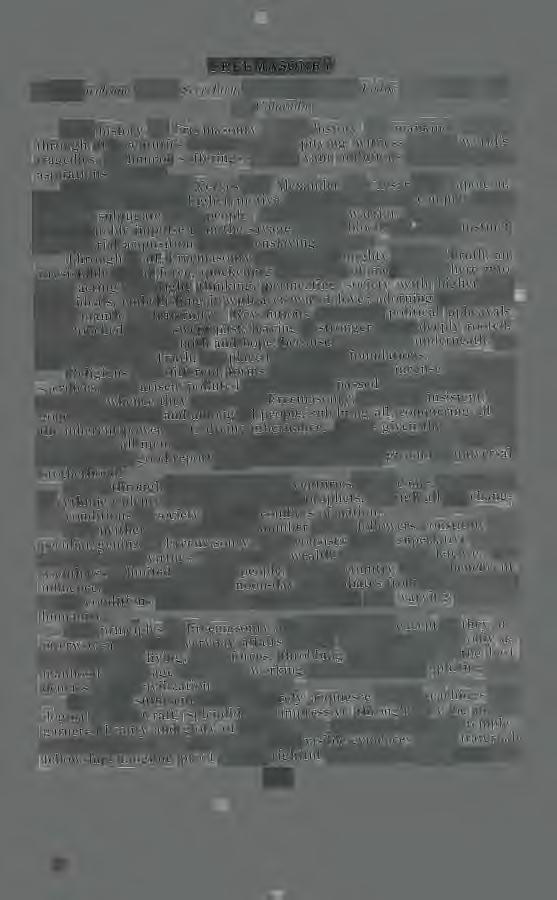
The M. W. Grand Lodge of A . F. & A. M. of Colorado
The history of Freemasonry is the history of mankind. Down through the centuries it has come, a pitying witne s of the world's tragedies, of human sufferings, of the vain ambitions and the elfi h aspirations of men.
The vast armies of Xerxes and Alexander, of Cae ar and Napoleon, had back of them no higher motive than the desire to conquer other lands, to subj u gate other people. Those great warriors were moved by no more noble impulse than the savage lust for blood, the selfi h instinct of territorial acquisition and the ens la ving of men.
Through it all, Freemasonry has flowed a mighty river of Truth, an irresistable moral force, quickening the hearts of men everywhere into right act in g and right thinking, permeating society with higher and truer ideals, embellishing it with a crown of love; adorning it with the white mantle of fraternity. Revolutions, wa r s and pol iti cal upheavals have touched it and swept past, leaving it stronger, more deeply r ooted, more full of Life and faith and hope, because away down underneath , on the so li d rock of Truth, are placed its eterna l foundation s .
Religions and different forms of faith, with the incense of human sacrifices, have arisen, polluted the earth and passed away into the darkness from whence they came . B ut Freemasonry, vir il e and in s istent. has gone into a ll l ands and among all people, subduing a ll , conquering all by the inherent power of it s divine inheritance. It has given the world one place w her e a ll men, the rich and the poor, the high and the low; all who are true and of good report may meet on the common ground of univer al brotherhood .
Down through the si l ent march of centuries it has come, step to step in rythmic cadence with the l aw and the prophets, through all the changing cond iti ons of society and th e conflicts of nations.
But neither its age nor the num ber of it s followers constitute the pecul iar genius of Freemasonry; that consists in the superlative power and force of its virtues; these are its wea lth , its towers of defense. Its usefu ln ess is limited to no o ne people, place or country, but its beneficent infl u ence, lik e the light of the noon-day s un , radiates from its great heart to all co nditi ons and races of men and to all the varying needs of humanity.
T h e principles of Freemason r y are of little worth except as they are interwoven into the everyday affairs of life. They are of value o nl y as they a r e made li ving, vita l forces, throbbing in the blood of the best manhood of the age a n d made working factors in all the upliftin g tendencies of the civilization of our day.
It is not sufficient that we merely acquiesce in the teachings and dogma of the Craft, splendid and impressive throu g h they be in the garnered beauty a nd g lory of the far past. From our hall s and t emples we must take otrt int o the world of men v i sible evidences of our fraternal fellowsh i p, tangible proof of our ri ghtfu l claims to be good men and 161
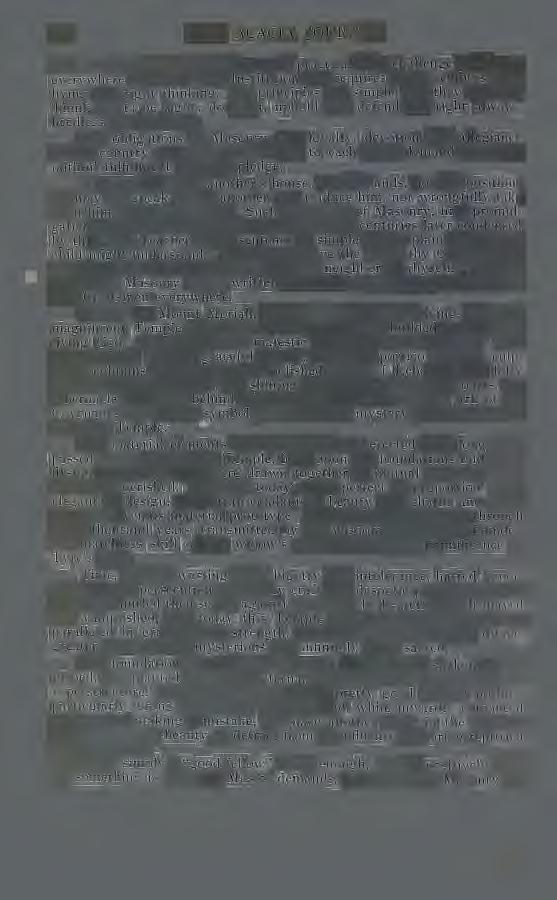
true; we must throw into the arena of practical life a challenge to all men everywhere that ours is the Institution that requires of its members right living and right thinking. Its principles are simple, but are real. Think right; be right; do right, uphold and defend the nght always, heedless of the result.
Our obligations to Masonry, our loyalty, devotion and allegiance to our country; our duty to God and to each other demand of us the faithfu l fulfillment of every pledge .
We may not covet another's house, nor his lands, nor his position; we may not speak evil of another, nor traduce him, nor wrongfully take from him that which is his. Such is the law of Masonry, first promulgated from Sinai on tablets of stone and fifteen centuries lat er condensed by the Great Teacher into a sentence so simple and so plain that a little child might understand: "Thou shalt love the Lord, thy God, with all thy heart and with all thy soul, and thy neighbor as thyself." Such is the law of Masonry today, written in letters of gold upon the hearts of true Craftsmen everywhere.
Yonder, on Mount Moriah, in the city of the Great King, the most magnificent Temple the world has ever seen was builded to the everliving God. How bold, how majestic it stands under the clear , blue Judean skies. See the graceful arches; the broad portico and the sculptured columns; the carved and polished cedar of Lebanon; the lofty towers; the beaten brass; the shining roof of pure gold; th<;! courts, the tabernacle; the veils behind which stands the altar and the Ark of the Covenant; how rich in symbol; how veiled in mystery; how sacred was the First Temple.
The material elements ou t of which it was erected have long since passed away, but the real Temple, built upon the foundations laid when first the hearts of men were drawn together in mutual love and tru st, has never perished. It exists today, more perfect in proportion, more elegant in design, more transcendant in beauty and charm and grace than was ever its material prototype. It has come down to us through three thousand years, transmitted by the wisdom of its royal founder , the matchless skill ·of the widow's son and the royal munificence of Tyre's king.
Time, with its wasting hand, bigotry and intolerance, hatred , ignorance and the persecution of priestly craft and despotic power have time after time hurled themselves against it, ever to be beaten back disma yed and vanquished, and today this Temple stands before the world unparalleled in grandeur, in strength , in moral worth and truth divine, greater far and more mysterious and infinitely more sacred .
The foundation of our Craft is secure. It cannot be shaken or disturbed, it is planted deep in the eternal heart of truth and right: but th e supe_rstructure. How often: "Oh, he's a pretty good fellow; nothin g particularly wrong about him ," is heard and, while inwardly convinced that we are making a mistake, we place another stone in the walls to mar aJ?-d sully its beauty , to detract from its influence and bring reproach upon Its name.
To be a "good fellow" is not enough. To be positively good for somethmg IS what the Master demands, and it is what Masonry de -
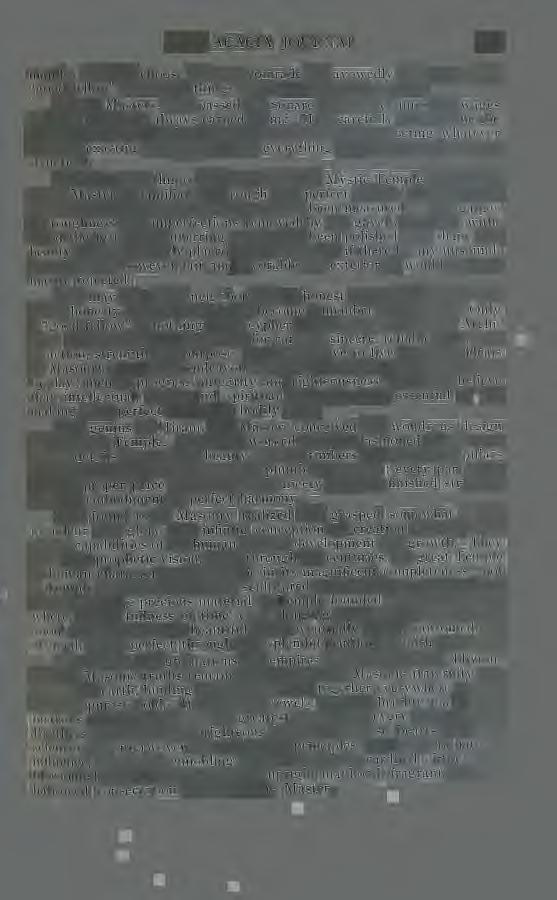
mands. As well choose for your comrade the avowedly evil man a the "good fellow" who is all things to all men and true to none.
We, as Masters, have passed the Square and ha ve claimed ou r wages a such. Have we always earned them? How carefully we examine the brick and stone and timber of the hous e we build rejecting w h atever is unfit, exacting the very best of everything that enter int o it co nstruct ion.
There a r e two things that enter into this Mystic Temp l e with which every Master is familiar; the rough and perfect ashlar. If the o ne be sound and true at heart, then, after it has been mea s ur ed by the rra u ge, its roughness and imperfections removed by the gavel and it ha s withstood the test of the unerring St[Uare and been polished into s hape and beauty; it may be safely placed in the walls; but if there be a n y unsoundness at heart, however fair and favorable the exterior, it would be summarily rejected.
One may be a good neighbor and an honest man , as the world considers honesty, and still be unfit to become a member of the Craft. Only a "good fellow" is nothing but a cypher in the eyes of the Great Arc hitect. His plans as laid down call for earnest, sincere, reliable men; m en of action, strength and purpose; men who strive to li ve up to the ideal s of Masonry; men who endeavor to make the world a littl e better day by day; men of progress, integrity and righteousness; men who believe that intell ectua l, moral and spiritual - food are more essentia l to the making of a perfect man than bodily food.
The genius of Hiram , the Master, conceived the wondr o us d es ign of the First Temple. His mind worked out and fashioned all its marve lous details of grace and beauty. All its timbers and stones and pillars had been tried and tested by le vel, plumb and square; every part fitted into its proper place with such exact nicety that the finished structure was the embodiment of perfect harmony.
The founders of Masonry realized and grasped somewhat of the grandeur and glory, the infinite conception of creation and the marvelous capabilities of the human soul for development and growth. They saw, wit h prophetic vision, down through the centuries , the great Temple of human character as it would be in its magnificent completeness-not a Temple of carved stone and sculptured marble but one built of far better and more precious material; a Temple found e d upon Truth itself , where, in the fullness of time, every lon g in g heart in the quest of the good, the true and the beautiful s hall evei1tually come; ransomed, redeemed, made perfect through the splendid fruition of faith and h ope.
Years come and go; nations and emp ir es arise and sink into oblivion; but the Masonic truths remain and the chain of Masonic fraternity embraces the earth, binding the he arts of men together everywhere as with links of purest go ld . It has many jewels , but the brighte t and most lustrous, the ones that give the greatest glory to its every part are tho se Brothers w ho live pure, righteous lives, into whose hearts and consciences are interwoven its truths and principles; men who radiate an influence, swee t and ennobling; men in whom it cardinal virtues have blossomed into the white flower of upright manhood , fragrant with the hallowed consecration of the Divine Master.
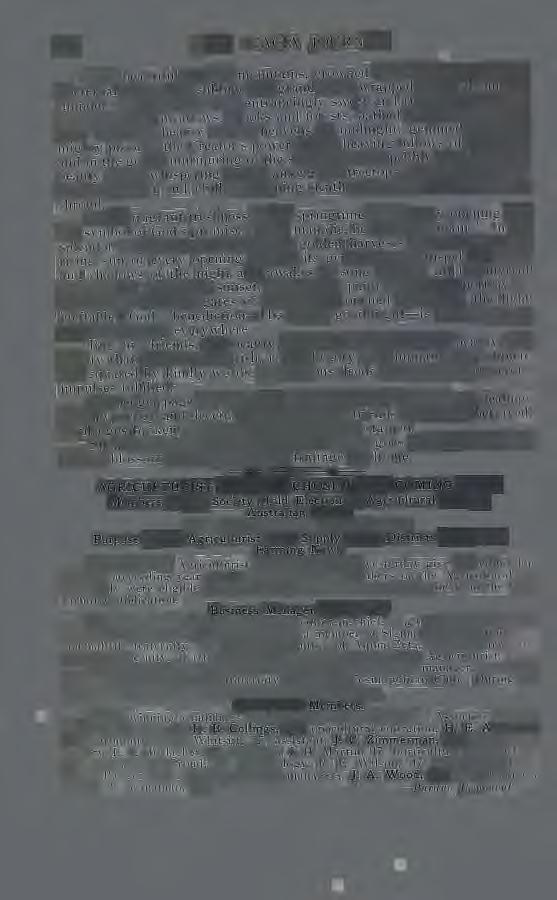
How beautiful are the mountains, crowned with their pure mantle of eternal snow; how sublime and grand when wrapped in the gloom and thunders of the storm; how entrancingly swee t and restful are the valleys, with their meadows, brooks and forests, bathed in the g l ory of the sun. There is beauty in the heavens at midnight, gemmed with the mighty proof of the Creator's power, in the heaving billows of the ocean and in the gentle murmuring of the stream over its pebbly bed. There is beauty in the wh ispering breeze among the treetops; and in the winter, when the frost and chill of seeming death cover the earth as with a shroud
In the fragrant freshness of the springtime when every opening bud is a symbol of God's promise: "If a man die, he sha ll live again." In the splendor of the summer and in the golden harvests of autumn; in the rising sun of every opening day, as its generous rays dispel the mists and shadows of the ni gh t and awakes to song and j oy all the myriad forms of life; and in the sunset, o h , who can paint it, who can portray it? It must be that the gates of heaven are opened then, that the light ineffable-God ' s benediction-His sweet good-night-is sent tQ weary men and women everywhere .
But, my friends, the beauty which is above all o ther beauty; the beauty that shall never perish, i s the beauty of a human lif e, complete and squared by kindly words, by virtuous deeds well done, by generous impulses fulfilled.
The led ger page of such a lif e is clean and fair, it shows no dealing with hypocrisy and deceit, no debit there of friends and trusts betrayed, of pledges broken, of virtue soiled and honor stained.
S u ch a life , with love and faith and trust, goes hand in hand with God to blossom and to ripen into a fruitage all divine .
Members of Ag. Society Hold Election in Agricultural Hall by Australian Ballot
D. M. EVANS WILL EDIT PAPER
Purpose of the Agriculturist is to Supply Rural Districts With Live Farming News
Returns of the Agriculturist staff e l ection held yesterday give the editorship for the succeeding year to D. M. Evans, '17. Members of the Agricultural society only were e li gible to vote for the scribes who will serve next on the lo cal farming publication.
Business Manager and Editor.
D. M . Evans, ' 17, the newly · elected editor-in-chi e f, is a member of th e K e ntucky State chapter of Phi Kappa Alpha , a member of Sigma Delta Chi honorary journalistic fraternity. He is a l so a member of A lph a Zeta, the a g ricultural fraternity. Last year he was assistant editor of the Agriculturi s t D . D. Ball , '17 , who was elected to the office of business manager, is a member of the Delta Tau Delta fraternity and of the Cosmopolitan Club. During the past year he h as served as assistant business manager: Other Staff Members.
Other winn in g candidates for the staff are as follows: Associate editor s, V. }. Banter, '18, a nd H. B. Collings, '18; agricultural education H. E. Ackerson , '17; agronomy, E L. \Vhitsitt, '17 ; assistant, J, C. Zimmerman: '18; animal husL. }. Horlacher, '17 ; assistant, }. H Martin , ' 17 ; horticulture, V. V. Clark, '17 ; datry , M. }. Proud, '17; entomology, R. E. Wilson , '17 ; alumni and local , D. C. Badger, ' 19; as s istant business managers , ]. A . Wood , '18, C. S. Collin gs , ' 18, G. A. Branaman, '18. -Purdu e Expon ent
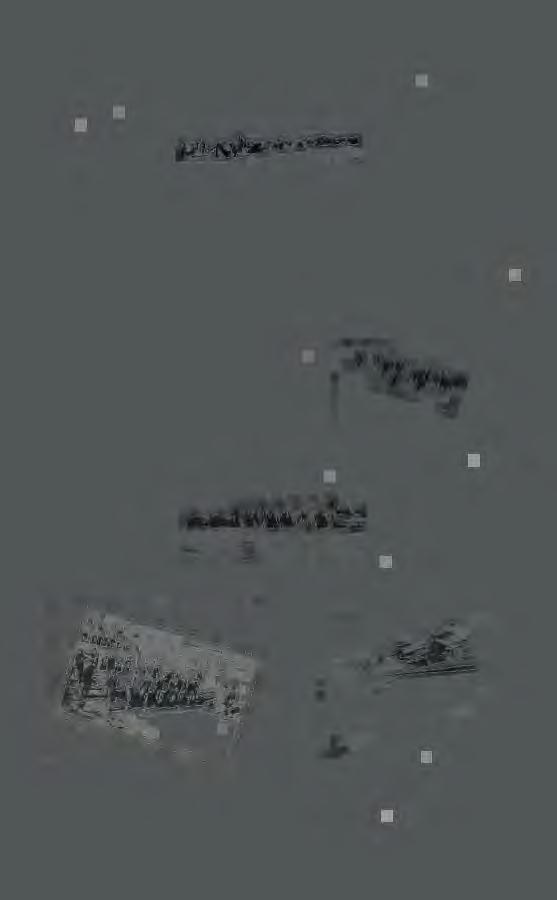

Although we are accustomed and have been accustomed throughout the lif e of each o ne of us who are at present attending the universitie s of this country to hearing of and participating in initiations , yet I doubt very much if many of the brethren in Acacia have ever stopped to consider the origin and significance of the word.
Among all the nations of antiquity in which refinement and culture had g ive n an elevated tone to the religious sentiment there existed tw o systems of worship, a public one and a private one. Warburton, in hi s "D ivin e Legation of Moses," states that "Each of these Pagan Gods h ad a secret w orship paid unto him, to which none were admitted but those who had been selected by preparatory ceremonies called INITIATION. This secret worship was called the MYSTERIES."
The public worship at this time was founded on the superstitious polytheism whose numerous Gods and Goddesses were more or le ss debased in character. No incentives to virtue could be derived fr om them and the y served as no types of moral example. Plautus and Euripides and other Greek and Roman dramatists defended their heroe s and heroines by saying that the Gods were permitted such licen ses, therefore w hy should not a mere mortal be allowed the same. Thus the v icious example of the Gods became a stumbling block to mo r tal s at this time .
A future life full of compensation for the ills endured while up on th e earth constituted no part of the ancient idea. We had , it is true, visions of an El y sium and a Tartarus given us by the poets , but in ge n e ral the belief was manifest that man returned after death to the primordial elements of wh ich he was composed.
Yet as each of the ancient nations advanced in refinement a nd in int ellectual culture the priests , poets and philosophers aspired to a hi g her m a nifest a ti o n o f thou g ht in this respect and cherished the lon g in g for a ' doctrine which should in culcate the doctrine of an immortality, n o t to be spe nt in inert forms of existence, but in perpetual enjoyment as some com p ensa tion fo r the present ills.
The neces s ary result of the growth of such pure and elevat e d n otions must h ave been contempt for th e absurdities of p o ly th e ism as th e n practiced. B ut as this was th e popular religion it was easily seen that it was impolitic to attempt ope nly to overthrow it. Whenever any r e li gion, w h et h er it be true or false, becom es the religi o n of a ny praticular people , w h oeve r attempts in any way to overthrow it is s ure t o be denounc ed by popular fa nati c is m and punished by popul a r into leranc e.
Therefore these new r e li g ious truths were taught only in secret societies , admission to w hich was obta ined only throu g h the painful ordeal of I N ITI AT ION , a nd the various doctrines were concealed und er the
EDITOB. NOTE: This is the first of a series of three articles well worth the study of every Aca.cia.n, a nd we want you to ta.ke a.d"va.nta.ge of the opportunity td avail yourself of the knowledge resluting from yea.rs of study on the part of the author

veil of symbols whose true meaning only the initiated could understand. The truth was concealed in allegories, metaphors, tropes, figures and signs.
The various countries had their respective mysteries. In Egypt we bad those of Osiris and Isis; in Greece they celebrated , at Eleusis, the mysteries of Demeter; in Samothrace those of the Cabiri; and in Persia we find them celebrating those of Mithras even after the advent of Christianity and the ensuing overthrow of polytheism.
These mysteries, although they differed in name and the various details of preliminary ceremony, were very much alike in teachings and ideals and in the doctrines which they taught. Warburton , in his book says, "Their end as well as nature was to teach the doctrine of the future state to all." Alger says, "The implications of the indirect evidence, the leanings and guidance of all the incidental clues now left us as t o the real aim and purpose of the mysteries; combine to show us that their chief teaching was a doctrine of future life in which there should be rewards and punishments." Pindar says, "Happy the man who descends beneath the hollow earth having beheld these mysteries. He knows the end, he knows the Divine origin of life."
The various mysteries were all dramatic in their ceremonies; they all exhibited in a series of scenic representations the life of some god or popular hero; the attacks made upon him by his enemies; his death at their hands; his descent into Hades or the grave, and his final apotheosis as a God.
The only respect in which these mysteries differed was in their selection of a particular character as the main actor in the portrayal of life's drama. In the mysteries of the Cabiri, Atys, the lover of Cybele is slain and restored; in Egypt we have Osiris taking the principle part, etc.
As the mysteries were a secret society, the members of wh ich were separated from the rest of the populace by INITIATION, there resulted from this secrecy a solemn obligation of loyalty and certain modes of recognition which were known only to those who had passed beyond the neophyte stage.
The mysteries were divided into two classes called the less e r and greater mysteries. The first step was called the Lustration or purification by water. When the neophyte was ready to be received into any of the ancient orders, he was taken to a temple or any other appropriate place and there given a thorough cleansing with water. This was a preparatory step to the lesser mysteries , and signified the purification of heart that was necessary before proceeding further with the ceremony.
The next step in the ceremonies of the ancients was called the Initiation. Here it was that we have the dramatic allegory performed and the myth on which the mystery was founded developed The candidate personified the supposed events of the life, the sufferings and the death of the particular God or hero to which the mystery was dedicated. These ceremonies were a symbolic instruction in th e initia-the beginnings-of that system w hi ch it was the object of the mysteries to teach.
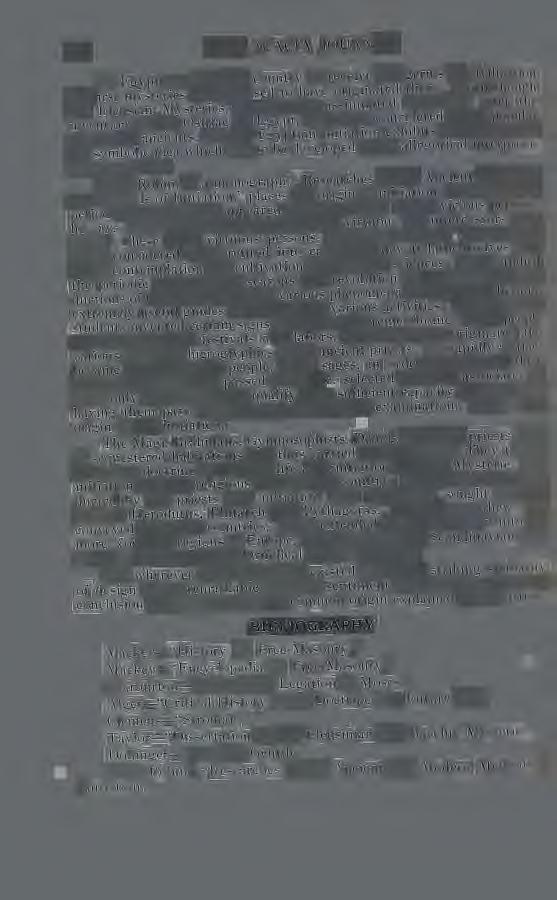
As Egypt was the first country to receive the germs of civilization the first mysteries are supposed to have originated there. Even though the Eleusian Mysteries, which were assimilated in Greece . after the invention of the Osiriac in Egypt, and were considered more popular among the ancients, still the Egyptian initiation exhibits trace of the symbolic idea which was to be developed in the allegoncal mterpretation of its idea.
Abbe Robin, in a monograph, "Researches in the Ancient and Modern Methods of Initiation, " places the origin of initiations at that remote period when crime first appeared upon the earth. These vic ious per ons, he says, were forced to seek :tmong the virtuous for intercessors with deity. These more virtuous persons, in order to escape contact with those considered unfit, retired int o caves and devoted themselves to a life of contemplation and cultivation of the useful sciences. They studied the periodic return of the seasons, the revolution of the stars, the productions of the earth and all the various phenomena of nature and became extreme ly useful guides to men in their various activities. These recluse students invent ed certain signs to recall to the remembrance of the people the times of their festivals and labors, and thus were originated the various signs and hieroglyphics of the ancient priests. As rapidly as they became l eaders of the people, these sages, in o rd er to carry on their l abors after th ey had passed from life , selected as their associates in work only those who could qualify as to sufficient capacity and merit, by having th em pass s trict courses of trial and examination. This is the origin of the initiation.
The Magi, Brahmans, Gymnosophists, Driuds and other priests lived in sequestered habitations and thus carried on their work. They taught the secret doctrine of a future lif e and initiati on into the Mysteries wa initiation into the religious rites of that country. These rites were condticted by the priests and initiation into them was sought by men such as Herodutus, Plutarch and Pythagoras. In this way they were conveyed into other countries. They extended after a time even into the more Nort hern regions of Europe, where we have the Scandinavian rites of the Norsemen and the Druidical rites of the Gaul.
But whe rever thes·e rites have existed we find a striking similarity of design and a remarkable unity of sentiment which forces us to the conclusion that they were of the common or igin explained in thi s article
Mackey-"History of Free-Masonry."
Mackey-"Encyclopedia of Free -Ma sonry."
Warburton-"The Divine Legation of Moses."
Alger- "Critical History of the Doctrine of a Future Life."
Clemens-" Stromat."
Taylor-"Dissertation on the Eleusinian and Bacchic Mysteries " Dollinger-" Jew and Gentile."
Abbe Robin-" Researches in the Ancient and Modern Method of Initiation. "
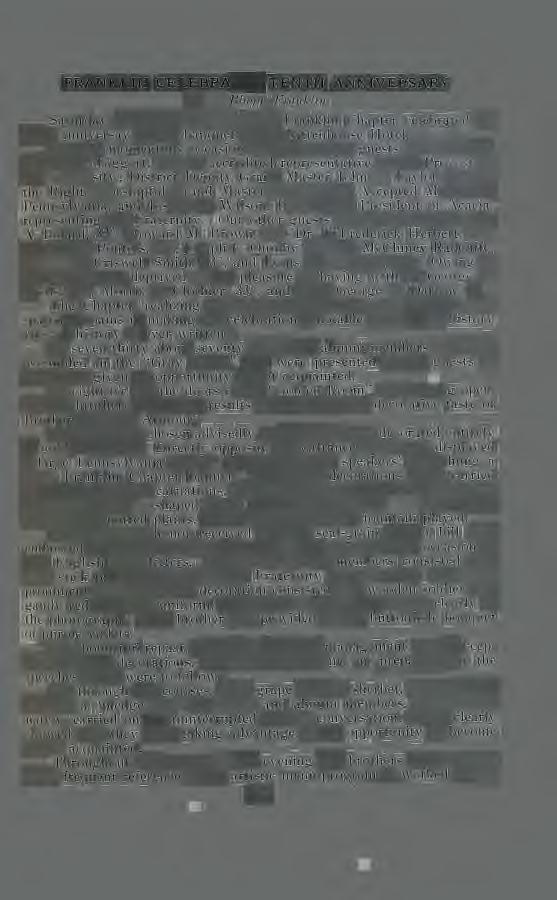
H. A . Blogg,
FmnlclinSaturday, the sixth of May, 1916, Franklin Chapter celebnHed its tenth anniversay with a banquet at the Rittenhouse Hotel.
On this momentous occasion we had as our gue ts of honor Dr. '.Valter T. Taggart, 33°, a accredited representative of the Provo t of the 'nivers it y; District Deputy Grand Master John C. Taylor , 33 ° for the Right Worshipful Grand Master of Free and Accepted Masons in Pennsylvania, and Joseph R. Wilson, Past Grand President of Acacia, representing the Fraternity. Our other guests of honor were Dr. John A. Bolard, 33°, Howard M. Brown, 33 ° , Dr. J. Frederick Herbert , 33 ° , Dr. Paul J. Pontius, 33°, Joseph E. Quinby, 33 ° , Dr. McCluney Radcliffe, 33 °, A. G. Criswell Smith , 33° , and Louis M. Wagner , 33 ° Owing to illnes we were deprived of the pleasure of having with us George B Well , 33 ° , Morris L. Clothier, 33°, and Hon. George P. Darrow , 33 ° .
The Chapter, realizing that they could be ten years old but once , spared no pains in making the celebration a notable event in its history (if said history is ever written).
At seven-thirty about seventy active and alumni members of Acacia as emb led in the "Gra y Room" and were presented to the guests of honor and given an opportunity to get acquainted.
At eight o'clock the doors of the "Go ld en Room " were swung 9pen, and the brothers beheld the results of the labors and decorative taste of Brother J. Lester Armour.
The room was chosen advisedly, as the wa lls were decorated entirely in gold and black. Directly opposite the ent rance doors was displayed a large Pennsylvania banner , and back of the speakers' table hung a large Franklin Chapter banner. The table decorations were carried out in red and white carnations, and a broad strip of black and go ld down the center of the U-s hap ed table. In the center of the "U" was a bank of ferns and potted plants, in the midst of which a fountain played.
Each guest of honor received a black sea l- grain leather bill fold, embossed on the inside with the name of the guest and the occasion in Old English gold letters. The favor for the members consisted of a gold st ick pin in the form of the Fraternity coat of arms. The most prominent favor and table decoration consisted of a wooden so ldi er in a gaudy red and blue uniform , the details of which are shown clearly in the photograph. Each brother was provided w ith a buttonhole bouquet of purple violets.
The bountiful repast, a credit to the hotel management , was in keeping w ith the decorations, and we lost no time in preparing for the speeches which were to follow.
A ll through the courses , from grape fruit to sherbet , served in the form of a "p l edge pin ," the active and a lumni members, seated alternately, carried on an uninterrupted flow of conversation, which clearly showed that they were taking advantage of the opportunity to become better acquainted.
Throughout the course of the evening the brothers were seen to make frequent reference to the artistic menu-program as worked out by 169
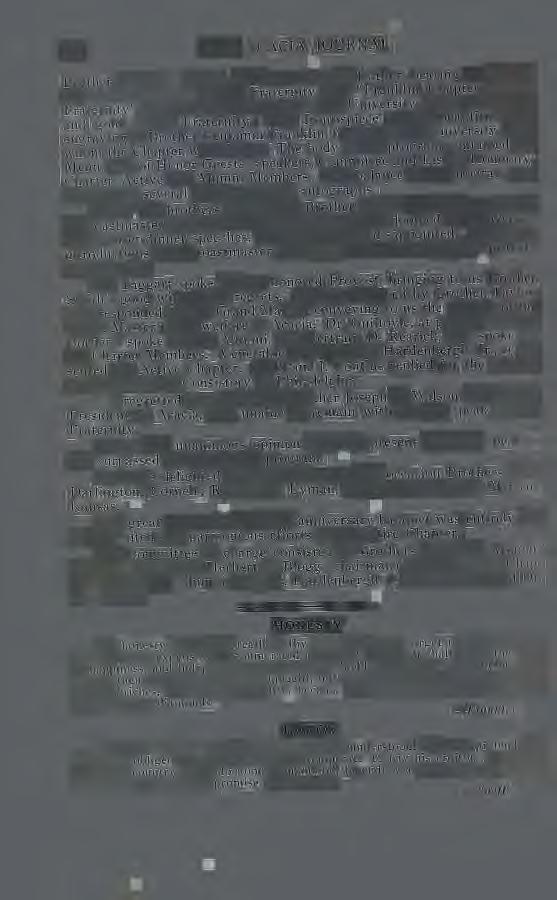
Brother Ernest C. Drew. The cover was of leather, bearing on its face the "coat of arms" of the Fraternity and "Franklin Chapter, Acacia Fraternity"; and on the back the seal of the University, done in the black and gold of the Fraternity. The frontispiece was a beautiful steel engraving of Brother Benjamin Franklin, founder of the University, after whom the Chapt er was named. The bod y of the program contained the Menu, List of Honor Guests, Speakers, Committee and List of Honorary, Charter, Active and Alumni Members. The balance of the program was made up of several blank pages for autographs.
When the brothers found that Brother Lewis H. Kirk was to be the toastmaster they knew that they would not be doomed to the average run of after-dinner speeches, and we were not disappointed. The witty introductions of the toastmaster were ably taken care of by the speakers in their turn.
Dr. Taggart spoke for our honored Provost, bringing to us Brother Smith's good wishes and regrets. He was followed by Brother Taylor, who responded for the Grand Master, conveying to us the interest of the Grand Master in the welfare of Acacia. Dr. Guilfoyle, at present "On the Border," spoke for the Alumn i, and Bertram D Rearick, 33°, spoke for the Char ter Members. Venerable Dean John G. Hardenbergh, Jr., represented the Active Chapter . Dr. Paul J. Pontius replied for the Masons of the 33° of the Consistory of Philadelphia.
'We re gretted very much that Brother Joseph R. Wilson, Past Grand President of Acacia, was unable to remain with us and speak for the Fraternity.
It was the unanimous opinion of those present that the speakers had surpassed the rest of the program. ·
We were delighted to have with us on this occasion Brothers C. C. Darlington, Cornell; Robert W. Lyman, Yale, and Bruce W. Merwin, Kansas. ·
The great success of the tenth anniversary banquet was entir ely due to the united and harmonious efforts of the entire Chapter.
The committee in charge consisted of Brothers J. Lester Armour, Ernest C. Drew and Herbert A. Blogg ( chairm .an), for the Active Chapter; and for the Alumni Dr. J. B. Hardenbergh, John W. Heins and Dr. P. S. Stout.
Let honesty be as the breath of thy soul, and never forget to have a penny, when all they expenses are enumerated and paid; then thou shall reach the point of happiness , and independence shall be thy shield and buckler , they helmet and crown; then shall they soul walk upright, nor stoop to the si lk en wretch because he hath riches, nor pocket an abuse, because the hand which offers it wear a ring set with diamonds . -Franklin.
No man ?f hon.or, as that word is usually understood, did ever pretend that his hon<;>r obliged him to be chaste and temperate, to pay his crditors, to be useful to his country, or to do good to mankind, to endeavor to be wise or learned , to regard his word, his promise, or his oath. -Swift.

Brother William R. Lazenby was born in Bellona, Yates county, New York, Dec. 5, 1850. He graduated from Cornell university in 1874 with the degree of Bachelor of Agriculture. He has since received the degrees of Master of Agriculture from the Iowa State College, and Bachelor of Forestry and Forest Engineer from the Baltimore Forest School, the first school of forestry established in the United States. From 1874 to 1878 he was instructor in horticulture and botany at Cornell, and served as assistant professor in the same institution from 1878 to 1881.
He came to the Ohio State University in 1881; he was first appointed as professor of botany and horticulture, then horticulture and forestry, and is now head of the department of forestry.
During his long connection with the Ohio State University he has held the following positions: Founder and first director of the Ohio experiment station, a position he held for five years. He was a collaborator of the United States Bureau of Forestry for four years, secreta ry of the Ohio Medical University from 1902 to 1914, and secretary of the College of Agriculture of the Ohio State University from 1896 to 1906.
In years of service he is the oldest teacher of horticulture in the country, having devoted his whole active public life to the teaching of horticulture, botany and forestry.
He has spent one year and several summer vacations in studying horticulture and forestry in Europe. He is a fellow and past vice president of the American Association for the Advancement of Science; one of the founders and ex-president of the Ohio Academy of Science; lif e member and vice president of the American Pomological Association; life member of the American Forestry Society; expresident of the Ame rican Associ"ation for the Advancement of Agricultural Science; member of the Society for Horticultura l Science; life member and past vice president of the Ohio State Horticultural Society; president for ten years of the Ohio State Forestry Society; life member and president for twenty years of the Columbus Horticultural Society; an honorary member of the Columbus Country Club, member of the Mystic Shrine and Acacia, Alpha Zeta, Delta Theta Sigma and Alhpa Pi Epsilon college fraternities. Is a member of the Honorary Scientific Society of Sigma Xi, receiving this honor from Cornell University, as well as from the Ohio State University.
He was married in Columbus, 0., Dec. 15, 1896, to Harriet E. Akin. They have one daughter, Elusina, and reside at 112 Hamilton Avenue.
Masonic re cord: Made a Master Mason May 20, 1891, in Humboldt Lodge No. 476, Columbus, 0.; Roy al Arch Mason Jan. 15, 1892, Temple Chapter 145; Knights Templar Nov. 4, 1892, Mt. Vernon Commandery No. 1; Royal and Select Master Oct. 7, 1896; received the Scottish Rite degrees from 4th to 18th inclusive, Nov. 12, 13, 1891; from 18th to 32nd Feb. 25, 1892 ; received the 33rd degree Sept. 18, 19, 1905; served as worshipful master of Humboldt lodge for two terms, 189395; was high priest of Temple Chapter 1895-96; grand high priest and deputy grand master of Franklin Council, Princess of Jerusalem", from 1898 to 1905. -Central Ohio Mason.



CORP . EO. TODD
Washington B Co.
CAPT. K. KUTNEWSKY
Minnesota D Co.
CORP . ANBERY ARCHER
Washington G Co.
CORP. E. M. COFFINBERDY
Washington F Co.




______ __
Coll e ge m e n now have a n opportunity for unique a nd immedi a te s ervice to their country. Univ e r s al , co mpul s ory
tr a inin g is the o nly an sw er t o o ur N at ion a l D e f e n se Pr o bl e m , a nd th o ughtful
m e n se e the immin e n c e o f thi s so luti o n. Th e Na ti o n a l D efe n s e Ac t , whi c h b eca m e e ff ec ti v e las t July fi r s t , pr ov id es
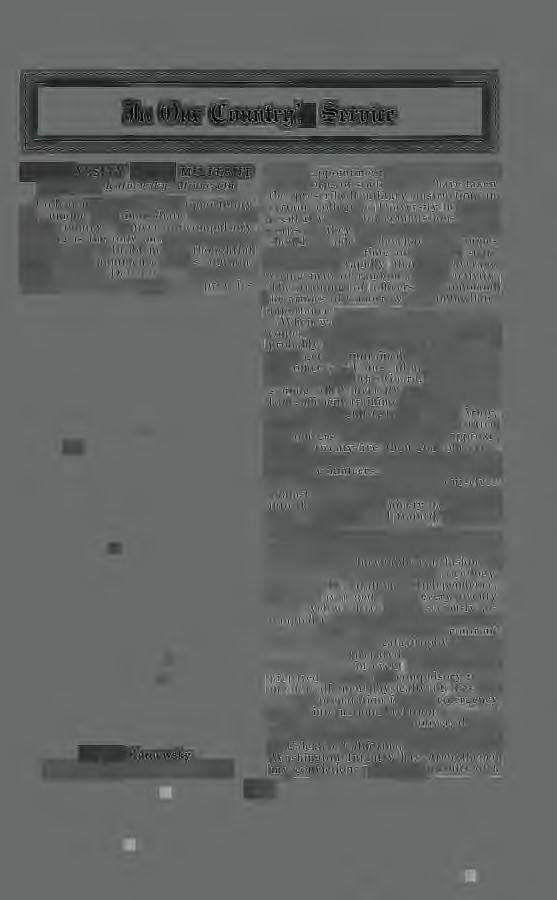
W. K. Kutnewsky Capt . Co. D ., Second Wash . In£.
fo r th e ap p o intm e nt t o th e O ffic e r s' R ese r ve C o rps o f stu dent s w h o h ave t a ken th e pr esc rib e d milit a ry in s tru c tion in ce rt a in co lle g e s. Uni ve r s ity m e n a re p e c uli a rly fi tt e d fo r co mmi ss i o n s in thi s co rp s, as th e y h ave tr a ined minds a nd s h o uld b e a bl e t o deve l o p int o co mpet e nt offi ce r s in tim e of n a ti o n a l s trif e mu c h m o r e rapidly th a n th e ave r ag e yo un g m a n of r a ndom ment a l ac ti v ity. T h e tr a ining o f o ffi ce r s t o co mm a nd th e a rmi es o f t o m o rr ow i s o f tmm ed iate im po rt a n ce
W h e n w ar with any fi r s t cl as s p o w e r com es , th e initi a l ca ll f o r tr oo p s will b e prob a bly f o r o n e milli o n m e n . W e c o uld g et th e untr a in e d m e n , but wh e r e the o ffi ce r s ? Us in g a ll th e officer s o f th e A rmy and the Gu a rd , by co mmi ss io nin g all U niver s ity m e n wh o h a ve had s uffi c ie nt trainin g t o h o ld co mmi ss io n s a nd all enlisted men o f the A rm y , Gu a rd a nd s u c h c ivilian s who a r e fitt e d for o fficer s , we sh o uld h av e a ppr ox imat e l y twenty-five thou s and offi ce rsju s t one-h a lf en o u g h t o offi c er the fir s t ca ll f o r vo lunt ee r s . A nd G e n e r a l S co tt sa y s th a t in o rder t o in s ur e o ur se lv es aga in s t inv as i o n w e mu s t b e a bl e to put int o th e fie ld w ithin nin e ty d a y s a t o tal o f thr ee milli o n w e ll tr a ined , w e ll o ffice r e d m e n.
Th a t th e United Stat es w ill b e e ngage d in a n o th e r war within thi s ge ne r a ti o n is th e in ev it a bl e co nclu s ion o f t h e s tud e n t o f hi s t o ry a n d soc i o l og y S in c e t h e De cl a r a ti o n of Ind e p e nd e nc e , we h ave average d a wa r eve ry t w ent y yea r s; yet we h ave n eve r se ri o u s ly att e m p t e d t o tr a in o u r citi ze n s t o meet a s ituatio n th a t is a lm os t s ur e t o co nfr o nt t h e m To ave rt a c a ta s trophy in bu s in ess is t o be p r e p a red t o m ee t it. T o in s u re v i c t o r y in eve nt of war is to b e p r e p a r e d fo r w a r. In c o mpuls o ry tr a ini ng fo r a ll m e n phy s i ca lly fi t , lie s the way f o r pr e p a r a ti o n f o r a n y e m e r ge ncy in o ur int e rn a ti o n a l relati o ns .
I h a v e a lw a y s fa v or e d uni ve r sa l se r vice a nd my t o ur of ·duty o f the b o rd e r at C a le xic o , Californi a, with th e Se c ond Wa s hington Inf a ntry has s tren g then e d my conviction s. Th e gre a t fa ults o f a
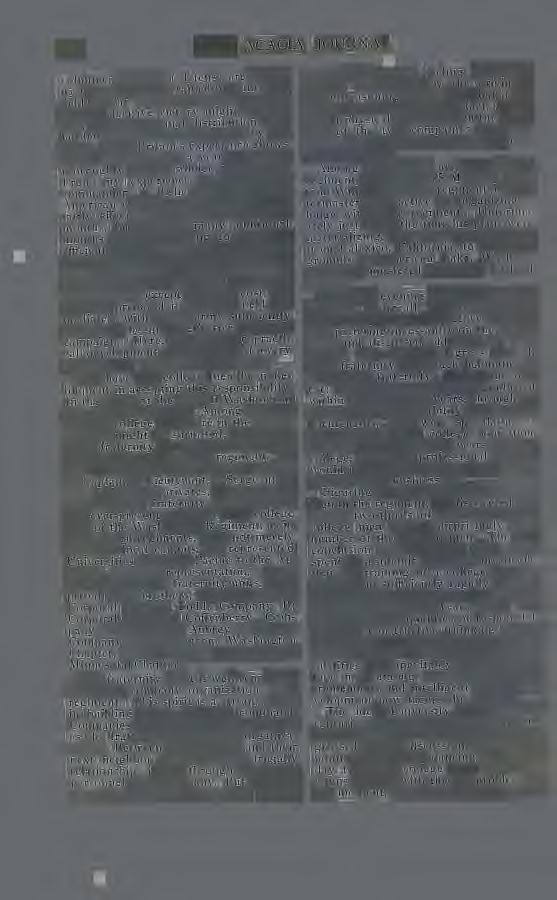
volunteer system of art; inability to get sufficient tramed men mto the field in the early stages of the war, when a d e cisive victory might end the war and the unequal distribution of a burden which should be borne by all, alike. Great Britain ' s experience shows that it takes at least a year to make a thoroughly trained soldier of a recruit. From my experience as a company commander I believe the average American volunteer can be made into a fairly effective soldier in six to. months but it takes many additional months' of hard training to make an efficient officer. When the United States engages in her next war will nc;>t have six months, nor even SIX weeks m which to train her citizens. If she expects victory, except at awful cost, she must be prepared to take the field immediately with a vast army sufficiently trained to begin an effective offensive campaign. Here , then, lies the practical development of the ideal of every college man: service to the state.
Nor have the college men been delinquent in accepting this responsibility. In the ranks of the Second Washington were many such men. Among the officers the college men were in the majority. As might be surmised, there were many fraternity men among the officers and enlisted men of the regiment. It was no uncommon sight to see a Major or Captain, a Lieutenant, a Sergeant or two, and several privates, all brothers in some college fraternity, posed before the ever-present camera. The college men of the Washington Regiment, as in all Western regiments, were not merely from the local campus, but represented Universities from the Pacific to the Atlantic . Acacia's representation, one of the smaller of the fraternity units, comprised four brothers , three of whom , Corporal George Todd, Company B; Corporal Clarence Coffenberi:y, Company F, and Private Aubrey A. Archer, Company L, being from Washington Chapter , and the writer, an aiumnus of Minnesota Chapter.
The fraternity spirit is well represented in the company organizations of a regiment. This spirit is a strong factor in building up an efficient command. Companies will form likes and dislikes a s do fraternities or other organizations.. Between my company and their next neighbor existed a very friendly relationship ; it ran through the entire per s onnel of the company But between my comp a ny and one a few streets
away there was a feeling almost of hatred. No one knew the origin of this unreasoning dislike, but that it existed no one doubted. In fact, at one time a physical clash between the members of the two companies was only averted by the cool counsel of some of the older men.
Among the officers and men of my regiment were about 75 Masons . Captain William Nelson, regimental quartermaster, was active in organizing a lodge within the regiment. Unfortunately just about the time his plans were materializing, we were ordered home from Calexico, California, to our camp grounds at American Lake, Washington, to be mustered out of the Federal service
One cold evening the latter part of October, I recall, four officers sat in my tent around an oil stove, with the rain pattering incessantly on the canva s roof, and discussed old days of Alma Mater. We all had degrees and all were fraternity men, each belonging to a different fraternity. I was the oldest; the other three having graduated within the last three years, through industry and natural ability had become Lieutenants. We were speculating as to the value of a college education, whether or not the four years spent in college, except in professional courses, would not be better spent in the oractical school of business.
Figuring up the number of colle g e men in the regiment, we discovered that nearly two-thirds of the officers were college men, and a surprisingly large number of the enlisted men. The final conclusion was that the four years spent in academic halls are invaluable. that the training of a college man ad vances him sufficiently rapidly to overtake and pass the average man who has entered business four years earlier ; and that just as the qualities of responsibility and constructive thinking render the college man a leader among his fellows wherever he be found, so these qualities will inevitably place the college man among the leaders in the tremendous and intelligent militarv development now facing this nation.
The ideal University man of a few centuries ago was the monk, secluding himself from the world of affairs, en · grossed in the discussion of a needl epoint as a celestial dancing floor Today the ideal college man is he who aligns himself with the big problems of the moment, who bears his share of the
c1v1c burden, who gives .time to the solving of public questiOns. Julius Caesar, that time-honored hero of the class room, was only secondarily a man of letters. First and last he was a soldier.
The ideal college man of today should be a soldier; perhaps not primar-
H. F. Hand, Syracuse
During the month of August, 1916, I had the good fortune to be ab l e to attend the military camp at Plattsburg, New York. This was one of the most beneficial, as well as instructive experiences of my lif e. The period of the camp extended from August 10 to September 6, and was attended by

H. F. Hand
ily a soldier, but sufficiently trained in military knowledg e immediately to take the field at his country ' s call, casting off his civil occupation as one would a coat, and for the time becoming a capab le defender of the principl e s upon which our nation is founded.
about 3,500 men from various sections of the Union. In gen e ral, they w e re as fine a bunch of red blooded Americans as one could ever hope to mix with. They were men who had come there, not with the idea of enjoying a vacation, but inspired by a real sense of patriotism. They had come for a month of hard, tough work, so that they might be better fitted to render s ervice to their country in time of need. I say real patriotism b e cause that is what it is; patriotism must embody sacrifice and willingness to give up comforts and lu xuri e s for the a lt ernative of eating coarse, uninviting food a nd being reprimanded, because you can't induce your awkward, untrain e d a rms and legs to perform properly when in rank. The whooping, yelling a nd shouting kind of enthusiasm which o n e so often hears ca ll ed patriotism , wou ld not have much effect in stopping an invading horde from overruning our country.
The regular army officers at Plattsburg gave me the biggest surprise which I r eceived while at camp. My idea of an officer, gained from listening to the tales of old veterans, was that of an overbearing, cursing, swearing bully whom you supposed to obey because you were afraid he would knock you down . Never was there a more false conception. The officers, e very one of them, were gentlemen, in the best sense of the word. They were men whom you respected and admired. You did not mind being called down because you knew that you deserved what you received. After a time you became accustomed to , and learned to l ove the sharp, snappy commands of you r captain and major.
The regular routine work of camp was very strenuous although our office r s never asked us to perform any physica l impos sibi liti es We were first taught enough close order drill to enab le the officers to move us about. We then began with the open order of skirmish line work. In attacking imaginary fortified positions and in sham
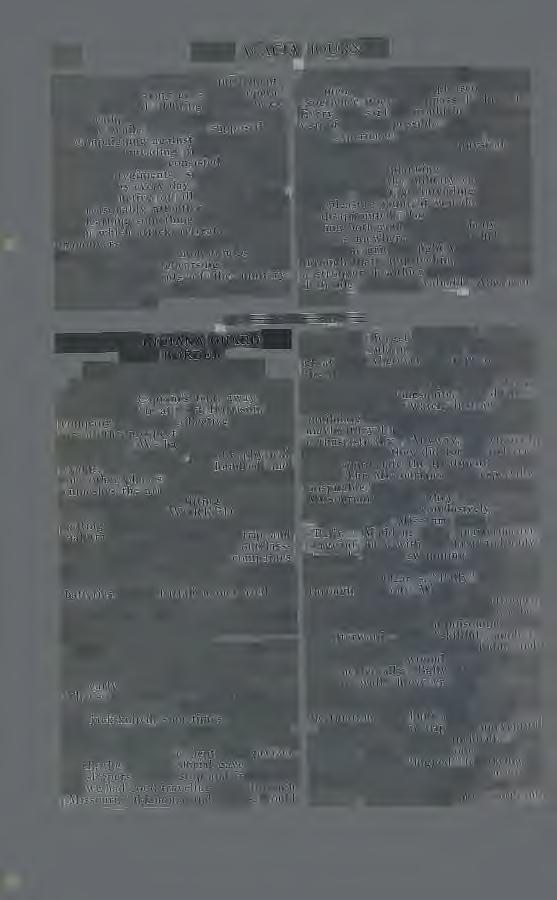
battles we were t a u g ht the fundam e ntals of h ow an army goes about operations in the field. During the last week of the camp we went on a long march. All this while we were supposed to be campaigning against a hostile force which was invading from the north. This hostile force consisted of one of our own r eg iments , so that we had s ham battles eve ry day. This hike was most instructive of a ll and if a man · was reasonably attentive he could not help learning something about th e m anner in which attack, retreats a nd o th er manouvers are carried on in the field. It must have been monotonous work for our officers, rehearsing again and again the rudiments of the military game, but if they did get tired th e y never s howed it.
W. Link er t, Purdu e Chapt er
When the officia l order finally arriv e d at our Captain ' s tent, away back there on July 6, at Fort Harri so n, our company gave one collective whoop of joy at the prospect of sett ing out for the Border We had been kept in suspense for so long a time by physical exams, invoices and the hundred and one other phases of the r e d tape that enmeshes the army, that the n e ws ac ted upon us lik e the lifting of a safety va lve . Well , we WORKED that day getting our outfit packed on the special train ready for th e l ong trip a nd had a good bit of pleasure in outclassin g th e other two ar till ery companies in the matter of l oading. As a matter of fact, the rivalry betw ee n th e thr ee batteries in our battalion in creased the long e r we were in serv i ce and probably did us a lot of good, for we did our darndest to outclass each other in even the s malle s t details.
Did you ever sleep two at a time in a double seat on a railroad coach whose history could be traced back to the early days of our national growth? Th a t's the kind we had until we reached St Louis. Doubled up , kinked up, jack-knifed, sometimes almost tied in a knot , we sped on to St Louis; some of u s were so crooked by that time we could have slept on a pretzel. Well, th e railroad official gave us tourist s l eepers a t that stop and from there on we had good traveling down through Missouri, Oklahoma and Texas. Could
At the end of the period I saw very few men who were not pleased with the e xperience they had passed through. Every one said he would be back next year if it were possible. It is a beneficial experience for any man. If you are a man of the average physical endurance and hav e a desire to serve your country, start planning right now to a ttend one of the military camps next summer. Don't go intending to make it a pleasure jaunt , if you do you will be disappointed. Go with the idea of making both your brain and body work and if , somewhere under your hide you have some grit and fight you will com e through that camp f e eling that you are a st r onger, healthier man and a m o re desirable and mor e valuable American citizen
a ny of u s forget that trip? Not o that you could notice it!! We had a great time wherever we stopped for a ll th e fair ones came out to greet us If they'd have known we wer e going down to grub mesquite, dig ditch e , and drink c a nal water, instead of t o annihi l ate the terrible Mexican bandits, maybe th e y ' d not ha ve turned o ut so enthus i astica lly. Anyway, we enjoyed all the things they did for us and certainly appreciate the treatment ex t e nded us. The Missourians were espec iall y hospitable , no one can ever kno ck a Missourian to me; they h ave proven their calibre most conclusively.
It was in Missouri that Brother " Bally" Madden, our quart e rma ter sergeant, met w ith his first and only "wound. " While swimming in th e Gaconade, a pretty little stream down there in the Ozarks, "Bally" ran a nail through his foot. Well, we were s ur ely excited, for a New York tro oper had done the same thing th e week before and had died from poisoning s h o rtly afterward. The " skillful" application of a match soaked with iodin e and thrust into the wound saved th e day, and incidentally "Ba lly. " He was unab l e to walk, however, for five weeks a nd so missed some of the " fun " the rest of us had when we reach e d our destination and built our camp s. The rest of our trip was un even tful s ave for a few minor incident s. For instance; our cook (not one of our coll ege men) was "jugged" for tryin g to remove several fingers from on e of hi kitchen police by m ea ns of a meat cleaver We lost our mes s-sergeant
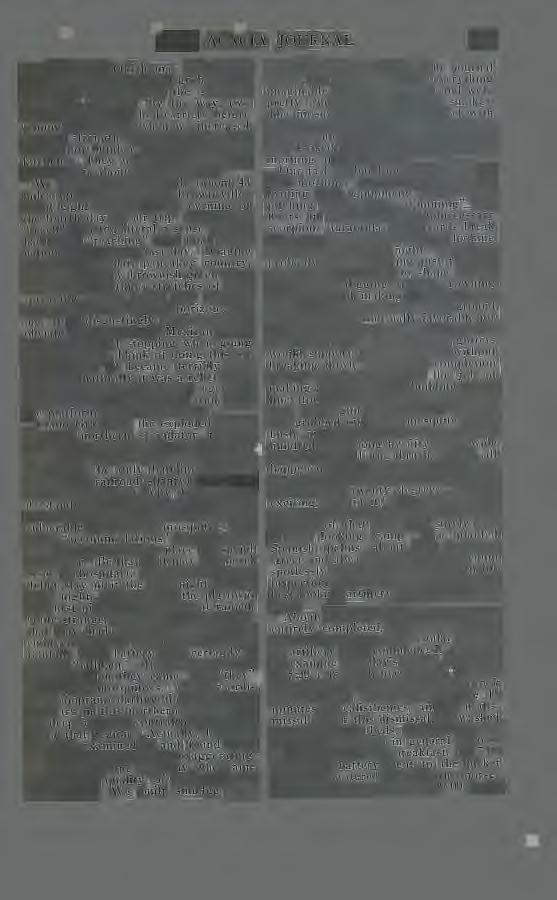
too, in Tulsa, Oklahoma. We didn't care much, because all the grub was on the train and we had the so-called cooks l eft · anyway. By the way, two of our cooks were hod-carriers before joining the battery when we increased to war strength, and the other, had cooked for lumber gangs and prison kitchens. They were some class, and I'll tell you about them later on.
We reached Llano Grande (about 43 miles up the river from Brownsville) about eight o'clock on the evening of the fourth day of our trip. Don't take "reach" in a too literal a sense, for we had been "reaching" our final destination for the whole last day. Imagine riding over a flat, pancakey country, covered with dry brownish-green mesquite with sometimes stretches of sand spreading away from the railroad tracks to the far distant horizon; riding at a disgustingly slow speed to obviate accidents from Mexican dynamite and a lm ost stopping when going over a bridge. Think of doing this for a solid day. It became terribly tiresome and naturally it was a relief when the captain gave us order to get out of the cars and carry our stuff onto the platform at Llano Grande.
Llano Grande is the exp loded dream of some northern speculator, nothing but a hotel remains to tell us that there ever was such a dream. At one time the hotel (the only building in sight except the railroad shanty) was used as a w int er resort. Why, I cannot understand, for it seems to me that a man wou ld have to be blind and invulnerab le to the heat, mosquitoes and other "accommodations" of that territory to go to such a place to spend the winter. Be that as it may, the hotel (now a hospital), was there but we didn't stay in it the first night or any other night. We slept on the platform that first night and of course it rained . Quite strange, wasn't it? Do you know, that day had been the first one in eighteen months that had seen any rainfall. Our battery was certainly a sort of "bill iken ." It rained about an hour and then they came. By "they" I mean the mosquitoes . Not the ord inary shoprano darling that sing abo ut our ears in this northern climate, but the deep bass and contralto brutes that infest that region. Actually, I caug ht one and examined it and found it to be an inch long without exaggerating. He was only one of many who came to test the quality of the new and fresh meat. We built sm udge fires,
took a'll the waste out of the journal boxes on the cars , did ev e rything imaginable to create a smoke and were pretty successful (with the smoke) The mosquitoes seemed to revel with delight even in the densest clouds so we gave up at l ast and let them bite We looked like boiled hams in the morning and felt worse.
Our task of building camp began on that morning. While some w e re unloading our equipment other s were pitching tents and "skimming" the floors in order that no unn e cessary scorpions , tarantula s and lizards break in on our sleep which we were looking forward to for that night. W e were probab l y a week getting just the tent position of our camp in shape; laying out a street, digging gutters, crowning the center and making it look in general lik e a paved street. The ground down there was unusually favorable for our plan because it packed like cement and even the edges of the gutters would support a man's weight without breaking down. Aft e r the completion of the street, we tackled the job of making a gun park and building picket lines for the horses which we were to get. That gun park was an inferno! We grubbed out every mesquite trunk , bush, and cactus for a space of two hundred yards l ong by fifty yards wide and burned all the brush . This all h appened while the heat of the day was between a hundr ed and ten and a hundred and twenty degrees . Sounds exciting, doesn't it? Our work of this sort lasted for about a month and at the end of that time, we sur e ly had a fine l ooking camp. We planted Spanish pa lm s about our company street and always kept the entire camp spotlessly clean. Gen e ral Bliss on his inspection trip said that we had the best looking arti ll ery camp he had ever seen.
About the time that our camp was entirely completed, our horses arrived and from then on the regular routine of arti ll ery drill commenced. Here is an example of a day's work: First call at 5:30 a. m., with five minutes to dress and lin e up for reveille, which took place at 5:35 ; after reveille came 15 minutes of calisthenics, and then dismissal. After this dismissal, we washed and made our beds, cleaned up the tents and the camp in general; at 6:00 a. m. we h ad our breakfast, at 7:00 the entire battery went to the picket lines and watered and fed the horses and cleaned the lines. At 9:00 a. m.

the regular morning drill commenced and included va riou s phases such as harnessing th e hors es a nd having m o unted drill; s t an ding gun drill, and drill o n the fi ring battery. The recall sounded a t 11 :30 a. m., which gave us half an h o ur before me ss at 12 The noncommissioned office r s sc ho o l took place from 1 :00 until 2:00; the officers from 2:00 until 3:00 and then drill of the e ntir e battery from 3 :00 until 5:15 , w h e n th e hor ses were fed, watered and cu rri ed, completing th e day' s work. At 5:30 evening mess was "serv ed " a nd at 6:20 retr ea t so unded when we stood at parade rest while "to th e colors" was sounded. At 10 :00 p. m. taps sounded a nd we were a ll in b e d and lights out
A word or two a bout the "g rub" would prob ab ly int e rest you. During the first part of our stay at Ll ano Gr a nd e we h ad bacon and beans thr ee tim es a day for abo ut thr ee weeks. Bread was scarce until a fie ld bakery was esta blish e d at the camp. I r e member one no on we go t a s e rving of b ea n s, a cup of coffee, and a plug of t o b acco. Quite a succulent meal! -our cooks had unu s ually trying conditions to work und e r for a long while. During the rainy season our camp was infested with small gnats which h ad a habit of getting into our food and caused quite a disturbance in our s tomachs On e of th e kitchen po li ce (he lpless in th e kitchen) informed m e o n e day that during th e proc ess of m a king a panful of hash, the c oo k had s tirr e d in a thousand or so knats which had coll ec ted on the mat e ri a l. The job of chasing the gnats away was too mu c h for him, so he took the easy path. Th e t a l e mu s t have been true, for abo ut nine-tenths of the m e n were s ick that night. Our grub, toward the end of our stay, b eca m e much b e tter Th e comm is sary had been established and a lm os t a ll varieties of food could be go tt e n. Besides, th e m ess shack
Deming, N. M. (Ot h erw ise nowhere),
D ea r---: Oct. 26, 191 6.
I certainly felt cheap today when I rec e iv ed your l e tter and then thought what a l ong time it had been s inc e I had written you. I h ave n ' t any excuse t o o ff e r exce pt that I hav e be e n bu s ier th an
I am act in g t op Sergeant at present, the r egul a r t o p being in ------,
had been built and helped out very much in the way of cleanliness. The inspection became more rigid, too, and only boiled water was permitted to be used. For the first two weeks, we drank irriga ted canal water haul ed from a place about a mile and a half from camp and in a barrel filled with a horse buck e t With all this sort of tre a tment , we were in fine physical co ndition . Whenever the subject of our trip is brought up by anyone up here, the question, " Did you have any trouble w ith the Mexicans?" is asked We did not. The Mexicans who stayed around the camp were very peaceable (naturally) and most of them worked for the contractors who put up government buildings about camp. During our whole stay there in Llano Grande we never saw a ny troubl e of any kind, although a year and a h a lf ago, the place was a very hotbed of raiding and murder. In our rides around camp, we always went down to the riv e r, only six miles away and n eve r had a nything e xciting occur except perhaps a tumble from a horse or s o mething of that natur e . The army c e rtainly h as had the e ff e ct of keeping things quiet on thi s side of the river at l eas t.
When we l e ft Texas in Septemb er to return to college, the Fraternity was well repr esented in th e batt e r y, for thr ee of us were ranking sergeants, one a corporal and two first-class pri va t es were on special work. All of our commissioned officers were connected with th e university as instru c tors, and the captain was th e purchasing agent of the uni ve r s ity . The matter of getting commissions was out of the question for us. I beli eve we all enjoyed the exp er ien ce very much even if the conditions were extremely bad at tim e . Certainly we came back in good health a nd spirits d esp it e the fact that school had be en going on for t.wo weeks.
with th e rifle team. Th e ruling .that a man must be in the serv ice a year b e fore h e c a n compete on a state rifl e team is what kept me from making the trip. In th e competitive shoot h e ld for deciding w ho would be on the t ea m I was fourth on th e list of high men, but that did not help me any when the fina l reckoning was made. After I lost out on the rifle te a m, I put in my app li cation for a discharg e-being a college student I was entitled to one
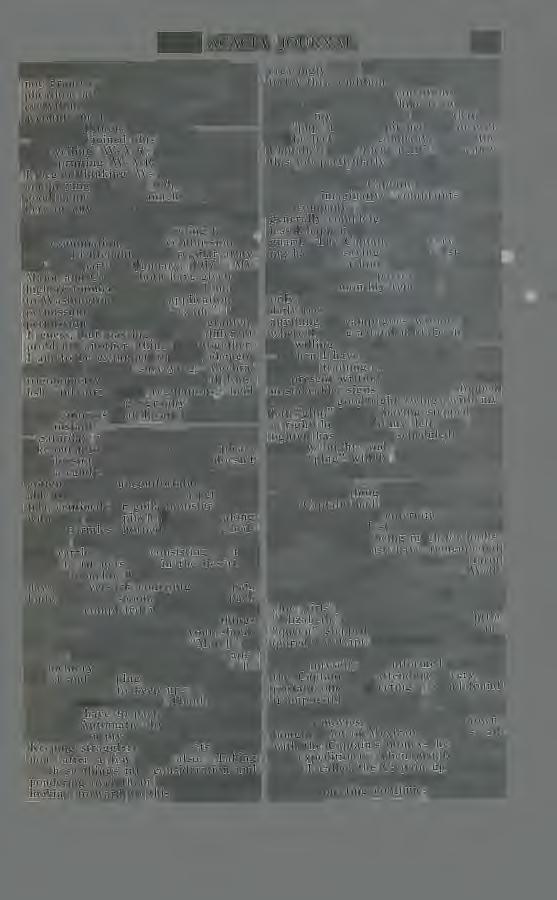
-but I had wa ited too long and it was not granted. If I h a d placed my application a week ea rlier th a n I did everything would have b ee n 0. K. This accounts in a measure why I did not return to Illinois thi s fall.
When I join e d thi s outfit eve ryone was yelling W-A-R, and the papers were printing W-A-R, so pretty soon I began thinking W-A-R a nd now I am pl ay ing W-A-R. Oh , yes, it is a good game but too much is plenty,here or anywhere. While I am on the subject I guess I had bett e r get it all out of my system. I am going to take the examination for a commission as · Second Lieutenant in the regular army the · first part of January , 1917. My Major and Captain both have given me high recomm e ndation s which I mailed to Washington with my applicat ion for permission to tak e the "exam." The permission to take it will be g rant e d, I guess, but pa ss ing it is a different prob l em-another thing all to ge ther. I am to be examined on both elementary a nd higher surveying, algebra, trigonometry, German, advanced Engli s h , infantry drill r eg ulations , fie ld service, history, geography and a few other subjects that I can not recall at this instant Saturday w e start on a four day's hike out into the de ser t. Sound s pleas' ant, doesn't it? W e ll, the s ound doesn't hold a cand l e to th e r ea l thing. I have gotten to feel uncomfortable and unab le to s l ee p unless I have a pet tar a ntula, centipede or guila monster in bed with me. In a pin c h I can get along with a harmless horned toad for a bedfellow. On a hik e such as this each man carries a p ac k consisting of two blankets (it gets cold in the desert at night), poncho, half rations for two days, a h aversack containig meat p a n , knife , fork and spoon . When your pack is finally compl e ted with all odds a nd e nd s, extra cloth es, a few ex tr a things to eat, etc., a big rifle on your s hould e r, canteen on your hip, "March" is given. Then the M a jor has a la pse of memory for an hour or two ( he rides) and we plug along in a column of dust trying to keep up . You know the r es t--- -. Th a nk heavens I do not have to pack a rifle, but that Colt 45 Automatic does not feel lik e a balloon on my hip after a long jaunt. Ke epi ng stragglers in lin e gets monotnou s after a few miles also. Taking a ll the :;e things into consideration and pondering over them, I find that I am looking forw a rd to this hike with in-
creasingly joy. I don ' t know whethe r to lay this condition of mind to former hikes, th e weather or conditions in Europe. It is when the hike is over that I start my day's work. I see that all the "pup" t e nts are pitched and in pect all th e feet in the company, exc e pt the Captain's and Lieutenant 's . I enjoy this job particularly whe n I h a pp e n to have a cold. After this, I run a few errands for the Captain, and li ten to various im agina tiv e ·compl a int from the company. These duties of l ove generally complete my day's work unl ess I happen to ha ve to po t the camp guard. Th e Captain has a very irritating habit of saying, "Let th e 1st S e rgt. do it" or "Le t him see to it. " He has me is s u e all the pass es to t o wn, get out all th e monthly r epo rt s ( there a r e on ly nin e or ten of th em), ke e p the d a ily record s, and calls me down whe n anything in camp goes wrong. I see where I made a fatal mistak e in being too willing when I first landed When I hav e any time off I tak e my turn at training o ur company box e r. At present writing I show cer tain unmistakeable signs of h av ing stopped one of his good right sw in gs with my l e ft "glim" and of h av ing s t epped int o a right hook with my l ef t ear. Ou r fighter has a match sc heduled for t omorrow night and, b e li eve me , the o ther "plug" wi ll be out of lu ck if he ever stops one of those right sw in gs with his jaw.
One more thing th at I ca n ' t forget. Th e Captain h ad m e m eet the tr a in the other night to entertain a relative . She was a long lost co usin and he did not figure on her being much for l ooks, I g u ess . He mu s t h ave r e membered h e r as s he us ed to be on the farm where they called her "L i za." We ll, af t e r the folks mo ved to town and Liza h ad a coup l e of years at a fashionab le girls' sc hool s h e go t a way with "Elizabeth" right well. When a littl e "q ue e n" stepped off the tr a in a nd inquired for Capt. I was some tak e n back, but finally came to ,- introduced miYself, and inf ormed h e r that the Captain was attending a very important officers meeting ( ?) and found it imp oss ible to m ee t n e r , mu ch as he wou ld like to h ave done so. We went to the movie s , walked around town , bought a lot of Mexican souvenirs (a ll with th e Captain 's mon ey-h e financed the e xpedition ). Th e n just before retreat I called the Captain up and told him that if I were h e I would have the officers' meeting continue, a lso that he
could consider it a favor to himself if he would excuse me from retreat. I was excused alright and the round of pleasure continued, the Captain happy in his ignorance. Just before her train left the Captain came down to see her. His ears got red (I was watching him closely). He finally told her how sorry he was that he could not get away sooner. (And he meant every word of it .) Well, he s·aw her onto the train and then hunted me up . I could see that he was all lit up with an internal fire of some kind. I thought I would stake my all in one last throw so I said to him, "Captain, I have just 25c left out of that five spot you gave me. Let's have a drink." He was getting purple around the gills and I started to look for a small knot hole All of a sudd e n he laughed and said, "All right. But keep the two bits. She is coming oack through here in a few
Dear "Pop" (Louis Lindsey, Syracuse Chapter)
Yours of quite some time ago asking for information came to hand but, alas, it also was lost in the shuffle, until the circular from the Syr a cuse organization came along, and roused some guilt in my conscience .
In reply to your inquiry would state that I have no photos of myself in war-time costume at hand. Terzian took two snap shots of Ransier and myself, and ought to be able to give you something in the picture line, so get after him for a photo.
Have nothing very thrilling to state in regard to my experiences on the border. I left with Co. E of Jamestown , which was attached to the 74th Inf. of Buffalo on July 5th for Texas, wh e re we arrived on July 10, at Pharr, 40 miles up the Rio Grande from Brown6ville, and pitched the tents in a rainstorm. Thereafter it rained, for 20 days more or less, sometimes more than less, while we made camp, pitched our tents , made a company street, helped dig a one-half mile drainage canal to carry off the surplus H20 from our camp, and drilled in close and extended order. After over a month and a half of this drilling and ditch-digging, we started· on a 100-mile hike Aug. 24, which lasted for 12 days, during which we carried full equip-
days." I have a hunch that I will not be sent down to meet her. I have never admitted being homesick, but you can tell the boys that I would give everything I possess, almost, to be with them just one night. If I get into the regulars I will draw a thirty days' furlo"w, and I will certainly come down to 501 East Daniel for a visit. And if I do not make them, I will be back for a three years' layover. There isn't a day that I do not think of the boys-every one of them, and I would gladly stand a court martial on a charge of 'most anything if I could be with any one of them for just five minutes. Give my regards to a ll of the fellows, I will not attempt to name them.
As ever, your pal,

Nov. 16, 1916.
ment, and sweat most copiously, and lost what little av irdupois the drills had not taken from us. The whole division of 15,000 N. Y. state troops took part in this hike, covering the same route on a carefully planned schedule, so that all camping places were not over-crowded.
After our return on Sept. 6, tanned, tired, and dirty, we washed equipment for three days, and again took up drills and "light construction work" for a month, after which I was discharged on Oct. 4 on the "dependent relative " ruling, and, after a trip to Ft. Hamilton, New York City, where I received my final papers, and pay, came home by way of Syracuse. This ended my wearing of the uniform for Uncle Sam By the way, have Terzian and Nick returned, or was that only a rumor ? Since my return have been so bu s y here at home finishing up fall work around my new house, and getting u se d to civilian ways, that I've had littl e time for much else. As you will s ee by the heading of my letter, I'm with a good company in the sales department of the Art Metal Co., located here. It was a jump from lumber to metal, but I think the change was for the better.
Now, Pop, don't consider me a dead one, but a busy married man, and excuse the delay. '
Sincerely and fraternally, CLINTON W. PERRY.
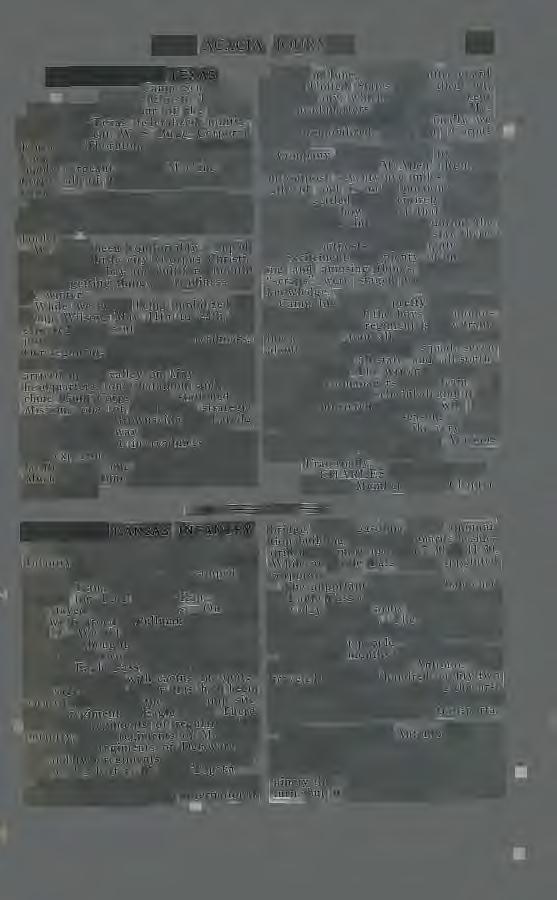
Camp Scurry, Corpus Christi , T exas. There are only four of the brothers in the Texas federalized militia They are, Lieut . W. S . Birge, Corporal Ernest G . Thornton, Private Dan M . Cook of Co. F, and the writer, who is supply sergeant of. the Machine Gun Corps , all of the Second Texas Infantry.
We were called out six months ago on the 9th of this month and have spent most of the time on the Rio Grande border ·
We have been comfortably camped here in this little city (Corpus Christi , Texas) on the bay and gulf for a m on th and are getting things in readiness for the winter.
While we were being mobilized at Camp Wilson, May 11th to 25th, we expected to be sent across into Mexico just as soon as we were in readiness Our regiment, the second, was the first to be sent down to the border . We arrived in the valley on May 26th, the headquarters, one batallion and Machine Gun Corps were stationed at Mission, one of the most strategic points between Brownsville and Laredo and about half way between them.
We were kept in readiness all the time expecting an attack from Luis de Ia Ros a or some other bandit chief Much of the time during June we slept under arms.
As a member of Co. B, 1st Kansas Infantry I was ordered to report at the armory on June 19th. We camped at Horton, Kan., three days and then e ntrained for Fort Riley, Kan ., where we stayed for two weeks. On July 7th we boarded a Pullman car for the border. We did not know our destination , but thought it might be Mexico City. After two days on the train we reached Eagle Pass, Texas. Our camp site was covered with cactus, mesquite, and sage brush. After this had been cleared off we had the best camp site of any regiment at Eagle Pass. There were two regiments of regular U. S . infantry, three regiments of Maryland N. G., two regiments of Delaware N. G., and two regiments of Vermont N . G., besides battery B from Topeka. While at Eagle Pass we took a regular time to guard the International
Later in June , when the entire guard of the United States was ca ll ed out, my company, wh i ch was always kept with h eadq uarters was moved to McA llen, th e n to Donna and finally we we r e r emo bilized here m Corpus Christi.
Company F was moved to Roma when we moved to McAllen. Roma is an outpos t seventy-five mil es from a railroad · and is in a portion of the country se ttled almost entirely by Mexicans. Th e boys report th a t not one white woman did they see during the entire thr ee months of their s tay th e re . These outposts afforded quite a bit of exc itement and plenty of interesting and amusing things, but no r ea l "scra ps " were staged to the writer's knowled ge.
Camp life here is pretty much r outine and so m e of the boys say monoto n o u s. But our regiment is no w training a "c rack "fo otball squad We have about thirty men on the squ ad, seven of whom are all-state and a ll-southwestern men. The writer a nd Dan M. Cook are co-managers of the t eam . We hav e four games scheduled and if we are not must e red out soon will ha ve a n all winter football season.
Th e boys here would like very much to get in touch with other Acacians e n th e border Look us up Fraternally, CHARLES B. STEWART, Charter Member Texa s Chapter.
bridge, mine, gasoline tank, ammunition building, a nd camp guard; b es id es drill in the morning from 7 :30 to 11 :30. While at Eagle Pass I was appointed corporal.
The important thing which happ ened at Eagle Pass occurred once a month. Pay day in the army mean s a good time for everyone. The soldier seems to think less of his money than any o th er class of people.
After two months at Eagle Pass we were ordered to San Antonio. We traveled the one hundred eighty-two mil es in motor trucks It was the first trip ever made by U. S. soldiers in motor trucks as a means of tran s portation . Our camp at San Antonio had b ee n up four days , when orders to prepare for a hike to Austin were given out. The First Kansas made the trip of ninety-three mil e s to Austin and return , but it caused many blisters, and

r e gular army life was given a new lo ok. When news came of the orde r s to return home there was plenty of nois e in camp. Almost ev e ry one of the K. N. G. boys caught cold from the change o f climat e, which was very notic ea ble
The co mp a ny was mu s t e red out of U. S. se rvi ce on the 30th of Octob e r,
just four and one-half months after le aving home Most of the men r ea lly e njoyed the trip, but there was too much cactus and "varmint" to enjoy it to th e full es t e xtent.

S y r ac us e Chapter- Nic holas R a n s ie r, Sergeant, Ba tt. A. 1 F A., N Y., MeA ll a n , T ex.; H. G. T e r z ia n, S e rg ea nt, Batt. A. 1 F. A., N. Y., McA ll an, Te x . C. W. P e rry , 74th N. Y. lnf.
Wisconsin Ch a pter-R. F. T ay lor, Co. C 1s t Wis. lnft ., 0. M ., Camp Wilso n , T ex.
Ohio Chapter- A. B. B in g h a m , Corporal, 0 N. G ., R eg o. 4, Co G; H B. Knight, 0 . N. G. , Reg No 4, Co. G; Albert M. Sm e lk e r , Corporal, 0. N. G., R eg . No . 4, Co. G; R. L. Mundh e nk , Captain, 0. N . G , Reg. No. 4, Co. G; M. B . P e rrin , 0. N. G ., R eg. No. 4, Co. G ; W. Fr a nk Busch, 1s t L ie ut ., Machine Gun 0. N. G , R eg. No. 4; J H. Richard so n, Hospital Corps.
Kan sas St a te Ch a pt e r-Je ss Whit e, Huston Kansas Re g.
Fr a nklin Chapte r-Dr. Wm. F. Guilfoyle, 1st Lieut., Med. Corps , 6 P Inft., El Paso, Te xas; Dr . Frank B . Ba ird
Columbia-}. H Mar c hmont, Co. M,
7th N. Y. Inft. ; J Carlisle Sw ain, Co. K., 7th Y. lnft.
P e nn. Stat e-J E. Davi s, Co. L, 1st Pa. E::avalry, El Paso , T exas.
Missouri-Warren Rob e rts , Li e ut ., Co. I; F. A. Hei lm a n , S e rg ea nt, Co. F, 4th Missouri; Asbury R obe rt s, Sergea nt, Co. F, 4th Missouri.
Tex as - W. S. B ir ge, Li e ut ., R ecruiting Officer , S a n Antonio, T exas; Chas. B. Stewart, Machine Gun Corps, Mcssen, Texas ; Dan M. Cook, Co. F, Seco nd Texas lnft ., Rom a, T exas; Ernest G. Thronton , Co. F , Second T exas Inft. , Roma, T exas.
Illinois-}. H. G a mmell , 1st Lieut.; McKay, 2nd Regiment.
Minnesota- J. H. GammeJI, Fir t Li e ut e nant, Second Minnesota Inft. ; McKay, Private, S eco nd Minn esota In ft.
\i\T as hington-Geo. Todd , Corporal Co. B ; E. M. Coffen berry, Corporal , Co F.; A. Archer, Second Washington In ft.; W . K. Kutnewsky, Captain, 2d Washington lnft.


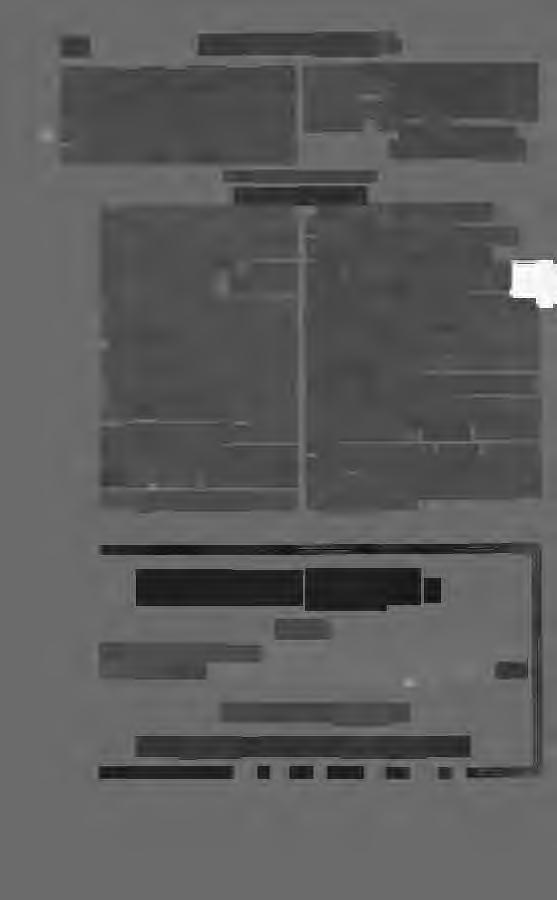
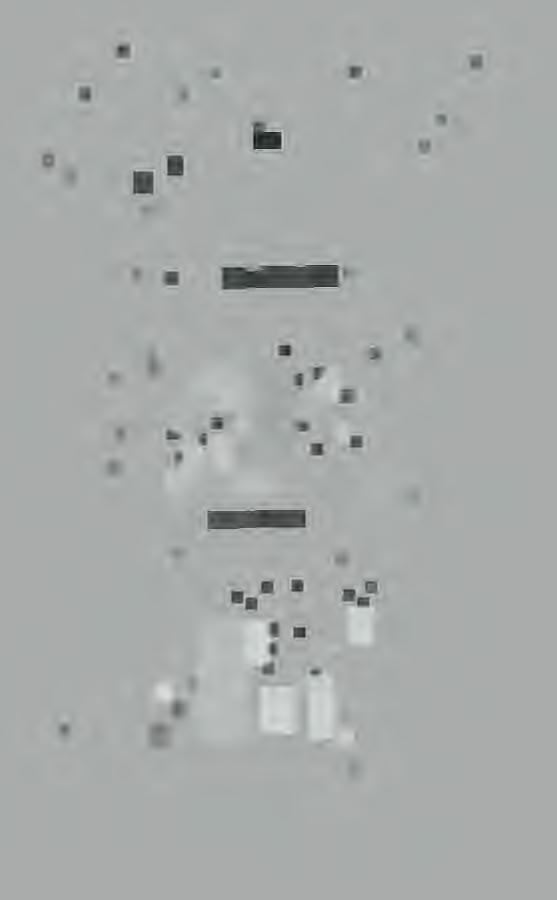
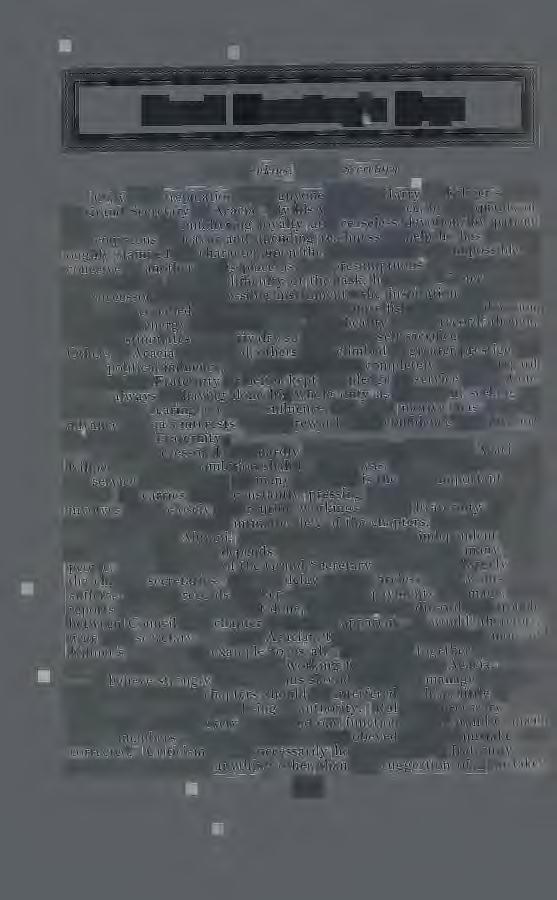 A.. A. Jenkins , Gmnd S ec1· etm·y
A.. A. Jenkins , Gmnd S ec1· etm·y
Only with trepidation could anyone take up Harry E. Kilmer's work as Grand Secretary of Acacia. By his years of service, by the quality of his work, by his unfaltering loyalty and ceaseless devotion, by patient and courteous endeavor and unending readiness to help he has so thoroughly stamped his character upon th e office that it is as impossible to conceive of another in his place as it is presumptuous for that other to hope to fill it. For the difficulty of the task, however, Kilmer has left his successor the best possible instrument-the inspiration of a record that to be equalled must call forth all the unselfish and loyal devotion and all the energy a man can give. The beauty of the record , though , is that it stimulates not to rivalry so much as to self-sacrifice in the w o rk. Others in Acacia have toiled, others have climbed to greater prestige and wider political influence, but no one has more completely won the regard of the whole Fraternity or better kept the pledge of service to it. Co nscious always of having done his whole duty as he saw it, seekin g no one's favor , fearing no one's influence, his sole motive has been to advance Acacia's interests, and his reward is the confidence and affecti o n of 'the entire Fraternity. ·
As his successor I can hardly hope to be as useful to Acacia a s Kilmer was, but my ambition shall be as his was, to give to the office all the service that is in me . In many ways this is the most important offi ce of all. It carries more constantly pressing duties than any oth e r , it involves more closely the routine workings of the Fraternity , it co mmands a wider and more intimate view of the chapters, and is the clea ring house for the Alumni. With all this it is the least independent offi ce ; the work of no other depends, like this, on the work of many oth er people. How the work of the Grand Secretary is done rests largely with the chapter s e cretaries. If they delay or are careless or lazy, his wo rk suffers. If their records are kept back, their payments not made , their reports not in, his work is not done, and a source of discord and trouble between Council and chapter at once is apparent. I would , theref o r e, urge each secretary , y es, each Acacian, to keep ever fresh the memor y of Kilmer's work as an example to us· all. If we can together foll o w hi s steps we are fairly certain to be working for the best of Acacia. I believe that Acac ian s should be able to manage their o wn affairs and that the · chapters should be interfered with as little as p osible by thos e for the time being in authority. Rules are necessary , h owever , and we are all likely to err, and one function of the Grand Coun cil and its members is to see that the laws are obeyed and that mistake s ar e co rrected. Criticism is not necessarily hostile, and in a fraternity like ours should never be anything other than the suggestion of a mistake.
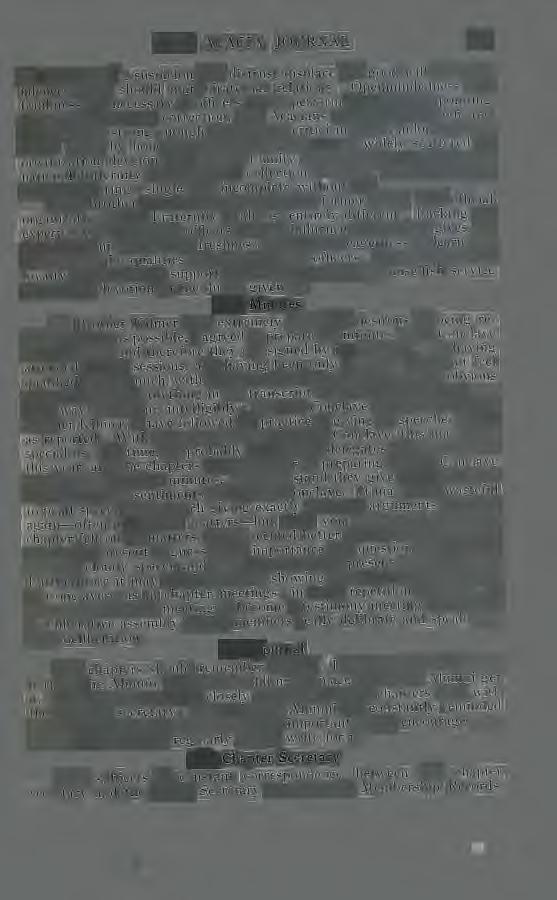
We must not let suspicion and distrust displace the good-will and confidence which should mark fraternal relations. Openmindedne s and frankness are necessary if officers are to perform their duty of pointing out errors and their correction, and Acacians are mature enough and are bound by strong enongh ties to meet criticism with candor and welcome. Only by honest trust in each other can so widely scattered an organization develop that spirit of unity which alone can make us a national fraternity rather than a collection of units. Let us be not a chain but a ring-single and incomplete without all.
Only Brother Mann this year retains his former office. The official organization of the Fraternity is almost entirely different. Lacking the .experience of the former officers and the influence that custom gives, we must make up in zeal and freshness of faith and eagerness to learn and to serve for the qualities lost with the past officers. All we ask is that loyalty and trust and support which we can merit by unselfish service and honest devotion to the duties given us.
As Brother Kilmer was extremely busy and desirous of being relieved as soon as possible, I agreed to prepare the minutes of the Conclave for that issue, and therefore they are signed by me for him. Not having attended all the sessions, and having been only a visitor, I did not feel qualified to do much with the debates other than to correct obvious errors and to omit anything in the transcript in which I could see no possible way of reading intelligibly. As this Conclave was in the care of Brother Kilmer, I have followed his practice of giving all speeches in full as reported. With two years before the next Conclave, this may be of special use this time, for probably most of the delegates will l eave school this year, and the chapters will next year in preparing for the Conclave have to rely on these minutes. As they stand they give a full record of the acts and the sentiments of this last Conclave. It may seem wasteful to print speech after speech giving exactly the same arguments time and again-often on minor matters-but here you know just how each chapter felt on all matters, and it seemed better to err on this side than for one not present to guess at the importance of a question or the meaning of a cloudy speech and give the others not present only his guess . Furthermore it may be of service in showing how much time is wasted at Conclaves-as in chapter meetings-in mere repetition of ideas. It is so easy for such a meeting to become a testimony meeting rather than a deliberative assembly, whose members really delibrate and speak only after deliberation.
The chapters should remember that the Journal is issued in large part for the Alumni. that it is not filling its place unless the Alumni get it, and that they are more closely in touch with the chapters than with the editor or secretary. See that your Alumni are constantly reminded of it and told how to get it, and, most important of all, encourage your active men to read it regularly and to write for it.
Two subjects of constant correspondence between the chapter secretary and the Grand Secretary are Pins and Membership Records.
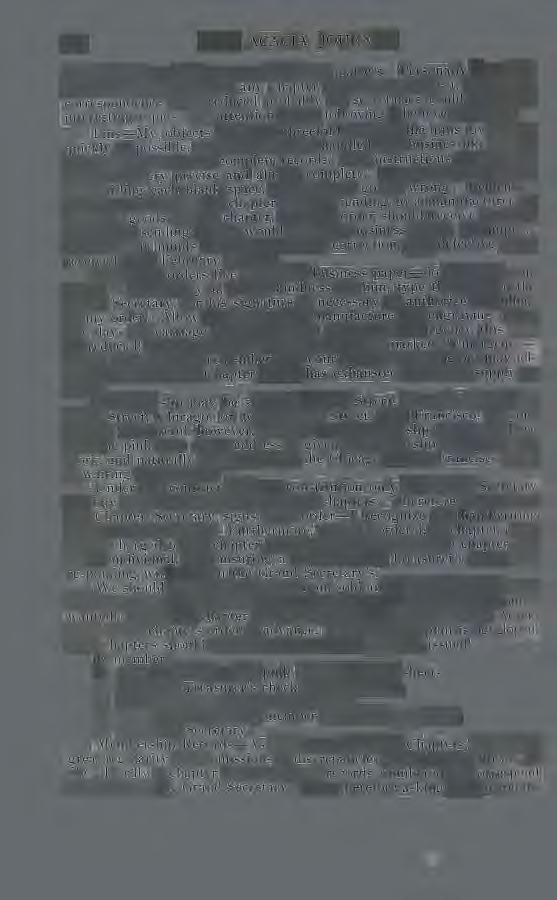
Fully half of our mail concerns these two matters. I af!l to hear at any time from any chapter and on any subject, but tf tht correspondence were reduced probably all secretaries could find more interesting topics. By attention to the following I believe it will be.
Pins-My objects here are threefold: to get the pins to you as quickly as possible, to have the orders handled in a businesslike way at each end, and to secure complete records. The instructions on the order blanks are very precise and almost complete. If you read and follow them, filling each blank space, you will not go far wrong. Remember that as an officer of the chapter you are sending to a manufacturer an order for goods for the chapter, and this order should receive as much care in the sending as you wou ld g ive any business order. To impress this on your minds I shall return for correction any defective order received after February 1, 1917.
Sign these orders like any other business paper-do not type your name. Nor should yo u , out of kindness for him, type the name of the Grand Secretary, for his signature is necessary to authorize the filling of any order. Allow ten days for the manufacture and engraving, and a few days for carriage back and forth. In case of emergency this may be reduced, but it cannot be if every order is marked "EmergencyRush," and you must remember that your order for a single pin may follow one for a whole Chapter which has exhausted the entire supply on hand.
The pink slip may be sent to 11 John Street, New York, to 31 N. State Street, Chicago , or to ISO Post Street, San Francisco, at your choice. Be careful, however, to write on the white slip where you have sent the pink one. If no address is given the white slip is sent to New York, and naturally delay results if the Chicago or San Francisco office is waiting to receive it.
Under our contract and ou r constitution only the Grand Secretary can b u y pins, a nd he buys only for the chapters. Therefore be sure that the Chapter Secretary signs each order-! recognize his handwriting alone on these orders. Furthermore, as each order is a chapter order and is charged to the chapter, it should be paid for by the chapter, not l>y an individual, thus insuring a record on the Treasurer's books corresponding with that on the Grand Secretary's.
We should have a record of each pin sold and I have asked all secretaries to write on the order the name of the man for whom the pin is wanted Thus the chapter and thi s office can know who has Acacia pins. Some chapters order in advance. Unti l a better plan is developed , s uch chapters should send the names as the pins are issued.
Remember:
1. Fill all blanks on the pink, white and blue sheets.
2. Send the Treasurer's check with the order.
3. Tell where you send the pink sheet.
4. Give the name of the member for whom you order .
5. Sign, Mr. Secretary.
Records-As they come from the Chapters, these with great regulanty show omissions or discrepancies from the data already on Hardly a chapter has sent in its records numbered to correspond wtth those of the Grand Secretary. I am therefore asking each secretary

to send me as soon as may be a complete copy of the member hip roll of his chapter--of the whole roll , not merely of the directory a it may at present be used by the chapter. Please do not omit thi .
If yo u will have before you a membership blank while reading this it will be easily understandabl e. The questions in the two block between the headings Membership Record and Acacia Record are to be filled out by the initiate , but you shou ld go over them with him first to make sure that he understands just what i s wa nt ed. The remainder of the record is for you The first line at the top is to be left blank for the number on the general Fraternity roll given the man on the receipt of hi s r eco rd at this office. The chapter name comes n ex t , a nd a reminder to give it would be absurd if it were not necessitated by the frequent omission of th e name . On the third li11e you shou ld give th e chapter number of the man, determin ed by the order of hi s initi at ion. This mean the position of the member on your roll , not as some have thought the chapter position in the roll of chapters.
In the sq uare marked Acacia Record the secretary s h ou ld write the date of the initiation, the date of the record, and he s h ou ld sign. As this is a record and n ot a prophecy, do not t e ll when the man will leave the U niver s ity or graduate.
A ll thes e details are simp l e enough and most of the errors and omiss io n s are due to the fact that the initiate and the secretary mu t co llaborate in preparing th e record and eac h tru sts the work to the ot h er. If the secre tary wi ll read the questions with the initiate and tell him w hich h e i s to answer-and sec th a t he answers these-the remaining questions will not bother t"he secretary to answer him self before h e s igns and forwards.
The Grand Council
The Grand Counc il is by the Const it ut ion the s uprem e exec uti ve and judicial authority of the Fraternity. In addition to the fucti o ns necessarily implied by those terms ce rtain specia l dutie and powers are exp ressl y g iven to it. Some of these duties are to act up on certa in matters o ri ginating with the chapters or an indi v idu al, and therefore it seems wise to call attention to the procedure to be followed in pre se nting such matters to the Co un ci l.
The Council i s a distinct body, like the Conclave or a chapter , and shou ld be o add r esse d rt acts as a unit, a sepa r ate o r g anization from anything e l se connected with the Fraternity It happen s to cons i st of the Grand Officers, but the Constitution mi ght n o t have so constituted it. The office r s h ave tw o distinct offices- his individual of fice to which the Conclave has named eac h one, and membership in the Grand Co uncil. The Pres id ent o f the Fratern ity presides at meetin gs as President of the Counci l and the Grand Sec r etary acts also as secretary of the Grand Counc il , but the power of o n e of fic er as member of the Council is n o greater than that of any ot her and separate ly no memb e r h as any autho rity at all.
Matters to be presented t o the Grand Counci l shou ld be directed to the secre t ary of the Counci l, who happens t o be the Grand Secretary. omm unicati ons for the Co un cil s hould never go to the individual members o f it , and the members of the Council shou ld not as s uch communicate on any Co uncil matter with the person or chapter presenting it in
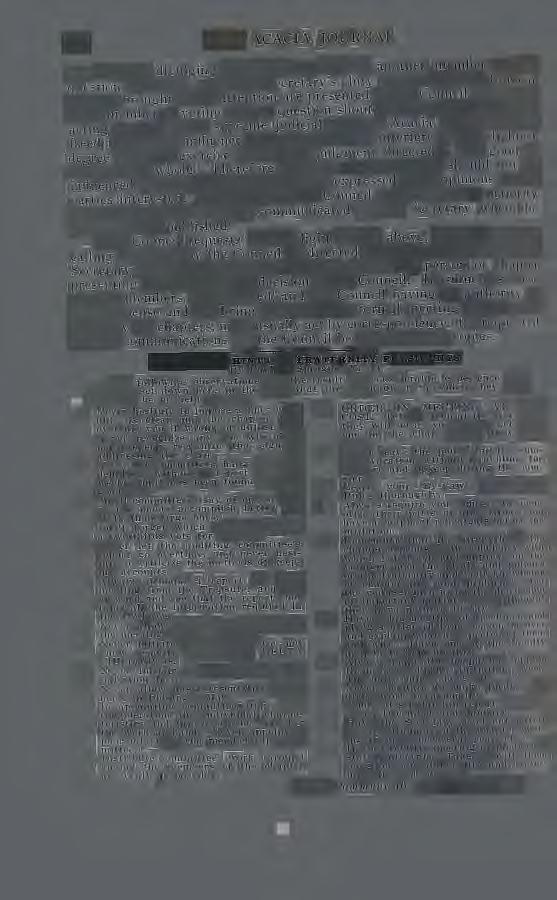
any manner di vu lging his action or that of another member on the question a t issue. It is the Secretary's duty to see that all Council matters brought t o his attention are presented to the Council for action. Each m ember in voting upon a question should have in mind that he is acting as one of the supreme judicial body of Acacia , and should be freed from every influence that might tend to interfere in tbe slightest degree with the exercise of his best judgment directed to the good of Acacia as a whole. Therefore his vote on any matter should not be influenced by the fact that others have expressed their opinions to the parties interested. The action of the Council is the will of a majority of it and this will is to be communicated by the Secretary when the action is to be publishe d.
The Council requests, in the light of the above, that all matters calling for action by the Council be directed to it and sent to the Grand Secretary, who after action is taken will advise the person or chapter presenting the matter of the decision of the Council. Inasmuch as there are five members, all scattered, and the Council having no authorit y to incur expense and not being able to hold a formal meeting unless sanctioned by the chapters, must usually act by correspondence, it is reque sted that all communications for the Council be sent with five copies
Th e followin g observations are the result of considerabl e experience an d they are se t down here in th e hope th at the grai n of truth which th ey contain will be of help to you:
1. Never hesitat e to impos e a fine; your 14. ORDER IN MEETING AT ANY duty is clear and the chapter will COS T. T ell the men at the start that overrule you if wrong or unjust. they will do as you say or get some
2. N eve r recognize any one who doe!; one in the cha ir whom they wlll n o t prop e rly r ec ognize the sign of obey. addressing the c hair.
15. Never le ave the house for the sum-
3. N eve r l et comm ittees h ang over in- mer vacation without providing for definitely without a report. A two its care and upke ep during the sumweeks' limit h as been found to be a mer. good one.
16. Learn your By-Laws and House
4. Small committees (say of one or two Rul e s thoroughly. at th e most) accomplish better re- 17 Always require your officers to memsults than larg e ones. or iz e th e ir parts of the ritual and
5. Don't forget which motions require a co uple of rehearsals before the a two-thirds vo t e for passage. 1mtiatwn.
6. N ever l et the auditing committee's 18. Remember that the strength of the r eport go overtim e, and never hesi- cha_pter depends on the efficiency with tat e to cr iti cize the methods of k eep - whlCh you teach and impress on the in g accounts. younger m en the ideal s and pol!c!es
7. Always demand a r eport at each of the fraternity and your knowledge m ee ting from the Treasure r and the of chapte r life and problems. Let steward and see that th e report con- the _you nger men ni on the discussion t a ins a ll the information required in of tmportant m.atters, even thou gh t the By - Laws. they nothmg to say.
8. N eve r allow smoki ng or chewing in 19 . Have a b1g of freshmen and th e me e ting room. pledges season Is over
9. N e ver initiate a man who do es not and exp l a m what 1s expected of them know exactly what PHI DELTA and why. Have one. of th e faculty CHI 11 · men in to help do th1s. re:;t .Y 1s
20. Always make the neophytes humble
10. !"ev.e r tmtiate a man wtthout his themselves during initiation week. mittation fee. . Tip hats, shine shoes, etc.
11. N eve r. a ll ow !f1ISrepre sentation to be 21. Nev e r hesitate to make pledges do mad e m Biddmg a M a n. dirty work occasionally
1 2. In a ppointing comm itt ees t ake into 22. Send out scholarship report cards beco nsi de ration the individual cha rac- tween December and Janu ary. t e nstics a nd fitness of th e man for 23. Have the Secr e tary send out l e tt ers th e work at hand Never appoint a to each alumnus of the chapter wish· Po.or mixer on the memb ership com- ing them a successfu l year, etc.
24 . Have a regular meeting of pledges at .13. Distribut e committee work around stated intervals. T ake up with them among th e members of the chapter questions of college life and frater· as evenly as possible nity life and conduct
-The Communi cator of Phi Delta Chi.
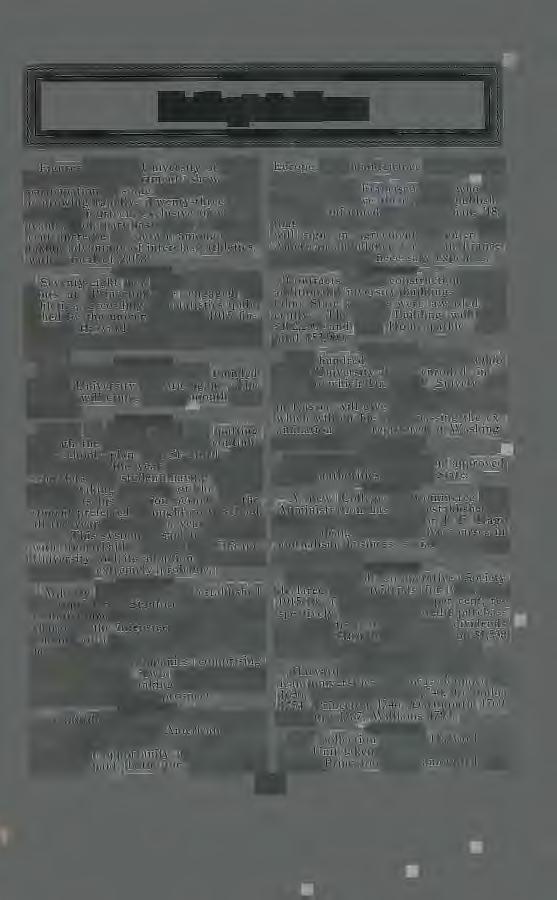
Figures from the Univ e r s it y of Michigan athletic department show that participation in some form of athletics is growing rapidly. Twenty-three hundred and fourteen, exclusive of varsity teams, took part last year A 12 per cent increase is shown among those taking advantage of interclass athletics, with a total of 2,058.
Seventy-eight per cent of t.he students at Princeton are engaged in athletics, according to statistics published by the university. The 1915 figures at Harvard show that 1,126 students took part in some major or minor sports.
A Naval Reserve has been founded at the University of Michigan. The reserves will cruise for one month each summer.
There is much talk of putting through the four semester or continuous school plan at Stanford. This would divide the year into four equal semesters, the student having the option of taking any one of the semesters off as his vacation period. If the student preferred he might go to schoo l all the year and finish a year ahead of time. This system is said to be in use with remarkable results at Chicago University and its adoption here is regarded as extremely ·probable.
Military drill has been established this semester at Stanford. Sixteen noncommissioned and regular officers had charge of the intensive drill at the beginning of the term, but the number has been cut to two. There is a battalion of four companies comprising some 250 men. Two men from the Acacia house are taking drill this term with several more in prospect.
Stanford men who wish to go to France and drive an American ambulance in the French service will be afforded an opportunity to have their expenses paid, both for the trip to
Europe, and maintenance while in the service. .
Several San Francisco men, who do not wish to have their names published, have informed J. H . Eastman, '18, that if between fifteen and thirty men will sign an agreement to enter the American ambulance service in France they will pay all necessary expenses.
Contracts for the construction of two additional University buildings for the Ohio State campus were awarded recently. The Shop Building will cost $102,290 and the Homeopathic Hospital $53,900.
One hundred and ten girls of Ohio State University have enrolled in a class to which Dr. H. H. Snively, recently returned from Red Cross service in Russia, will give a course of lectures wh ich will enable those passing the examination to be registered at Washington as Red Cross nurses.
A student court has been approved by the authorities at Ohio State.
A new College of Commerce and Administration has been established in Ohio State, with Professor J. F Hagerty as dean, which will give courses in journalism, business, socia l service and public service.
The Harvard Co-operative Society declared two dividends for the year 1915-16 of nine and seven per cent, respectively, to cash and credit purchasers. The total amount of the dividends paid was $16,614, an increase of $1,538 over the amount paid a year ago.
Harvard is the eldest of the American univers1t1es. It was founded in 1636, Yale 1701, Penn 1740, Columbia 1754, Princeton 1746, Dartmouth 1769, Pittsburg 1787 , Williams 1793.
The collection for the Harvard Surgical Unit taken up between the halves of the Prin ceton game amounted to a

little less than $5,50\1. According to the preliminary count taken of the money already turned in, a total of $5,400 had be e n r eac hed, and there remain e d a sum of between $50 and $100 to be counted This sum is nearly $6,000 le ss than the total of $11!432.39 contributed at the Yale game 111 the Stadium. The money will b e added to the fund for the support of the Harvard Surgical Unit which are supplied in large part by friends and graduates of the University. The fourth contingent of the Unit, under the direction of Herbert H. White, 'Y3, will leave for Europe on Saturday. The number of surgeons, doctors and dentists already supplied by the University for this work is more than 100, and the s1ze of the hospit a l has increased.
Provost Smith has received a gift of $10,000 to be used toward the e xp e nse of conducting the courses in military science and tactics recently instituted at the University of P e nnsylvania. The gift is a contribution from Mr. Benjamin C. Allen, a of th e class of 1890 college, now residing in Colorado Springs, Colorado . Mr. Allen has at present two sons 111 the Wharton School of the University, Curtis Allen, a junior, and Wharton Allen, a sophomore.
The military training course at the University has already pass e d the 500 mark, which numb er Major Kelly, prof esso r of military science and tactics , was anxious to have enrolled in order to form a full University battalion. The s tudents are now being organized int o squads and th e first drills a re h e ld during th e afternoons.
According to statistics just compiled by the Employment Bureau of the University of Pennsylvania , 201 positions were fi ll ed by 176 s tudents las t year and earned a tot a l of $13,106.08. Thi s only includ es those who were e mpl oyed during term time, no sta tistics being ava il ab l e of th e amount earned by those who secured su mm er positions through th e bureau
The n a mes of a ll freshmen at Purdue Univer s ity not wear in g freshmen caps are pub li s hed in the Purdue Exponent, under the he a d, "The Dishonor Roll."
The purchase of six machine guns mount ed on motorcycles has b ee n authori zed at Iowa State College. The gun will be ordered as soon as six
students owning motorcycles are selected by the military department to form the company.
The legislature will be asked to appropriate $250,000 for a men's union at Missouri. Its membership will be composed of all students and alumni who will join and the purpose is to bring about co-operation between the institution and its alumni.
Cornell stands second among the universities of the United States in the matter of income, with $3,139,530 a year and is surpassed only by Harvard, with an income of $3,805,428. As to the number of students, Cornell ranks eighth, being surpassed by Columbia, Minnesota, California, Chicago, Wisconsin, Penn and Michigan. Cornell ranks third in number of instructors, with 750, exceeded only by Columbia with 930 and Harvard with 859.
The cadets of Corn e ll University will have a summer military camp at Ithaca as the result of a $10,000 gift from W . D. Strait of New Y o rk.
Plans for the establishment of forty scholarships for the education of skilled young tradesmen and wom e n at the Pennsylvania State College are under consideration by officers of the State Federation of Labor. If the project goes through the students will receive special training at the college, which added to their practical trad e and industrial experience will enable them to serve as teachers in the continu a tion and vocational schools of the state.
The plan provid es for an endowment fund of $25,000 to b e raised by the labor unions in the first, second and third class cities of the state. The fund is to be held in trust by the State College to be loaned to such students as may qualifv for the scholarships through competitive examinations a nd who may la ter become teachers in the vocational schools of Pennsylvania.
Captain Wallace L. Clay, U. S. A., a young graduate of the Pennsylvania State College, is the inventor of a bullet that will plough through three-quarter of an inch of steel to reach its human target. Army officers declare he has contr ibuted to modern warfare a proj ect ile w hich nullifies many of the defensive armaments evo lv ed in thr

European war. At a range of 100 yards, Captain Clay 's bullet recently pierced a piece of steel three-quarters of an inch thick. Fired from a regular army Springfield rifle, it made a hole in the steel as clean cut as if bored by a diamond-pointed drill.
The Uni ve r si ty of Washington has started an extension course in municipal government.
Old newsp ape rs a nd magazines are being collected in Syracuse University for the benefit of the Women's Building. In each house a woman has been appointed to supervise th e work. These papers will be collected once a month through the kindness of city people who h ave donated the us e of their automobiles.
Two of the l atest model machine g un s now b eing used by the United States Navy ha ve be e n receiv ed a t Ka n sas State to be used by the cadets of the military department. The equipment consists of the two guns proper and tripod s . They will weigh 48 pounds and have a capable fire at two miles, firing 600 shots per minute. The guns were sent to the college for th e purpose of completing an infantry r egiment. A platoon will be formed at once. Men of the engineering department will be g ive n preferen ce over other cadets. Commandant L. 0. Matthews has planned to t ake the machine gun corps to Fort Ri l ey in the spring, where they wi ll h o ld machine gun practice under actual war conditions.
The co ntract for the memorial to be left by last yea r' s graduating class has been l e t and work will begin a t once. The p lan is to e r ec t an ornamental entrance to the Kansas State Athletic Field and it is hoped that some classes of the futur e wi ll see fi t to build a concrete fence abo ut th e fie l d. It is planned that the n ew concrete e ntr a nce will cost app roximately $500.
Sixteen American co ll eges and unive r sities h ave r ece ived officia l authorization from th e War D epa rtment to
train students in military science. Presid ents of more than a dozen leading American uni versities met at the Army War College in Washington , October 17 , to confer with the general staff on methods of building up a grea t officer reserve force for use in time of n ationa l emergency.
Systematic uniform methods of ins tru ction in a rmy work will be establi shed at sixtee n schools of higher le arn ing. The classes will be largely taught by United States army officers and th e w ork will be under the supervis ion of the War Department and the university faculties j oint l y. These military co urs es will b e organized in accordance with the provisions of the new army r eo r ga niz ation l aw .
The college presidents were told that the army must m a int a in a corps of at l eas t 50,000 partially trained juni or officers on w hi ch to base the organization of an adequate military force should the nation clash with a first-class powe r . As the main source of supp ly for these young officers the nation must depend on institutions with approved military courses.
The curriculum w ill be drafted to cover subjects known to junior a rmy officers and w ill exempt graduates of s uch institutions from the necessity of taking the regular army examination in o rd er to obtain comm iss ion s as reserve officers. When comp l eted, it will be made effec ti ve by a general orde r issued by th e Secretary of Wa r Many other educationa l institutions a re expected to install military tr a ining courses la ter.
The conference concluded its work a nd ad journ ed to await the committee's report. Th e institutions authorized to give milita r y instruction are: Princeton, Harvard, Ya l e, University of Michigan, University of A labama, Virginia Military Institute, Stevens Institute of Technology , Catho l ic University of Ame rica , Lehigh Un ivers ity , Ohio St a te Univer s ity, Univ ers it y of T en n essee, Cl emson Ag ricultur al College, University of Minnesota, University of Illinois , City College of New York, a nd University of Vermont.-Bantas Cheek Exchange.
It might be of interest to yo u to know that there are m ore than a million jobs closed to drinkers.
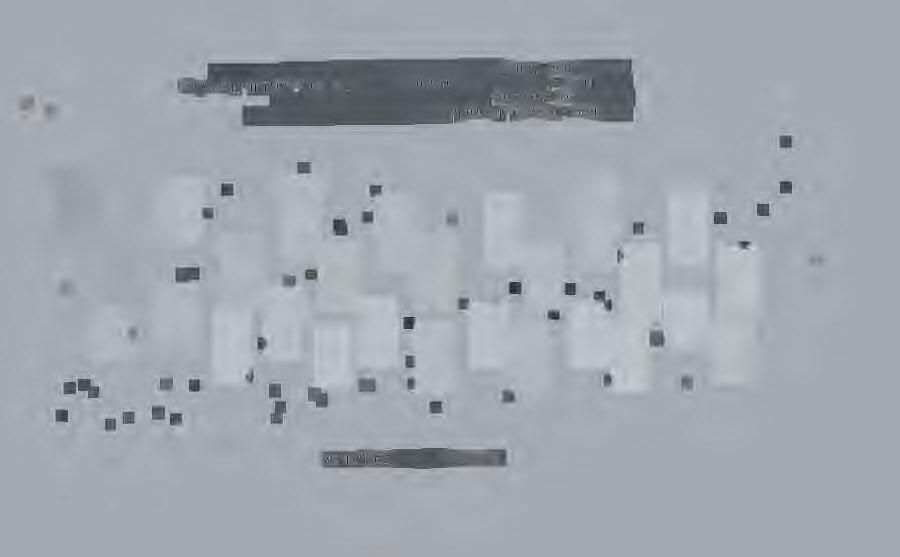
T op R ow-Ha rwod , Bernard, Acre, Colen , Reed , Peiz se r Davis .
Second R ow-Gibbon s, Ricord, White, Boltz, Brewer, Bux.
Third Row-J o rd a n, Adams, Er s kine , Ferrier, Calvert, Ansdell, Browning.
Bo ttom R ow-H ilt z, Apitz, Caton, Lytle, Smith , Frizell, Bondurant.
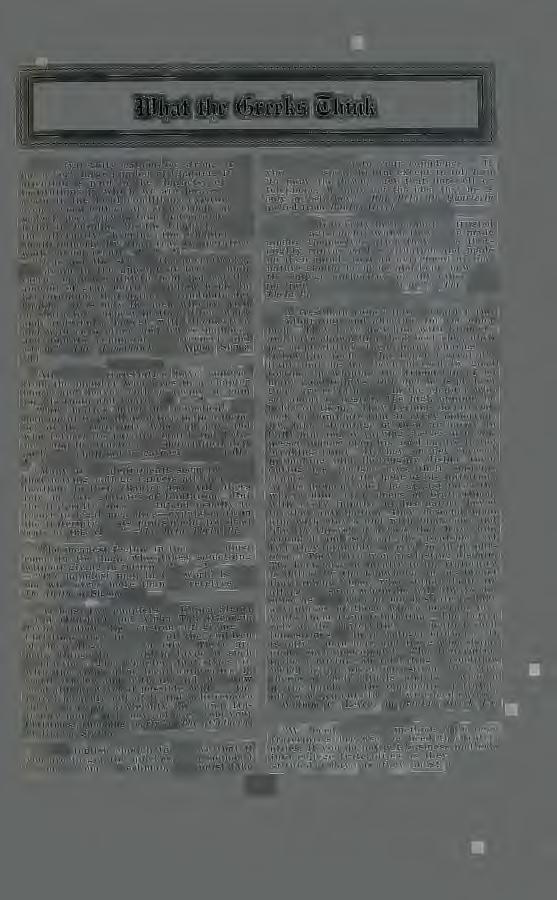
II"The fraternl ty cannot be strong If It has a very large number of Chapters if no attention Is paid to the character of the Institutions in which we are located, nor again if the local conditions existing in even a good college are so overdone as to make it necessary to take undesirable material In building up the Chapter, or in the alternative keeping the Chapter so small numerically that real co-operative work cannot result. • • •
"It Is not the size of the pocketbooks, nor again in the amount of beef a man carries upon the athletic field, nor yet the amount of gray matter a fellow holds In his caranium, that makes a candidate desirable. It Is on l y the men who are rich In character, earnest in their life's work and ambitions, honest with themselves and with each other, and whose manners and mora l s command our r es pect and esteem. "-The To1nahawk of Alpha Sigma Phi.
"All of the fraternities have suffered from the member who lives in a chapter house and leaves college owing a sum for his room and board. • • •
"This matter must be remedied. No man ought to be allowed to remai n a member of the fraternity w h o can pay and who refuses to pay for board and l odgings, and the trustees are determin e d that such men shall not be carried on our ro ll s. • • •
"Many of t h e de li nquents seem to t h ink that leaving college cancel s all their obligations to their chapter and still others rely on state statutes of limitation. But the fraternity does not intend usually to resort to l egal measur es-expulsion from the frat e rnity is its punishment for dead beats of this class."-The Beta Theta Pi.
"The mean est feeling i n the wor l d must come to the man who takes something without giving In return • • •
"The happiest man In the world is the one who gives more than he receives."The Delta of Sigma Nu
"At least two chapters of Kappa Sigma -Chi (Purdue) and Alpha T au (Georgia Tech)-follow the custom of giving a Christmas tree to some of the children of the college town or city. There are many things to be said in favor of such a practice. The Chapter that tries it, with the counsel of local authorities In social se r vice and with t h e aid of a few good alumni wives if possible, will get the purest pleasure out of it and h e lp remove fnlse Ideas of fraternity life and fraternity men. It is not too lat e to do your Christmas shoppi n g early."- The Oaduoeus of Kappa Sigma. -
"1 am foolish enough to believe that it you are to get the qulcl<est artd soundest response from a freshman, you m u st take
him somewhat into your confidence. If you never speak to him except to tell him ' to mow the l awn,' 'get that doorbell or telephone,' he may get the id ea that h e Is only a bell boy ."-PM Beta Pi Qua1·te• ly quoted from Bantas (}l-eek Ea:ohange.
"If the fraternity m e n cannot be trusted to ke ep agreements which they have made among thems e lv es after th ey have thoroughly canvassed the situation and madt> up their minds that an agreement of that nature should be made and kept , how car• the college au thor! ties or any other people put any trust in th e m." -The Beta Theta P i
"A freshman comes into a chapter full of admiration and affection for the older men. They have met him with kindness and have shown him th eir b es t side, until he, appreciating their many charms or fellowship, feels in his heart a great delight that he has been blessed by good fortune in winning the friendship of so many good fellows. But once )1e is pledged there are certain men in the chapter who set about to destroy the high opinion he holds of them They become dictatorial, see]{ to humiliate him at every opportunIty, take advantage of their authority to bully him and by varying species of m ea nnesses impose upon his g ood nature to the breaking point. If they do not succeed In making him thoroughly dislike th e m during his pledge days, their supreme chance comes at the hour of his initiation At the moment when he at last faces the widely flung open doors of brotherhood, with every impulse of his nature keyed to g l ad anticipation, they descend upon him with staves and with bludgeons and like tt.e thieves of Jerico, they leave him wound e d and sore at the roadside . At l ast they probably succeed in their purpose. They have won his l asting disdain. The keen edge of l oyalty to his fraternity is dulled by the knowledge in his breast that among those who stand about Its altars are some whom he will always despise as men who do not hesitat e to tak e a dvantages of those whose position prevents th e m from r e taliating. The better side of the fraternities are against such impositions on their youn ge r brothers. It is only a man here and there who champions such misconduct. The fraternities make a mistak e in tolerating a condition which is in direct opposition to every theme of the i r rituals, and is a weapon in the hands of the opponents of fraternities , which cuts lik e a two-edged sword."
-William C. Levere in Bantas Greek FJa:ohange.
"We n eed business m e thods in college fraterniti es because we need the fraternities. If you do not put business methods into college fraterniti es as they are constituted today, as th ey must meet the
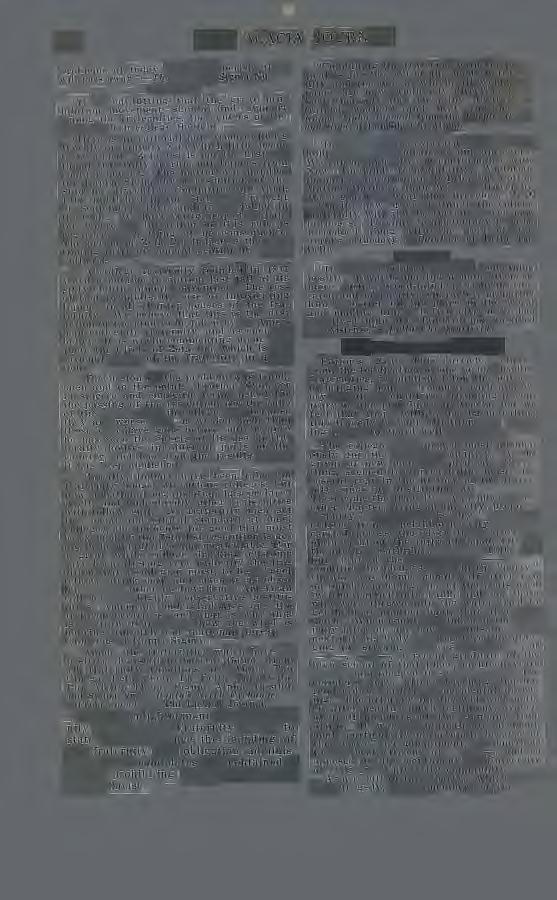
problems of today , they will perish. they will pass away."-Tite Delta of Sigma Nu.
"It is but fitting that the great prohibition movement should find support among th e frat e rniti es, the centers of the most mod er n college thought.
"Here is an editorial note from Collier's Weekly of January 8 to which little needs to be added. Z e ta Psi Is not the first national fraternity to rule out liquors from chapter houses. The matter was handled for Kappa Si g ma by a resolution of the Supreme Executive Committee in April, 1911 , published In the Star and Crescent of September, 1911, and to be found in the Code. We have yet to hear of a Chapter where an infraction of this rule is re garde d as a thing of no consequence. The action of Z e ta Psi indicates the continuing drift of general sentiment. Says Collier's:
"'A c ollege fraternity founded In 1847 voted a notable r eso lution last fall at its sixty-eighth annual convention The resolution prohibits the use of intoxicating liquors in all chapter houses of the fraternity. We b e liev e that this is the first action of the kind to be taken by an Ameri ca n collegiate fraternity, and as such w& believe i t is worth commenting upon. To quote the Circle of Zeta Psi, which is t h e n a tional organ of the fraternity in question:
"'Discussion on the problem was frank, open and to the point. Brother Nymeyer in sincere and emphatic terms asked for the passing of the resolution for the sake of the young men in college, not because they are worse men or weaker men than those who have g one before, but because he has seen the effects of its use in fraternity houses in different parts of the country, and has s ee n the results where it has been abolished.
"'Locally, liquors have b ee n taboo In fraternity hous e s at various colleges, but now a national organization has declared itself, a nd undoubtedly other fraternities will follow suit. As fraternity men set the social and e thical standard at most colleges, th e influ e nce for good that must be exerted by the Zeta Psi resolution is going to be cumulative and incalculable. For a great while college drinking customs have been altering very radically the tradition that a collegian must, to be a "goo! f e llow," drink deep and ofte n is as obsolet e as any oth e r medievalism. American co ll eges a re highly co nservative institutions; American undergraduates are the arch-conservatives-and that is why this is a straw that shows how the wind is blowing through our national forest.'Caduceus of Kappa Sigma.
"Amon g the fraternities which have by positive l eg islation barred liquor from all frat ern ity functions are Alpha Tau Omega. Beta Theta Pi, Delta Tau Delta, Phi Alelta Th e ta , Sigma Alpha Epsilon and Sigma Nu.''-Banta's Greek Exchange. -From Sigma, th e Phi Epsilon Journal.
For the enlightenment of the fraternity world Acacia Fraternity wishes to state that ever since the founding of the fraternity the obligation administered to all candidates has contained a clause prohibiting liquor in the fraternity house.
"Combin i ng the fraternal with the practical is the big job of the modern fraternity and the one to which, all worth the name, are now studiously directing their best thought and engaging their best trained workers and best energles."Kappa Alpha Journal from the Purple, Greeta and Gold of Lambda Chi Alpha.
"It is not to be expected that we can hold fast to the ideals of our ancestors. We can no more liv e in conformance with New England respectability, Victorian manners, Jeffersonian politics or Cotton Mather theology than we can travel by stage coach or wear knee breeches. • •
"In the new order of things the college fraternity will also be forc e d to seek new purposes. ·.ro cling to aristocracy is to be torpedo ed along with th e rest of the world 's orthodoxy "-Rainboto of Delta Tau Delta
"If Delta Chi does not do something positive towards making a man stronger, more virile, broad-minded, refined, educated and of positive character, preparing him to better fill his place in the world and making him a better citizen, it has not lived up to its standard nor justified its existence. "-Delta Ohi Quat·terly.
T h e Tr aged y
Editor's Note-This article, clipped from the publication of one of our l ead in g fraternities, is published for th e of bringing home a lesson to each and every one of our chapters. Drinking is contrary to the principles of Acacia, but we feel that there will be no harm calling this tragedy to your attention as a warning to you to guard well your step
The college year opened most auspiciously for the chapter. A fine group of new men was pledged. Everything seemed to for ecas t the most successful year in the history of the fraternity since its institution at Then came the tragedy. A member of another chapter, living in the city, proposed a "party." is "dry.'' Beer was ordered from a neighboring city. It was carried across the river to a grove, in plain sight of the railroad depot, lat e on the night of Saturday, , 1916. All but eight of the members of counting the pl e dges, were in the "parly.' 1 On the way home, about half after two on Sunday morning, one of the boats used by the participants sank, and, as those who w e re thrown into the water tri ed to ge t hold of another boat, that also w en t down. When count was taken of the company later on , one boy was missin g. The n e xt day his body was recovered by dragg:ing the stream. He was --, or ---, ---, a recent graduate of the hi g h school of that place, eighte e n years of age, and pledged to The coroner's jury, after searching Inquiry , r e nder e d a verdict of accidental drowning. The attorney for the widowed mother, after hearing much testimony, exonerated all members of the company from blame. It was an unfortunate accident, made particularly unfortunate becaus e or the "booze" accompaniment, so obnoxious to the best ci tlzens of , and so opposed to the sentiment of University officials and University community. As a result of this "party," which ended in a tragedy, seven members of the
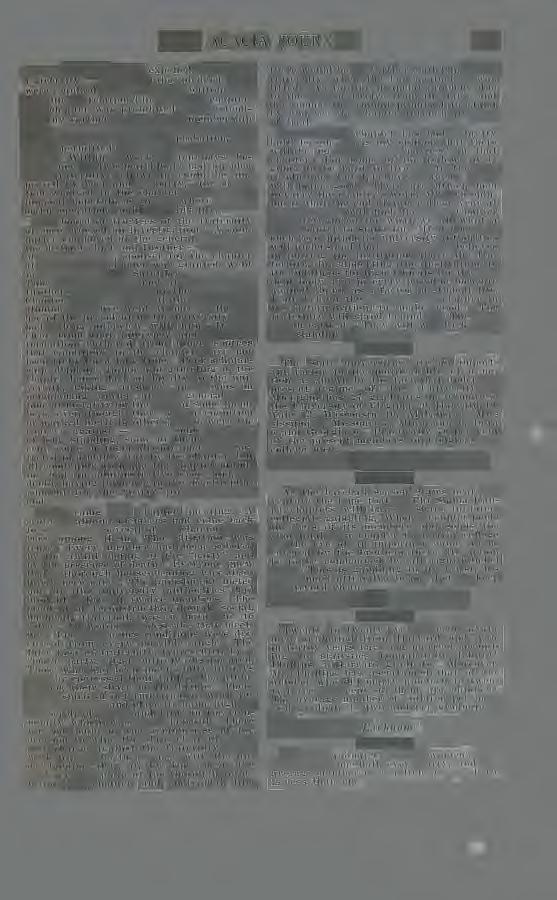
chapter w ere expelled from th e University. Four of the pledged m e n were required to turn in th eir buttons and give up a ll relationship with the chapter. The chapter was prohibited from extendIng any further in vita tion to m embersh ip until , 1917 An eight h m e mber of the chapter was put on probation, not bein g perm itte d to li ve in the chapter hous e . Within a week or ten days, because one or two individu a ls had an id ea that fratern i ty fe ll owship c ould be improved by beer and a "pa rty," th e situation changed in the c hapter from one or unusual hopefu l n ess to one wher e only a major operation could save his life
The board of trustees of th e frat e rnity at once ordered an inv estigat ion. A co mmitt ee composed of the genera l secretary, the district ch i ef and Brot h er , of --, sponser for th e chapte r at the time its charter was gra nt ed , w e nt to on Saturday, . This committee was met at the train by Brothers of the Chapter and of the a l umni. Th e five went a t onc e to th e office of the president of the univ e rsity and had a long int e rvi ew wi th him It was clear fro m that in terview a nd from information gathered from other sources that cond iti ons in th e c h ap t er hav e not been ri g ht for a l ong tim e . Poor scho l arship, drink i ng, liquor and ga mbling in th e chapter hous e, Jack of lo yalty to the university, takin g "r ush ees" to alo ons in neig-hboring towns, and a ge n e ral low tone of morality on the part of som e members, eve n thou g h th ere was r ec ognition of marl< ed m e r it in others; th ese were th e charges aga in st , s om e of them of lon g standing, some of th e m more recent, some of th e m a lr ea dy met a nd corrected in a manly way by the c h apter , but all comb inin g to make the chapte r standing bad, in admin istra tiv e eyes, and , no do ubt, having influ ence in the d r astic punishment for t h e "party" of and--.
Then came the chapter m ee ting. A score Qf a lum ni m e mb e rs had come back to , sev e ral of t h e c h arter mem" bers among them. The situation w as tense. Every memb e r had been sobered by the awf ul e ndin g of th e "pa rt y" and by the presence of death. Everyone knew that a t hor ough hous e - clea nin g was absol utely necessary Th e punishm e nt m e ted out by th e university authorities had brou g ht a lo ss of twelve m e mb ers. T h e problem of reconstruction , moral, social, financia l , fraterna l , was a hard one to solve. No words can d e scribe that m ee ting. For four hours cond i tions were discussed from every possib l e angl e. The false Id ea of fraternity, repres e nted by a "booze party," had ent ir ely disappeared Those who h ad been most gu ilt y in days gone by co nf essed their faults. Th e a lumni too k th e ir share of th e blame. Th ere was a sp irit of determination to work for and p l ace its name high on the sc roll of honor and fame in the community which was most hopeful. There was no doubt of the genuineness of the de lslon to wipe the s l ate clea r of every just charge against the frat e rnity. The wo1·k was to b eg in at once, with the un<l<'I 'S tanding that. if, by Jun e n ex t, the e' td e nce was plain of the thorou g h reformation in chapter and indi v i dual life ,
there would be no further criticism of the fraternity, when the ban against it was li fted. As for th e financial problem , due to the loss of twelve f 1·om the tabl e and the rooms, the alumni promised to stand by and see the chapter throu g h its year of trial.
chapter has had a pretty hard l esso n. It i s my opinion that there wi ll be no mor e "parties" in that chapter. For some of the fe ll ows It Is g oin g to be h a 1d to liv e up to the new r eso l utions, but I believe in them. They will make go o d. The1 ·e are fift ee n m e n to ca rry th e chapter's work. l\ly own opinion is that the end of this co li ge year at will find the Chapter fully recognized for what w e a ll want a chapte r to stand for. If it does win suc h reco g nition the uni vers ity authorit i es will understand that beli eve " in putting th e in st i tution above th e frat ern i ty, in supporting the institution in its a mbitions for hi gher id ea ls for th e student body, and in every possible measure against liquor as a factor in student lif e. I am b e hind the chapter in its det e rmination to make good. The fraternity will stand beh ind it Th e boys are in ea rn est. Th ey will win bacl< th e ir l ost standing at
Th e s t ate universiti es are an importa nt factor in the political lif e of a nation, as shown by th e fact that und e r the present r eg im e of the Un i versity of Michigan h as 27 graduates in Congress, the University of V ir gi ni a 20 , Harvard 19, Ya l e 13 , Wisconsin 10 , Alabama 7, Miss i ss ippi 7, M i ssouri 7, Minn e sota 6, Iowa 6 and Georgia 6. Practically 70 p e r cent of the present m embers of Congress are co ll ege men .
-The Record of Sigma A l pha Epsi l on.
As th e bas e ball season rlraws n ea r, we v e nture the hop e that no Phi Sigma Kappa c h apters wi ll h ave a s h are in int e rco ll eg i a t e gambling. V\fhen a chapter pools th e bets of its m e mbers and sends th e sum tota l to a chapter in a rival co lleg e on the eve of an imp ortant ga m e, to be covered by th e brothers th ere, its action i s to be co nd emned by a ll right - minded men. This is gambling in its worst, because most attractive form. Let us ke e p our record c l ea n.
-The Sign e t of Phi S i g m a Kapp a.
Tw e nty to twent y -fiv e per ce nt of the men graduated from Harvard a nd Yale in forthy years have not man ied, accordin g to statistics compi l ed by J o hn C. Phi ll ips, a H a rvard graduate. Moreover. M1·. Phillips has ascertained that of th e number who did marry nin e t ee n to tw e nty-thr ee per cent of th e m a r e chi l dless. Th e ave r age numb e r of chi ld ren per marri e d graduate is two and per graduate i s one.
-Bantas Greek Ex c hang e.
Of th e graduates of our women's coll eges, on l y on e- half ever marr y, and th e average numb e r of ch ildren per grad uat e is l ess than one.

Nearly all of the chapters have given a great deal of attention to their social life, and we are pleased to note the increasing number of social events.
We believe that social functions are necessary adjuncts to a successful chapter, but at times it seems as if the chapters are of the opinion that they are judged only by their social activities.
The adaptation of the correct social proSOCIAL ACTIVITIES programme to the particular chapter is the problem that must be given first consideration. The proper limitation of social activities is absolutely essential to the successful management of any chapter.
A chapter free from debt can afford to have its regular house partie , dinner dances and formals, but the chapter still struggling under the burden of a debt should see that the members contribute according to their ability towards their incumbrance, a d limit themselves to inexpensive house dances, foregoing the pleasure of the more costly house parties, dinner dances and formals until the time when they can walk past their merchantman's place of business and meet his glance without bowed head.
While on the subject of social activities I might as well take this opportunity of relieving myself of an opinion I have long desired to express.
The fraternities often wonder why the legislatures of various states take it upon themselves to investigate fraternities. We hear uncompli. mentary remarks at times relative to the fraterniEXTRA V AGANCE ties as they conduct themselves in this or that college. Non-fraternity men express their opinions relative to fraternity men and fraternity life, and the distressing part of the matter is the fact that we must, at times, acknowledge the truth of their statements, for they have the facts to verify their criticisms.
A large, expensive, luxurious house does not necessarily indicate a strong chapter. In fact, it is li able to develop in the men a standard of living entirely beyond their means and make the chapter unhealthy It is very apt to make prudes or snobs of a few of the weaker members. The fraternities as a whole are judged by these few men. Luxurious quarters tend also to keep some of the members lounging before the fireplace or around the billiard table, to the neglect of their studies, with the result that the fraternity is misjudged.
There is one method that can bring discredit to the fraternity nearly as rapidly as drunkenness, snobishness, laziness and failure to pass , and that ts extravagance. · 196

No chapter can afford to spend five hundred dollars on a dance, I care not even if your membership is made up entirely of multimillionaires, or if one member bears the entire expense. The effect on the students and the college community is the same. The world today frowns upon extravagance and waste, and a five hundred dollar dance is an extravagance which the legislators have every right to investigate. This unlimited fraternity rivalry with "dad's cash" is one of the best methods to eliminate the college fraternity.
I might as well, while in the preaching mood, continue along a similar line of weakness prevalent among fraternity men.
The habit of borrowing is so common that one does not expe<;t to find his rain coat in his closet when he needs it, unless perchance he saw the cloud coming first. I have, on more than one BORROWING occasion, found if necessary to collect my evening clothes from five different rooms. However, I make this statement without regret, for it has seemed to help develop a more intimate brotherly friendship.
There is another form of borrowing common among fraternity men that does not foster that same feeling. Money is a necessity to a good time, and there are bound to be times when the expected check will not arrive. You will remember in these times of distress that "Jack" has just received hi s, and a "touch" with the desired results is easily made. It comes easy, and the following night you decide that "Bill" is the same sort of a "good fellow.!' When the check finally arrives the rent and the board are due, and you find, with a little simple arithmetic, that you are going to be short towards the end of the month. The fraternity carries you for a part of the board, and you avoid " Jack" and "Bill," with the result that in a short time a peculiar estrangement has come into your friendship, which does not assist in the furtherance of brotherly love.
Borrowing is an easy rut to fall into, but it is no small matter to successfully guide your financial car back onto the road again when you are once in. It is much easier to avoid the rut in the first place and save yourself a difficult piece of maneuvering.
There is one publication, above all others, that should be in the hands of every fraternity-man, a publication edited in the interest of the fraternity-man and worthy of the support of every Acacian.
This magazine contains every item of interest to the fraternity world and is a necessity if one wishes to serve his fraternity to the best of his ability.
The best service can be rendered by the best informed member of the fraternity, by the man who knows not only what Acacia is doing, but who is posted equally as well on the activities of the other fraternities; by the man who understands the opinions of the most prominent members of Acacia , and who has studied the views of the most noted writers of other fraternities.
There is but one magazine containing all of the news ·necessary for a complete, broad view of the fraternity situation, and that is Bantas Greek Exchange.
If you cannot afford to subscribe, at least see that the chapter does, and then take advantage of your opportunity.
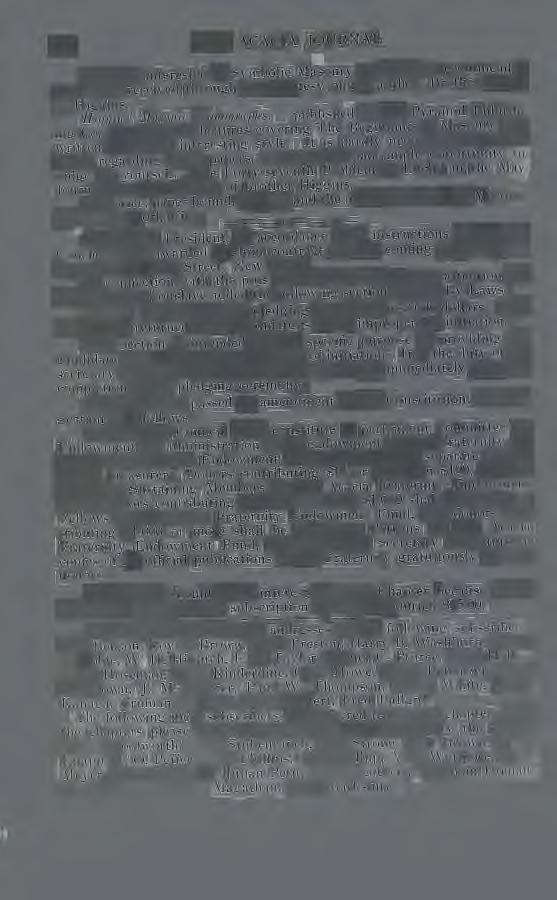
To those interested in Symbolic Masonry we wish to recommend a new book, received through the courtesy of the author, Brother Frank C. Higgins. . . . Higgins' Masoni c Monographs, publtshed by the Pyramtd Pubhshing Co., is a series of lecture s covering Beginning of Masonry _and written in a most interesting style . It ts hardly necessary to go mto detail regarding these papers, as you have had ample opportunity to judrre for yourself. The Forty-seventh Problem of Euclid in the May J was from the pen of Brother Higgins.
The price, paper bound, is $1.50, and the address is Box 112, Masonic Hall , New York City.
The Grand President, in accordance with instructions of the last Conclave, has awarded the pin contract for the coming year to J. F. Newman, 11 John Street, New York.
In connection with the pins it is well to call to your attention the fact that your Conclave added the following section to your By-Laws:
" Sec. 6. There sha ll be a pledging fee of eight ($8.00) dollars. This fee shall be returned if the candidate is found improper for initiation."
This section is intended for the specific purpose of providing the candidate with his own pin at the time of initiation. It is the duty of the secretary to collect this fee and remit for the pin immediately upon the completion of the pledging ceremony.
There was also passed an amendment to the Constitution, Art. IV, Section 3, as follows :
"The Grand Counci l shall constitute a permanent committee on Endowment for administration of all endowment for this fraternity, all funds known as the Endowment Fund shall be held separate by the Grand Treasurer. Donors contributing $15 or le ss than $100, shall be known as Sustaining Members of The Acac ia Fraternity Endowment Fund; donors contrib utin g $100 or less than $1,000 shall be known as Fellows of the Acacia Fraternity Endowment Fund, and donors contributing $1,000 or more shall be known as Patrons of the Acacia Fraternity Endowment Fund, and the Grand Secretary shall furni s h copies of all officia l publications of the Fraternity gratuitously to such donors."
This clause should be of interest to every Chapter because of the fact that it makes the life subscription rate to the Journal $15.00.
The editor would like the addresses of the following s ubscriber s : Earl Benson , R oy E. Brown , L. K. Preston, Harry B. Washburn , Edwin C. Dobie, W . H. Hilditch, F. D. Taylor, Homer C. Pearce, E. B. Hall ey. E. M. Haseman, G. A. Kinderdine, G. F. Howe , W. C. Petrinzer, Creed H. Brown , J. M. Croster , Paul W. Thompson , 0. G . \ i\T hite , P. H . Kanaga, Truman C. Huff, G. W. G ilbert , Fred Ballard. The following men , subscribers , are not credited to any chapter. \Viii the chapters please claim the credit due them and notify the edit o r: Vv. A. Woolworth , A. V. Stubenrauch , B. I. Strong, D. J. Br o wn, \i\T . . Knapp , H. 0. Peffer, A. G. Phillips , 0. E. Gallup , A . V. Wetmore, 0. V . Meyer, James Bond , Dr. Julian Petit , C. S. \ i\T eath e rill , William H o man . Wm. R. James , W. C. Magathan , 0 E. Bark hire .
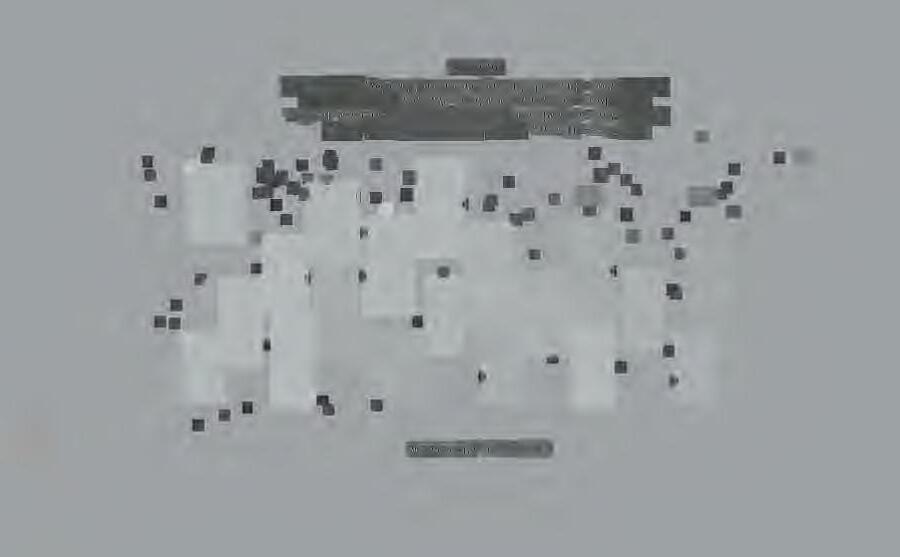
Top Row-Havens, Suiter, Nash, Flegel, Day, Funk.
Second Row-du Buisson , Tilly , Massy, Gage, Emerson, Jenkins .
Third Row-Alexand e r, Cushing, Andrae, McVetty, Hand .
Bottom Row-Deatrick, Strong, Richmond, Bradley, Repp, Dynes. 1915-1916
Stanford
Jam es G Marshall is reported engaged to Miss Adene Guber of Oakland , Calif. Mr. Marshall is attorney
Michigan
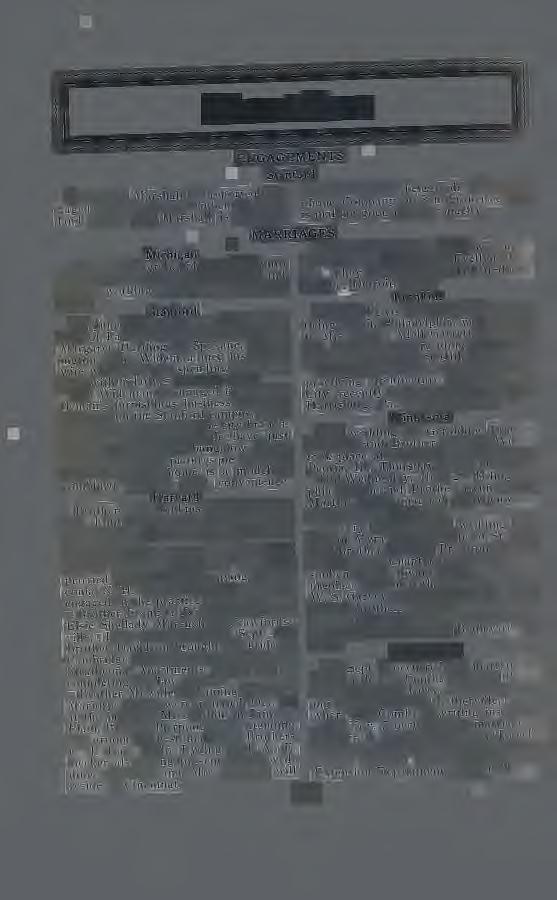
for the Pacific Telegraph and T e lephone Company of 'San Francisco a nd is making good in this capacity.
Brother Walter B. Johnson took unto himself a wife during the summer and is now working for the city of Flint, Mich
Stanford
On June 8th of this year, Otto Wideman of Palo Alto was married to Mis s Margaret Harding of Spokane, Washington Mr. Widem a n met his future wife while she was spending her vacation with relatives in Palo Alto.
Mr. Wideman is engaged in the gentl e m a n' s furnishings business and runs th e store on the Stanford campus, while his father has charge of the city branch . Th e newly married couple have just mov ed into their new bungalow, which is loc a ted in the picturesque town of Palo Alto. The home is a model of combined beauty and convem e nce .
Harvard
Brother A. A. Jenkins and Miss Marjori e Flint Thomas of Warren , 0 ., were m a rri e d Apri l 24 and are li ving in Cambridg e.
Brother T. S. Jewett and Miss Marion T. York of Exeter, N. H ., were m ar ri ed June 29 and are li v in g at Lac onia, N H ., where Brother Jewett has engaged in the practice of l aw.
Brother Frank G. Davidson and Miss El s ie Shellady Marshall of Cr aw fordsv ille , Ind ., were married Sept . 19. Brother D av idson brought his bride to Cambridge and they a r e living at th e Strathcona Apartments whil e he is co mpleting his law cours e.
Brother Melville D. Liming and Miss Ma rjorie Odlin were married Oct. 21 at th e hom e of Miss Odlin, in Jamaica Plain, Brother Pierpont Blair attending th e g room as best m a n and Brothers C. J Gale, Otto Lyding and A. E. Becker a l so being pre se nt at the wedding. Brother a nd Mrs . Liming will r eside in Cincinnati
Brother Thuman C. Huff was married on Nov. 11 to Mi s s Evellyn Morris. · They will reside at 119 Medbury avenue, Detroit, Mich.
Brother Lewis H. Kirk, who is practicing law in Philadelphia , was m a rri ed to Miss Laur a Adell Garrett of Media, Pa . They are now residing at 310 Riverview avenue, Drexel Hill, Pa
B r other Charles L. Yoder, who is practicing archit ec ture in New York City, recently married a young lady of Harrisburg, P a., hi s home town.
The wedding of Geraldine Frances Peterson and Brother Roy H. Wilcox took place at the home of the brid e in Peoria, Ill., Thursd ay, Nov 30, 191 6.
On Wednesday, Nov. 29 , Hilma Sophia Tlaten and Brother Lynn Ulm er M a rtin were married at Glenwo od, Minn ., where both liv e.
A v ery pretty home weddin g was that of Myra Louise Foote of St P aul and Brother Donald Bramton P a lm er of the Ames Chapter. The vows were spoken in the living room b efore tht! fireplace banked with flow e rs Brother W. S Garvey was best man and a number of brothers of this chapter were guests. Dr. and Mrs . Palm e r are now a t home on 796 Como Boulevard, St. Paul.
On Sept. 6 occurred the marri age of Brother R. A. Combs to Miss Bessie Vass at Eldon , Iowa. Th ey are making their home in Esther v ille , Iowa, where Mr. Comb s is wr itin g in surance. On N'Ov. 7 occurred th e marria ge of Brother J. C. Cort to Miss I sabelle Frasche at the hom e of the bride at Am e s. Brother Cort is in the Dairy Exten s io n D e p a rtment o f the C o ll ege
Harvard
Brother and Mrs. C. J. Gale announced the birth of a daugh t e r last Apr il.
A son was born to Brother and Mrs. L. L. Duxbury on June 14.
Franklin
Announcement has be e n received of the arrival of a litt l e "strange r " at the home of Mr . and Mrs. Guy L. Cook , New York City
Born to Brother a nd Mrs. Harry T Cubbe rl y on the lOth of September, a son.
Michigan
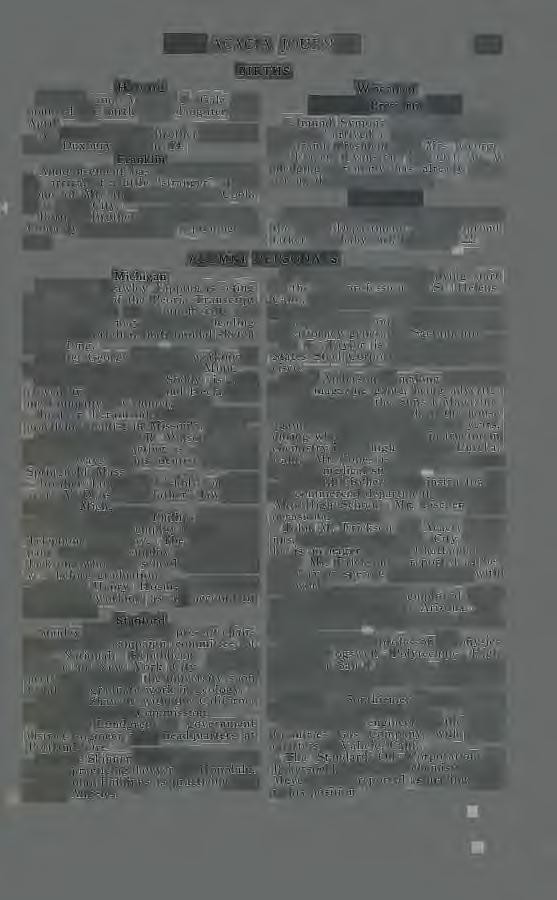
A Grand President Born
Edmund Symons Frazer, a n "eightpounder," arrived at the home of forme r Grand President a nd Mrs. George E. Frazer, Evanston, Ill., Oct. 3. A pledging c e r e mony has already been arranged for an early date.
Ex-Venerable Dean R. E. Smith of the Soil s Dep artme nt is the proud father of a baby gi rl , born Oct 22.
Brother T Hawley Tapping is acting as c ity editor of the Pe oria Transcript in Peoria, Ill. It is unofficially reported that he may a l so act as l ead i ng 1na n in an or iginal matrimonial sketch before l ong.
Brother Geo r ge Barnes is working in a Ia w office in or near Wells , Minn Brother Thom as P. Soddy is emp loyed by the Calumet and Hecla Mining Company in Ca lum e t , Mich.
Brother Ferdinand Dr a tz i s now a practicing dentist in Missoula, Mont.
Brother Herbert R. Wilson is a lso pulling t ee th and ac ting as assistant in var ious ways to his dentist uncle in Springfie ld , Mass
Brother James K. Nichols, our last year's V. D ., is in his father 's law office in Ionia, Mich .
Brother Harold I. Phillips is in Detroit, M i ch., in the emp loy of the Home Telephone Company. The sa me company h as in its emp l oy Brother C a rl Ja ckso n , who l eft schoo l last June a year before graduation.
Brother Henry Hosmer is in Salt Lake City working as an accountant and a uditor.
Stanley C. Herold is a:t present chairman for the campaign committee of the National Republican College League in N 'ew York City. He expects to be b ack in the uni ve r sity soon to take up grad uat e wo rk in geo lo gy.
Carl R. Shaw is wi th the Ca lifornia River and Harbor Commission
Leonard Lundgren is government district engineer with headquarters at Portland, O r e.
Charles Skinn er D avis is a very successfu l practicing l awyer in Honolulu.
Raymond Phillipps is practicing law in Los Angeles.
P. 0. Solon ha s made a flying start in th e l aw profession at St . Helens, Calif., and look s forward to a successful career.
F. Bertram Wood is in the office of the attorney general at Sacramento.
L. E . T ay l or is with the United Stat es St ee l Corpor a tion in San Francisco
R. E A nderson is m a king a success in the magazine game, b e ing advertising m a nager for the Sunset Magazine.
J Walter Jon es is b ack in the house aga in af ter an absence of two years, during which tim e h e was instru c t o r in chemistry in th e high school at Eureka, Calif M r J ones is a very bu sy man with his medic a l studies.
Marshall Fischer is an instructor in the comme r cial department of the Palo A lto High School. Mr. Fischer is a n occasional visitor .
J ohn M. Erickson, an Acacia a lumnus, i s living in Salt Lake City, where he is manager of the Chattaqua circuit. Mr. Erick so n is r epo rt ed as being very prosp e rou s and contented with his work.
George B : Lyman is employed at the Copper Queen mine in Arizona. Mr. Lyman was a r ece nt vis it or at our h ouse.
Harry Fore is professor of physics at the Cogswell P o l ytechnic High School in S an Francisco. Mr. Fore has v is it ed w ith us severtl times the present semester.
Urban A. Sonthiemer is now Justi ce of the Pea ce in San Jos e
L. Bussert is e ngineer for the Co ast Countries Gas Company, wit h h eadquarters at Vallejo, Calif
The Standard Oil Corporation a t Bakersfield has for its chemist Arthur Meyer, w ho is repor t ed as making good in his position .
Andrew N. Mackenzie is employed as geologist for the Continental Gas and Oil Company at Albany, Texas. He expects to be in Stanford again next semester.

O hi o S tat e
"Beanie" Groner has accepted a position with the Atlas t:ar & Mariufacturing Company of Cleveland, Ohio.

Mr. W. J. Meas has tendered his resignation as Dean of .the College of Medicine of the Ohio State University, to take effect on July 1. He will be succeeded by Dr. E. F. Campbell.
John M. Strait, graduate assistant in the department of physics, has accepted a position with "The Electric Journal," with headquarters in Pittsburgh. He has already left school to assume his new dutie.s.
P. A. Davis has been appointed as house physician to the Children's Hospital for one year, to begin with the closing of the school year.
T. E. Rees is connected with the East Side Real Estate Company in Akron, Ohio.
C. W. Hall, Yale, is engaged in real estate business in Columbus.
Professor Clyde 0. Ruggles, Ohio, has been appointed secretary of the new College of Commerce and Journalism. He has also been invited to give courses in Transportation and Insurance in the University of Chicago during the summer quarter of 1916.
Ha rvard
Brother Phillip B . Kennedy is on a leave of absence from New York University School of Commerce and is acting in the capacity of United States commercial attache for Australia and New Zealand His address is Equitable Building, Melbourne, Australia.
Brother S. R. Carrington has been transferred from Springfield to Boston and now has charge of the Boston office of his firm. Brother and Mrs. Carrington are living at 40 Irving street, Cambridge. ·
At a recent meeting of the Episcopal church dignitaries at Helena, Ark., Brother George K. Cracraft was elected trustee of his alma mater, the University of the South, more commonly known as Sewanee.
Brother Truman C. Huff is secretarytreasurer of the Nat ional Lumber and Manufacturing Company, in which concern he holds a third interest.
Brother J. K. Benton is studying law at the University of Wisconsin this year and is living at the chapter house there.
Brother A. E. Becker is an instructor in the Physics department of the university. Brother John C. Bowen is in the law business at Newburn, Tenn. Brother A. R. McMicken is preparing for the Wyoming bar examinations. Brother Paul V. McNutt is practicing law at Martinsville, Ind., at present, being employed as counsel in a large water rights case. Brother T. K. Rinaker has also joined the legal profession, and is located at Carlinville, Ill. Brother L. Bliss Everitt is teaching school in Connecticut. Brother D. H. Stuart is located at Springfield, Mass. Brother Basil Duke Edwards is at West Point. He has been promoted from second to first lieutenant, and while stationed at the Point holds the rank of captain. The engagement of Brother Edwards to Miss Beale, daughter of Professor J. H. Beale of the law school, was announced last June. Brother W. S. Wells is an interne in the Peter Bent Brigham Hospital, Boston,. Brother Lawrence F()gelsong is with the firm nf F. A. Robinson & Co . landscape architects, Boston
Brother Phil R. Clugston is at home at Crawfordsville, Ind., at present but expects to return to the University either for the second half of this year or next fall.
Brother J. M. Broughton was unanimously elected Democratic County Chairman of Wake County, N. C., last April. The Raleigh papers paid a glowing tribute to Brother Broughton in commenting on his election.
Ill ino is

J. K. Moore, Illinois Chapter, is ceramic engineer for the Robinson Clay Products Company of Akron, Ohio. Mrs. Moore is registered in the Law College of Ohio State.
F r ank lin Chap te r Franklin Chapter has two of its members "On the Border." They are Wm. F. Guilfoyle, Jr., Med. 'OS, and Frank B. Baird, Med. '07. An effort was of the Medical Corps. An effort was made to have letters from these two surgeons appear in this issue, but due to the strenuous work along the Rio Grande, we are deprived of a literary treat .

Doctor I. Warner Knight, Dr. P. H. '15, has accepted a position with the Public Health Department of New Jersey. He is located at Trenton. Professor J Raymond Fitzpatrick has discarded his motorcycle for a Studebaker
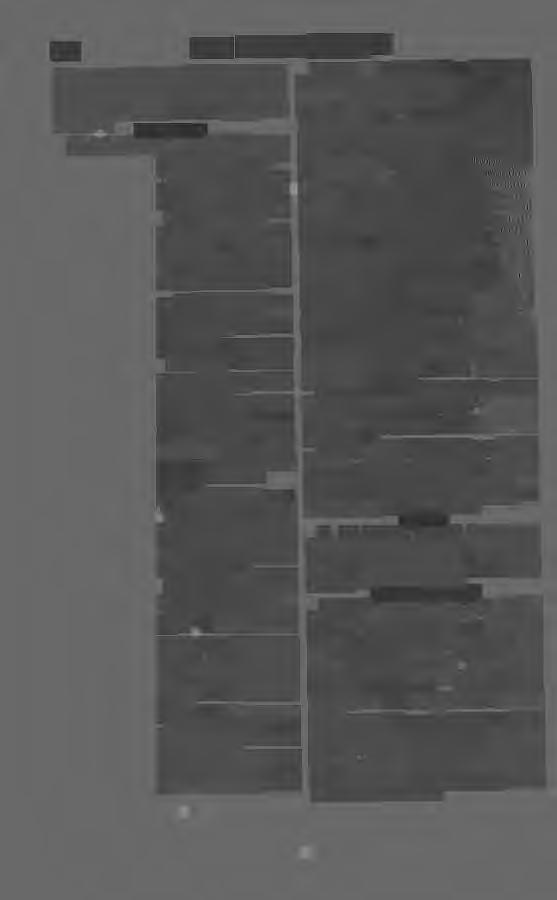



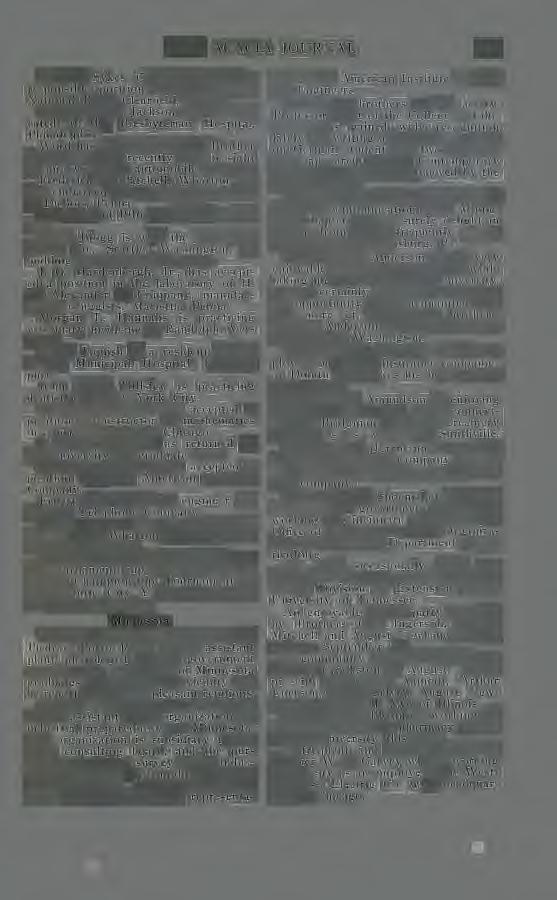
L. Blair Syke s, Chern. 1912, holds a re spo nsib l e position with the County National Bank, Clearfield, Penna.
Doctor Ernest Jack son Steves is l ocated at the Presbyteri an Hospital , Philad e lphia.
\ N ord ha s been received that Brother Ca ss ius E. Hiatt r ece ntly lo s t the sig ht of an eye in an a utom o bil e acc id e nt
Frederick E. Patchell, Wharton ' 13, has em b a rked in the grocery bu s in ess at DuB ois, P e nna.
The Class of 1916 are loc ate d as follo ws:
H. A. Blogg is with th e Aero Fire Alarm Co ., Seattle, Washington, as building surveyor an d estimator.
J. G. Hard e nbergh, Jr ., h as a ccepted a position in the lab oratory of H. M. Alexander & Comp any, manufacturin g druggists , Marietta, Penn a.
Morgan L. Hannahs is practicing ve terinary m ed ic in e at Randolph , Vermont.
F. M. Jaquish is a resid e nt d en ti st at the Municipal Hospital, Philadelphia.
John Jacob Hillsley is practicing dentistry in New York City
Forrest E. Ada ms h as accepted a position as in st ru c t o r in mathem a tics in a private sc hool in Chicago.
J. L es ter Armour h as returned to the University for grad u a t e work.
Wilbert C. Cornell h as accep t ed a position with the Amer ic a n Radiator Company.
Ernest C. Drew is an e n g ine er for the Bell Te l ephone Company.
D. B. Jeremiah i s a n in st ru c t o r of finance in th e Wharton School of Commerce a nd Finance.
Bro ther Forrest E. Adams aga in won the tournament cup in singles a t the Tennis Championship Tournament of the At la ntic City Yacht Club during th e month of August.
Minn e s o t a
Brother R. C. Rose is loc a ted at Rio Piedras, Porto Rico . He is assistant plant phatologist in th e government service there. A numb e r of Minnesota graduates are livin g in his vicinity and he reports some very pleasant reunions
Brother A. C. Oberg has been named as field assistant in th e organization for industrial preparedness for Minnesota. The organization is subsidiary to the nava l consulting board , and the purpos e is to make a survey of the industries of the state that might be utiliz e d in case of war. Brother Oberg will assi t in this work as a representa-
tive of the American Institute of Mining Eng in ee r s.
On e of ou r brothers on the faculty, Professor Swift of the Coll ege of Educ a tion , has gained wide recognition late l y for writing a number of a rticles on German s tud ent lite, two of which have appeared in the Contemporary R ev iew and have b een reviewed by the Londo n Times.
Brot h e r Luther Wood Parker is in constant communicatio n with Minnesot a Chapter and we s ur e l y d e li ght in hearing from him so frequently. He is now located at Harrisb ur g, Pa. ·
Brother F. W. A nd e r so n spe nt a very enjoyab le week wit h u s thi s fall while taking medical work at the University . We are certainly very glad t o have had the oppo rtunity to get acquainted w ith one more of our a lumni brothers. B r ot h er Anderson makes hi s home at Sout h Bend, Washington.
Brother W. R. Mitchel is in the employ of one of the in s uran ce compan ies at Duluth and m akes hi s h ome a t the Y. M. C. A.
Brother Oscar Amundso n is enjoying married life at Duluth He is connected with Bridgman & Russell Creamery and spe nds hi s even in gs at Smithville.
Brother R. R. Herrmann is now with the Gene r a l Electric Company at New Yo rk City and is doing very we ll w ith that company.
Brother R a lph Shoemaker is in the serv ice of th e government a nd is now wo rkin g at C i n c inn a ti, Ohio, with the Office of Mark e ts and Rural Organizati on division of the Department of Agriculture
Vv e h ea r occasiona lly from o ur B r ot her C. E. A llr ed who is now head of th e Divisi on of Extension at the U niver s ity of T e nn essee
An e njoy ab l e dinner party was had by Brothers Guy Ing e rsoll , W. R. Mitche ll and August Newbauer at Duluth on Sept e mb er 20.
A commu nity Acacia n reuni on was h e ld a t Crookston in August. Those present were Arne Aamodt, Arthur Enerson, C. G. Selvig, August Newba u er and Lynn J. Nye of Illinois.
Brother Oscar B losmo is working for a doctor's degree in pharmacy at Columbia University this year.
A frequent and welcome visitor is Brother W. S. Garvey who is working in thi s c ity as an emp loye of the Westinghouse Electric Co. with headquart e r s at Chicago.
During M E. A Week, Brother Arlington Sandt of Birchdale, Minn., stayed at the house. He plans to come back next year to finish his undergraduate work.
Brother Nye of the Illinois Chapter dropped in Dec. 3, on his way to Chicago He is managing a large farm at Crookston and had as one of his assistants last summer Brother August Neubauer.
Another Illinois man whose company we are enjoying is Brother H . H. Busse of the Symphony Orchestra . He is living with us while Mrs. Brusse is away visiting.
Brother ]. H. Gammell is at the Border with the National Guard. His present rank is that of First Lieutenant with special duty as staff officer. He is making a splendid record.
Pledge Brother McKay is also at the border in the Second Regiment.
Cornell
H. H. Gill, Cornell, is with the W. C. Mills Company of Columbus, Ohio.
Iowa State
"Hap" Hazzard is back on the farm at Marathon, Iowa. The last reports concerning this fellow were that he wa,s husking corn. No doubt when "Hap" gets going good the air is yellow with corn.
"Howdy" Crouch is doing work with the Dairy Association in the vicinity of Springville, Iowa. We have authoritive evidence that he, in company with Brother McTavish, has taken an active interest in the country schools in the vicinity.
"Mac" McTavish is anothe r "Back to the Farm" member While not cooperating with Brother Crouch in the interests of rural education he does the chores for Dad .
"Bunker" Bean is teaching geology at Cornell University, having received a fellowship from that institution. Never-the-less we are certain that he has an interest at Ames.-"nuf' sed "
"Micky" deWet, the bloomin' bloody Britisher from Cape Town, South Africa, is back in the States after seve ral months spent in England, that is not all either, as he has taken out his first papers to become a Yankee citizen . He is now studying for a Ph. D. in Agriculture at Cornell.
Brother Carhart was with us a part of this fall while engaged in architectural landscape work on the campus. We regret that it was impossible for him to remain longer with us.
"Percy" Prichett returned from New Mexico this fall and is in the Dept. of Physics. Percy is much interested in Illuminating Engineering.
"Bennie" Benton is doi1;1g Soils Survey work at Spencer, Iowa. We expect him back in the near future, when he will resume his post-grad. work
Brother Marion Olson, formerly of the Farm Crops Dept. here , has accepted a position with the Bureau of Farm Crops, Dept. of Agric at Washington, D. C.
"Eli" Whitney is practicing Vet. Med. at his home in Villisca, Iowa Yale
W. E . Schultz, Yale M . A. ' 09, Ph . D ' 15 , has resigned his instructor s hip at the University of Illniois to accept the position of professor and head of the department of English at Christi a n University, Canton, Mo.
William M. Rosenfield , Yale '15 , has been elected to the board of editors of the University of Pennsylvania Law Review .
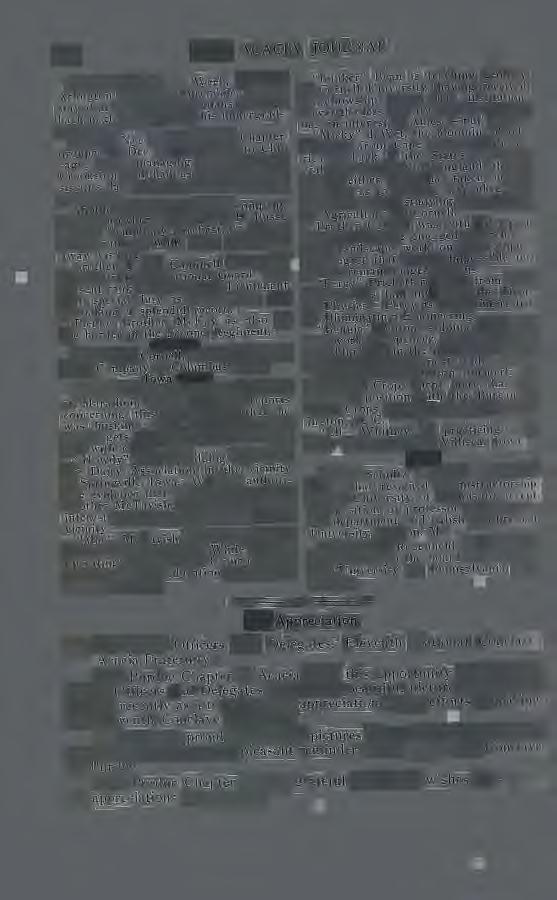
To the Grand Officers
Acacia Fraternity: and Delegates, Eleventh National Concla ve,
The Chapter of Acacia takes this opportunity to thank the Grand Officers and Delegates for the two beautiful pictures which were sent us recently as a token of your appreciation of our efforts in making the Eleventh Conclave a success.
We are very proud to have the pictures in our home and in future years they will serve as a pleasant reminder of the days of the Conclave at Purdue.
The Purdue Chapter is very grateful to all and wishes to express its appreciations of your gift.

"It li es in the west whe n the sun goes down, C r ad l ed by s hinin g mountains of go ld , A nd its gaudy forests are n ever b r ow n , Its m eadows g l eam with a wealth untold, Watered by crimson river of li ght, Th ose sh ining pools now a mystery keepFirst we must hope, th e n l ove, th e n weepMorn can n o t prize th e p l eas ur e deep Of th e beautiful distant valley of s l ee p.''
Floyd L. V an· Wert, M ed 1910, Franklin , one of the best kno w n young physicians of New Cast l e, Pa. , was in sta ntly killed while crossing a r a ilr oad tr ac k near hi s h o me in the ear ly part of Septemb er. Brother Van Wert was a Past Venerable Dean o f Frank lin Ch a pter. He i s s ur vived by hi s wife, Mrs. F l oss i e F. V a n Wert; also hi s parents
"Hope comes a n d with whisper sweet T e lls of a l a nd far away. Where the sun shall n eve r set, Th e l and of e t e rnal day, Where we shall m ee t again Th e friends we lov e d of yo r e; Wher e partings are unknown And farewells said no more."
Harry T Horn , Med. 1910, Fr a nklin , o f New P a ri s, Pa , h as answ e r ed the "s umm o ns to join th e innum e r ab le ca ra va n th a t move s to the pale re a lm s of shade."
" 'Shall man be l ef t forgotten in th e dust When fate, rel e nting, bids th e soul r ev ive? Shall nature's voice, to man a lon e unjust, Bid him, th o ugh doomed to perish , hop e to li ve? No! Heaven's immortal spring shall yet ar i se, And m a n's majestic beauty bloom aga in , Safe throu g h th e e t er n a l yea rs of l ove's triumph a nt reign.'"
G eo rge R. Lord, L aw 1913 , Fr a nklin , who was th e Assistant Distri c t Attorney of his county, pa sse d away in September at his home in Mount Carm e l, Pa
""For beyond this world a rest r e m a in e th , Even so-a rest b eyo nd it allWher e no pains assa il , no partings sadden, No tears fall.' "
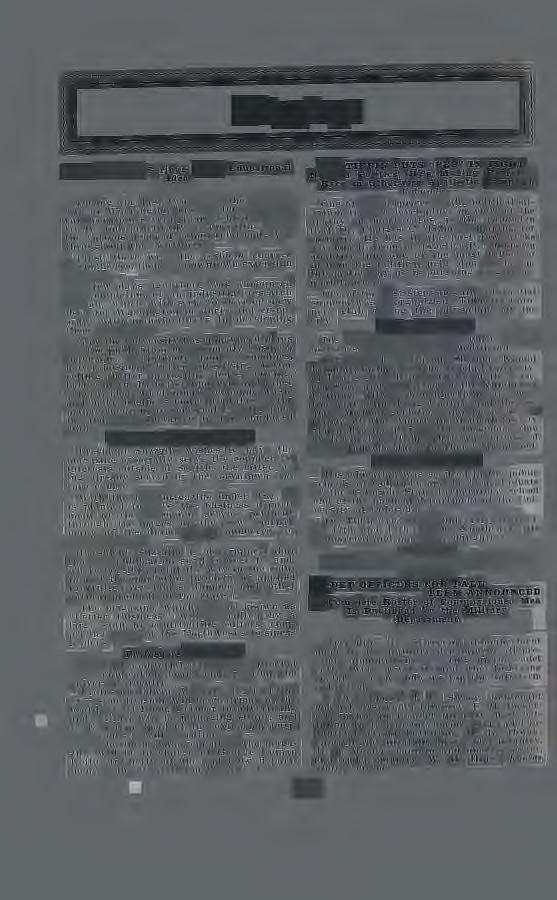
Pres Suzzallo Springs New Educ a tional Ide a Col-umbia
During th e last two years th e University of Washington h as put into successful op e r a t i on several plans which are actively and practically co - operating w i t h the various fields of commercial endeavor throu gho ut the Northwest
First, th e r e w e r e th e resident courses in commerce, then the downtown extension courses.
A few days ago th e re was announced the c ompl etio n of an industr i al r e search bureau, which will seek to d evelop new us e s for Washington products and co-operate with manufacturers in developing these resources.
Now th e univ e rsity has announced plans for the publication of a monthly business m agaz in e, to promote home economics, better business, better advertising , better se lli n g , b e tt er marketin g , b e t ter buying, b et t e r methods, better financial and other ge n e ral ideas to eliminate economic waste and m a k e busin ess more profitable to the mana ge m e nt, more serviceable to the public a nd mor e lucrative to the employed ,staff
Commerce Besea.rch Work
President Su z za ll o wishes to have th e ma gaz ine especiall y serve the commercial interes ts outside of S ea ttle, the latter being a l r e ady served by the downtown lecture course.
With the new magaz ine und e r way , i t i s planned to have the business department of the extension servic e perform, through the pages of the new journal, many of th e duti e s of a comm e rc e researc h bureau.
President Suzzallo is determined that th e n e w publication sha ll co-op e rate , and, wh ere possible, point the way in th e so l ution of th e marketing prob l em, as applied to fruits, v egetab l es, lumb e r and oth e r natur a l products of th e state.
Th e magazi n e, wh i ch will be known as "B et ter Business," will be edited by a lar ge staff of contri butin g e ditors, comprising many of th e Northw e st 's busin e ss l e ad e r s
Professors in Charge
Th e e nt i re e d i toria l s t aff w ill be directed by a publication board chosen from t he univ e rsity f ac ulty
Professor Edwin A Start, head of the extension div i sion, wi ll be chair ma n of t h e board. Carl Bush, lectur e r in advertisin g and selling, will be managing editor, a n d E. F. Dahm, h ead of the extension bus iness courses , wi ll be editor.
The bus in ess manag e m e nt of the magazine will be in charge of Geor ge Roman K e ith, formerly of th e publicity department o f the Washington Y M. C A.'s
DB. TIFFIN PUTS " PEP" IN FIGHT
New in Politi cs, He ' s Making Enerl'etlo Bace in Otherwi se Apathetic Campaijpa Ooloraclo
One of the surpris e s of the political sit· uation that is d eve loping, in view of the apathy in most cases, is t he campaign tha t Dr Charles C . T iffin is makin g for coroner. He has i n the past f e w w ee ks develop e d from a practicall y unknown quantity into one of the most talk ed of men in the political fi e ld , due to the e nth u siastic way he is purs u ing t o gain acquaintanc e s.
One of the first steps to g ain substantial support was to or ga ni ze a "Tiffin for Coron e r" c l ub amon g t he physic i ans of the city.
Dr. Tffiin nev e r ran for office before, and do es not c l aim to be a politician
Dr. Tiffin is a Maso n , Shr i ner, Kni g ht T emplar, m e mber of the Acacia Frat er nit y, of Univ er sity Chapter, Order of th e Eastern Star, and a m e mber of the Kni g hts of Pythias His club connections are with the State, the Kin g County and the Seat tl e Medica l soc i eties, and he is also a fellow of the American M edical Society and a l ife m e mb e r of th e Surgeons' Club of Rochest e r, Minn ., that was organl?.ed at the famous Mayo Bro t hers' stron g hold Colorado Graduate
His education was secur e d in th e public schoo l s of Colorado, and he is a gradua te of the Colorado State Preparatory School and of th e m e dical d e partment of th e University of Co l orado.
Dr. Tiffin lives in the uni ve rsity di s tri ct. at 45th and 14th avenu e Nor th east. He is m a rried and has thr ee daughters.
Tiffin carried by a majority of 10,000.
TEBM ANNOl1liC E D
A Complete Boster of Commissioned Men Is Published bv the Military Department Kansas StC£te
According to a r ece nt announcement m a de by th e military department a ll previous appoin t m e nts ex istin g in the cade t co rps w e r e r evo k ed , and th e following ro s t e r of cad e t officers for the fall term published.
Cadet co l one l , J. B. Sweet; l i e ut e nant colone l , first cadet inf a ntry, F M Pick ere ll ; major, fi r st ca d e t infantry, first bat· talion, K. E. Kinyon ; major , first cadet Infantry, second battalion , H. R Horak; captain and adjutant, first cadet inf a ntry, R. L . Mosi e r; capta i n and qua r terma ste r, first cadet infantry, W H. Hilts.-Kan stu State CollegiO!It
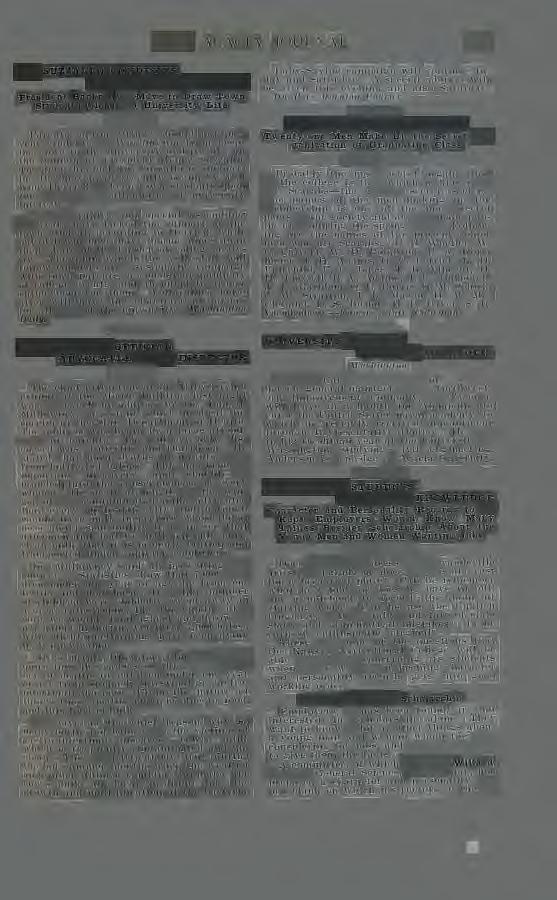
APB.ON STBINGS ON llotEN
Pre•ldent Back• New Move to Draw Town Student• Closer to University Life
Columbia
Parents' apron strings shou ld not prevent students at Washington from keepIng close to the univ e rsity and its life, In the opinion of President Henry Suzzallo . To ertect this end, Dr. Suzzallo is supportIn g the movement rec e ntly be g un by Yell King Herrick to keep town students upon the campus for all affairs of university Interest.
Rooting rallies and special assemblies for yea rs have l acked th e support of the town student, according to Herrick, while out-of-town men have borne more than their share of the burden of college activIty. The plan which the yell start will follow consists of a systematic campaign with town parents, a consistent publicity of college eve nts, and a n eftort to arouse enthusiasm for them . Yell rallies hereafter will have the character of mixers for a ll men of the univ ersity.-Washington Daft!/.
F1·anl,lin
The chief attraction at the Baby -Saving exhibit at the Moose Building l ast night was an exce llent address by Dr. John J. Mullowney. assis tant chief m edica l inspector of the State Department of Health. The address was heard by a large atte ndance of parents. The subject ably discussed was "Enter itis and Diarrhoea." He stated th at most deaths in inf a nts were from bottle-fed babies. This has been an Important discovery and shou ld be branded into the consciousness of every woman . He dealt at l ength on th e danger of the contaminated milk, advocated that every up-to-date city a nd borough should have mill< in spectors whose business and responsibility it is to see that dairymen and dealers shall sell only pure, clean milk, that it Is proper l y bottled and transported under sanitary condit i ons.
Dr. Mullowney said, in presenting the suhject : "Statistics show that 7,000 childr e n under one year of age die from ent er itis and diarrhoea. If a lik e number of children were suddenly swept away in a great catastrophe , like the sinking of a ship, w e would stand aghast and throw up our hands in horror, yet these 7,000 babes, with slight puctuations, have been dy i ng in Pennsylvania.
"Tt is fitting, therefore, for us to inquire into the causes of this great numher of deaths of c hildr en under one year of a.;e from stomac h, Intestinal or gas trointestinal diseases. From the nature of things these deaths must be due to food, and this food is milk."
He gave as the chief reason why so many bottle-fed babies are the victims of gastro-in t e stinal diseases, cow's milk, which is frequently contaminated and unclean. This is particularly true during the hot summer months when the weather and other things combine to make th e cow 's milk an i d ea l medium for th e growth and multiplication of th e bacteria
Baby-Saving campaign will continue today and Saturday. A special address will be g iv e n this eve ning and also Saturday - Du Boi s .lfon•-ing Cou.-ier.
Twenty-one Men Make Up the Secret Organization of Graduating Class Kansas State
Probably th e most secret organization in the college is that which is known as the Scarabs-the senior secret society. The nam es of th e m e n making up the membership is one of the most secret pa•·ts of the society and are not made pub- lic until during the spring term. Fo llowing are the names of the present senior men who a.re Scarabs : P. H. Wheller, W. C. Ca l vert, W. H. Robinson, F A Korsmeier, J. H. Adams, G . C. Ferrier, L. H. Fairchild, E. C. Jones, T. K. Vincent H. H. Frizzell, R. V. Adams, J. L. Garlough, J. P. Ralhbun, 0. D. Burtis, G. M. Schiel<, J. W. Stratton, J. R. Mason, H. M. McC l elland, D S. Jordon, H. B Bayer, S. R. Vaend enb e rg.-Kansas State Collegian.
Wa s h i ngton
Herman Carl Andersen, son of C. C. Andersen, general mana ge r of the orthw es ter n Improv e ment Company, at Tacoma, will l ea ve in a month for Annapolis, to e nter the United States naval academy, to which he r e cently receiv ed appointment through ReJ)r ese ntative Hadley H e was in his freshman year at the University of washington, studying c ivil eng in eeri n g. Andersen i s a pl E' dge of Acacia fraternity.
WILL GUAGE
SENSE AND KNOWLEDGE
Character and Personality Records to Be Kept-Employers Would Know Many Things Besides Scholarship About the Young Men and Women Wanting Jobs
Kan s as State
Does B ill Smith dress like a vaudeville artist on parade or does he use his vest for a breal<fast plate" Can h e rem e mb er what h e's told , or does he have to pull out a not eb ook to record the hour or starting work" Can he use the English l anguage, or is his talk a mixture of sta l e s l ang and grammatical mistal<es" Is he earnest, enthusiastic, oirginal"
These are some of the questions that the Kansas A g ricultural College will be ab l e to answer concerning its students when the new p lan of keepin g character and p e rsonality r ec ords gets into good working order.
Want More Than Scholarship
Employ e rs, it has been found, are not int e rested in scholarship alone . They want to know a Jot of oth e r thin g s about a young man and woman whom th ey are considering for jobs, and th e college aims to g ive them the facts.
A committee, of which Dr. J. T. Willard, Dean of General Science, is chairman, has prepare d a characte •· and p erso nality record blank on which instructors in th e In-

stitution will record their estima t es of students Some thi rt y qualities are enume rat e d on the blanl<. Each teach e r, howe ver, will report only on those which he hao;; had an opportunity to observe. From th e data obtained from various ors, th e college authoriti e s fee l they can g iv e a g ood estimate o f the students.
A Uat of the QuaUtie•
H e re is the list of qua l ities: Altruism, natural ability, technical ability, acc ur acy, common sense, co - opera ti on, courage, decision, disposition, e arnestn e ss, efficiency, e n e r g y, enthsuiasm, imagination, initiative judgment, leadership, memory , moral c hara c t e r, observing power, originality, p e r s onal appearance, practicability, reliability , resourcefu ln ess, scholarship, sense of r e sponsib ilit y, tact a nd courtesy, use of En g lish, versatility.
In addition to getting reports on the students, the co ll e g e authori ti es a im to h e lp the st ud e nts examine themselves as to c haracter and personality. With the h e lp of other m e mbers of the facu l ty th e committee has prepared a leaflet which will be p l aced In the hands of students as f a v o rable opportunity occurs. T h e l e afle t , which is probab l y the most c om pr e hensiv e b l ank for self st u dy ye t prepared, ow e s its e xc e ll ence l arge l y to the painstaking and accurate work of Dr. Willard. - Kansas State Collegian.
C. A. Brewer Will Give Instruction on Wednesdays and Fridays
Kansas Stat e
Beginnin g tomorrow, c l asses in swimming wi ll b e conducted for the men every Wednesday and Friday afternoons fro n • 4 :3 0 to 5:30. Wedn es day will be the day for the adva n ced c l ass and Friday for beg inners.
C. A Brewer, who had charge of on e of th e largest pools in the state last summer, wil l g ive t h e swimming less ons
Instruction wi ll be given the r e st of this t e rm, but no work wil l be gi ven during th e winter term. The work wi ll be t aken up a g ain du rin g the spring.
After the work is gotten under way it is p l ann e d to have water tou rn aments in which e verybody who wishes may participate.
OF UNIVEBSl'l"'ES BETTEB
Finds That Dissipation Loses in Fopularity Among Under-graduates.
ALUMNI HURT A THLETI CS
Too Great an Inclniation to Win at Any Kazard-8tate a Debtor to Cornell.
" The moral tone of our universities is immeasurably higher today than it was twenty-five years ago," said Prof. William Howard T aft, of Yale, in an interv i ew with a Sun r e presentative. "The most outstanding feature of this change Is the r e duction of dissipation . Dissipation is no longer popular, and the man who wastes his time in th is way is no l onge r the t ypica l college man as he was once considered . Today, that type of man
loses his standing I n the college community.
BeUgi ous reeUng Grows .
"Along with this change has come a growth of religious feeling. Organizations ministering to the moral welfare of the student are encouraged, used and patronized. The t ype of man who spent hla time In dissipation h as, in some cases, changed into a pre sent day type, "the college slouch;" he should be done away with.
"Much has been written and said about commercialization and over-specialization in our co ll ege ath l etics. To b e sure, there is danger of too much twentieth century e fficiency entering Into the system But here, as elsewhere, there is action and reaction. Today, we are passing through the 'action' stage, and the reaction Ia c oming.
"In some cases, there is more devotion to ath l etics than there should b e. This should be modified. On qu e stions of athletics, the influence of a lumni Is not a l ways in the right direction. A c e rtain c l a ss of alumni are selfish for th e ir own e njoyment. They focus all th e ir a tt e ntion on w inn ing, and effec t ath l e tics themselves, causing the men in the college s to depreciate the importance of scholarship because of outside pressure is brought to b e ar on the ath l etic problems of any university or co ll ege, the teams go in on th e theory of winning, and it often happ ns that the individual a thlet es, because of the intensity of their desire for vi c t o ry, do shameful th in gs which their Alma Mater wou l d repudiate. In the m a tt e r of right and wrong in athletics, I would trust the honor of the athlete, rath e r than that of the alumni, in to win at an y cos t. Today, however, w e can say that athletic standards, and ath l etic morality are higher than ever before. A great st e p In ath l etics was taken when democrac y e nt e red, and t he man who had no ch a n ce to make the team was allowed to co mpete, with vast benefit to himself In a ll ways . Th e gym today is one of th e r e nters of university activity. I e arn es tl y hope that Cornell and Yale may com e Into closer athletic relations, as th e g nera l movement of democracy in athl e ti c s spreads.
"We are starting military training at Yal e , something like yours, but on a small scal e, a thing which I beli e v e t o be inva l uable to the individual. Such tr a ining Is a good thing to the individual and to the nation, for it helps to mak e r ea l m e n, the greatest n e ed of any nation. It t e aches them the necessity for subor!nation and obedience, invaluable gifts, a s they will find w h en they enter the bu siness of the wo r ld.
"I am pleased to see that the honor a r y scho l arship awards In all our college s are highly prized. Competitio n , in education is In valuab l e, as tl is In e very oth e r line of hum an endeavor. We all work t or rewards In life."
- Cornell Da i ly Sun
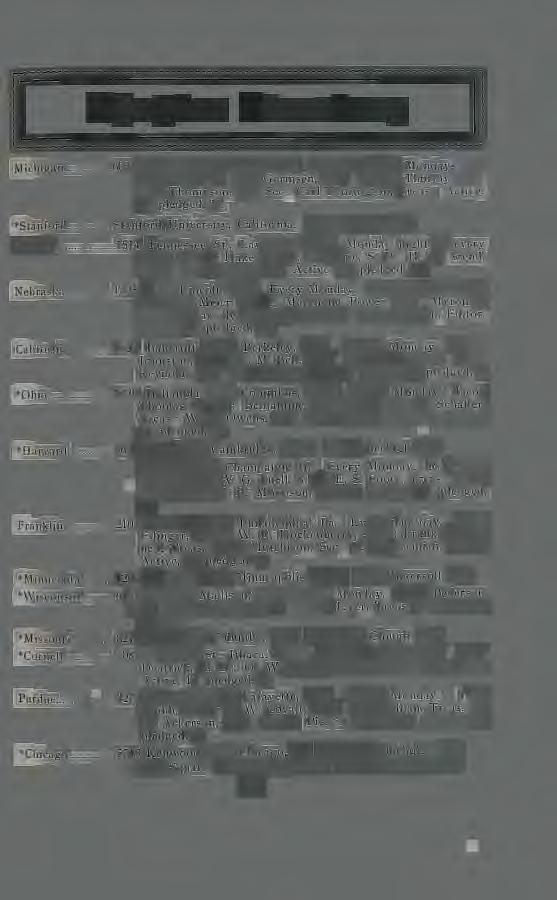
Michigan .......... ...... 603 State St., Ann Arbor, Mich. First and third M o ndays. A. R Smith, V. D.; Carl Gormsen , S.D.; Harold Thurlby, Sec .; L. S. Thompson , Cor. Sec .; Carl Thorington, Tr eas . Active, 17; pledged , 11.
*Stanford .Stanford University , California. 0 L. Oliver , Sec.
Kansas ..... ...... ......... 1514 Tennessee St., Lawrence, Kan. Monday night of every week W. 0. Hake , V. D .; E. Rhine , S. D .; H. D. A rend , Treas. ; A. B. Irwin, Sec. Active, 16; pl edg ed , 14.
Nebraska ................ 1325 R St ., Lincoln, Neb. Every Monday. Ever ett Carr , V. D. ; Louis A. Mei e r, S. D.; Marchelle Power, Sec .; Myron ]. Garey, Tre a s.; R. E. Shutt, Cor. S ec . ; C. A. Sjogren, Editor. Active, 11; pledged, 16.
California l634 Bancroft Way, Berkeley, Cal. Every Monday. M A. Johnston, V D. ; L. M. Bell, S. D.; C. R Bell, Tr eas. ; R. A. Reynolds, Sec.; H R. Weber, Editor. Active , 19 ; pledged , 2.
*Ohio .......... ... .. ....... .1830 Indianola Ave, Columbus, Ohio . Every Monday. Jacob Thomas, V. D .; Benjamine Col e, S. D.; E. F. Schaffer, Treas.; W. G. Owens, Sec.; C. M. Rose, Cor. S ec . Active, -; pledged,-.
*Ha rvard .16 Prescott St., Cambridge, Mass. H R. Bechtel , Sec.
Illinoi s 501 E. Daniel St., Champaign, IlL Every Monday R. ]. La s· celles, V D.; W. G. Tuell , S D .; E. S. Foot e, Treas. ; H H Love, Sec.; W. R. Morrison, Editor. Active, 11; pledged, 14.
Franklin .210 South 36th St., Philadelphia, Pa. Every Tuesday. E. E. F.dinger, V. D ; W R. Hockenberry, S D .; Frank R. Purnell, Treas.; R. B. Hutchison, Sec. ; D. B. Jeremiah, Editor Active, 16; pledged, 1.
*Mi nn es ota ........... .1206 5th Ave ., S. E., Minneapolis , Minn. G. E. Ingersoll, Sec .
*W isconsin 615 L a ke St., Madison, Wis. Every Monday. ]. D. Pederson , V. D.; Harold Axley, S . D .; L. E. Meyer, Treas . ! L. W. Bishop, Sec.
*M isso uri 821 Rollins Ct ., Columbi a, Mo. Robert S. Clough, Sec.
*Co rnelL .708 E. Sen eca St., Ithac a, N. Y. P. G. McVetty, V D .; E P D ea trick, S. D ; 0 . W Dynes, Treas. ; H. F. Hand, S ec Active, 11; pledged, 3.
Purdu e.. .. ............... .-427 State St ., West Lafayette, Ind. Every Monday. P. S. Webb, V. D.; R. W. Covalt , S. D.; ]. 0. Kilian, Tr eas .; H E. Ackerson, Sec. ; L. M Pickett, Cor. Sec Active, 24; pledged, 3.
*C hicago 5719 Kenwood Ave ., Chicago, IlL Albert M. Bucholtz, Sec
*Ya le 16 York Square, New Haven, Conn Albert F. Coyle, Sec 209


Columbia Columbia University. First a.nd third Fridays. S. A D. Jones, V. D., 225 West 35th St., N'ew York; Clarence 0. Hawley, S. D , 600 West 122nd St., New York; ] ohn W Schoenfeld, Treas., Furnold Hall, Columbia Universi1v; Fred M. Richmond, Sec., 210 Livingston Hall, Columbia University. Active, 13; pledged, 0.
Iowa State ............ .Lincoln Way and Beech Ave., Ames, Iowa. First and third · Mondays. L. W Coquillette, V. D.; 0. G. Wheaton, S. D ; F. F. Householder, Treas.; A R. Bird, Sec. Active, 16; pledged, 7.
Iowa lowa City, Iowa. Every Monday. H. C. Harper, V. D.; G. F. Patterson, S. D.; 0. ]. Kirketeg, Treas.; B. C. Condit, Sec. Active, 11; pledged, 6.
Pennsylvania .. ...... .State College, Pa. First and third Mondays. ]. Martin Fry, V. D. ; ]. Swain Godfrey, S. D.; R. B. Latta, Treas.; D. A. Campbell, Sec. Active, 16; pledged, 4.
Washington .4703 18th N. E., Seattle, Wash. Every Monday. W. E. Hendricks, V. D.; Clarence Anderson, S. D.; S. L. Simpson, Treas.; C. L. Palmer, Sec. Active, 15; pledged, 7.

Colorado ................ J315 11th St., Boulder, Col. Every Thursday. H. N. Orr, V. D.; Stanley Walbanfl, S. D.; K. S. Earp, Treas.; Carl Parker, Sec ; M. Shugren, Cor. Sec. Active, 16; pledged, 1.
*Syracuse .708 University Ave., Syracuse, N. Y. First and third Mondays. Kansas State 821 Osage St., Manhattan, Kan. Every Wednesday. H. D. Reedy, V. D.; G. C. Gibbons, S. D.; G. A Bolz, Treas . ; W . W. Frizell, Sec.; G. C. Gibbons, Cor. Sec. Active, 17; pledged, 8.
Texas 2309 San Antonio St., Austin, Texas. Every Wednesday. E C.
Chicago Nelson, ]r., V. D.; ]. H. Byers, S. D.; H. B. Jones, Treas . ; A R. Howard, Sec. Active, 21; pledged, 5.
ALUMNI ASSOCIATIONS
New York.. President, Warren W. Hilditch, Yale, '09, Orange Memorial Hospital, Orange, New Jersey; vice-president, Walter Royal ]ones, Chicago, '09, 237 Seventh Ave., Brooklyn, N. Y.; secretary and treasurer, Chas. G. Beersman, Franklin, '15, 244 5th Ave , New York City.
lndianapolis Pr e sident, George E. Gill; vice-president, Ernest C. Carr ; secretary and treasurer, R. E. Simpson, 106 S. Elder St , Indi a napolis, Ind.
* Your secretary has neglected to send in the information asked for Plea se see that the Editor h a s your street address, night of meeting chapter officers and numb e r of men acti v e and pledged. '
Your ] ournals wili be mailed according to the number of men reported active for each issue.
210
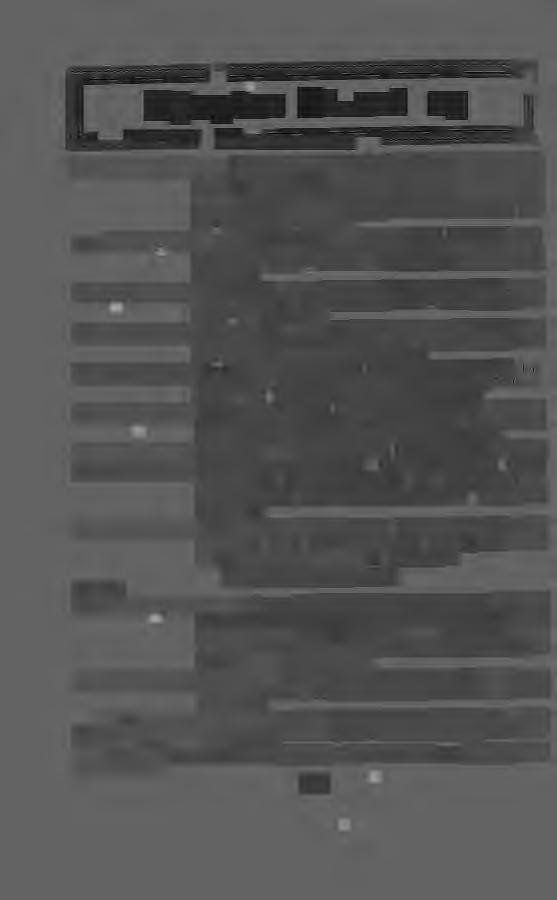

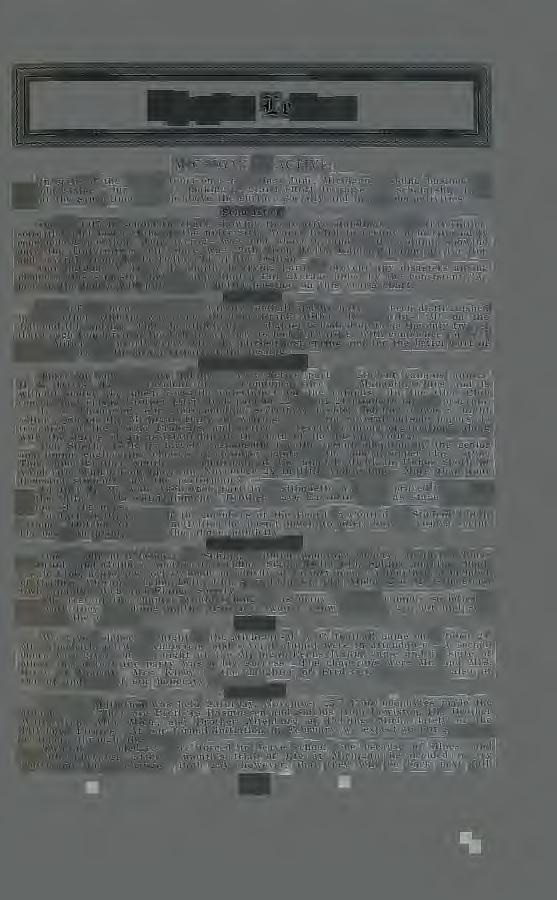
In spite of the loss of fourteen seniors last Jun e, Michigan is doing business at the old stand. Our m e n are making a grand e ffort to raise the scholarship rank and at the same time to keep above the surface socially and in campus activities.
Schola s t i c s
On the 1916-16 scholastic chart, showing the relative standings of all fraternities sororities a n d house - clubs in the university, Acacia failed to occupy a meritoriously conspicuous position . Our average was just above C, and in the column showing only the fraternities, our place was 20th from Delta Kappa Epsilon at the top and seventh from Theta De l ta Chi at the bottom .
Our untiring V. D ., A. R. Smith, is tryin g hard to prevent any disasters among pledgees this semester and we hope that a fair average aided by the consistent "A" men in the house will put us in a better position on this year's chart.
Athl etic a
None of our men were out for varsity football and we hav e not been distin g uished in any other ath l etic way since Brother Frank Miller, ' 18, won his "M" on the diamond this spring. This one athlete of our chapter is looked up to as the only twirler that Coach Lundgren of the ba ll tossers has to look forward to with confidence for next year. Mille r won near l y every game he p i tched last spring and for the better part of the season he did the heav i est part of the tossing.
Ca mpus Activities
Three o f our men are taking a very active part in student campus affairs. H. L. Davis, '17, is president of the Combined Glee and Mandolin Clubs and is without doubt the most versatile entertainer on the ca mpus. In th e Glee Club concert l ast spring Brother Davis took part in 22 out of 24 numbers on the program.
L. S. Thompson , our corresponding secretary, besides holdin g down a night editor's job o n the Michigan Dally, is writing sports for several outside papers, Is treasurer of the Cercle Francais, and active in several campus organiations along with t h e duties of an assistantship to the dean of the lit e rary college
Don Smith, '17 E, is largely responsible for the recent adoption by the senior and junior engineerin g classes of corduroy pants as the official upper class style. This same Brother Smith was chairman of the annual Michigan Union Spotlight Vaudevi ll e which took place on November 28 in Hill Auditorium More than four thousand students saw the performance.
Brother L. W. Van Aken took part In a si l houette a :! t that proved to be one of t h e "hits" of the entertainment. Brother Raye Eastman acted as stage manager of one of the acts.
Broth er Smith is one of the members of the Board in Control of Stud e nt Publications. Outside of these activities he hasn't much to offer, but he enjoys seeing his name in print, hence the above publicity Honor Societies
One of our men b e longs to Sphinx, a junior honorary society; another b e lon gs to Druids and Griffins; another to Griffins, Sigma Delta Chi, Sphinx a nd the Quadrangle Club, a literary society made up chiefly of faculty m e n. A fourth is a member of Griffins, Vu l cans, Sigma Delta Chi, Tau Beta Pi, Phi Alpha Tau, Toastmasters, Owls and the Web and F l ange Society.
The rest of the chapter wou l d be l ong to as many or more campus societies if the work they are doing in the fraternity would allow them to get out and seek fame on the campus.
We gave a dance the ni g ht of the Michigan-M A. C. football ga me on October 21. Mrs Goodrich acted as chaperone and several alumni were in a tt e ndan ce. A second dance was given on the ni g ht of the Michigan-Pennsylvania game and in spite of Michigan's defeat the party was a big succ es s. The chaperons were Mr. and Mrs. Kirby of Detroit. Mrs Kirby is the dau g hter of Fr e d e rick B. Stevens, also of Detroit and one of our honorary m e mbers.
Our first initiation was held Saturday, November 25 Four neophytes made the arduous trip. They are Brothers Rasmussen and Shi el ds from Lewiston, Ill., Brother Watts from Alto, Mich., and Brother Altenbur g of Belding, Mich., late ly of the Pittsburg Pirates . At our formal initiation in February we expect to put six more beginners through the mill.
Two of our pledges were forc e d to leave school, one because of illness and the other because, after a month's trial of life at Michigan he decided to try matrimony for a change Both say, however, that they will be back n ex t fall
Brother Carroll Collins of Charlotte, Mich , who was compelled to remain out of school this semester because of illness will be back at the beginning of the second
Robert G. Towner, who came to us from the Stanford Chapter, wae seriously ill with pneumonia for three weeks. He is back in sch<?ol now carrying half of his original schedule of work and expects to be able to stay With us.




The week-end of the Pennsylvania game, and one week before our initiation, Grand Counselor Woodw ard paid us a visit and conducted an examination of the chapter. Brother Woodwa!'d had some pertinent remarks to make and we have a lr eady begun the business of putting several of his suggestions into practice. Enterta.in

On November 1st a reception was held at the chapter house for all resident Masons including students Unfortunately a Republican rally, announced on too short r{otice to allow postponement of the reception, made the attedance somewhat · smaller than }t has been in the past at similar entertainments, but the fairly good repres e ntation that was ab l e to co me reported an enjoyable time.
This is th e second entertainment of its kind h e ld in the new chapter house and it is probable that it will become a regular yearly function.
We have been glad to see the numb er of visits from our alumni increase appreciably this year, and the chapter wishes to urge any who may read this letter to keep up the good work by coming back to the home stamping ground at every opportunity,
Stanford Chapter started the fall semeste r with ten members, seven of which were ac ti ve, and four pledges. The pledges were John Tracy Barton of Milton, Oregon; C lar ence M Byrd of Salem, Oregon; Hugh McElwee Kent of Berk e l ey, California, and J Melvin Wharton of Portland, Oregon
The initiation of th e pledges took place in the Masonic Hall at Palo Alto on Sunday afernoon, the 8th of October, and was attended by a fair delegation o! Acacians from Palo Alto, San Francisco an d the surrounding country. The Initiation took up the major part of the afterno on and at 7 p . m. a ll retired to the chapter house, where supper was served. The evening was spent pleasantly, the older members of the fraternity telling stories of th e organiation of the chapter and Ita early days on the campus.
Louis Owen has charge of the varsity third rugby team and has done wonders with his charges considering ecarcity of material and constant interruptions caused by his players g oing to the freshman and second varsity teams. Owen travels nearly every Saturday to s om e neighboring town to referee the preparatory school matche s and is gaining quite a reputation for himself in this capacity. He expects to get a trip for his team in the n ear future tG one of the bay towns where a formid able combination can be found to comba t
Shortly after the beginning of the semester the silence of the house was broken by th e uncanny tread of a stranger u pon our peacefu l threshold. The stranger had an accumulated growth of upwards of three months of fungus, well concealing the delicate features o f the face underneath. After the libera l use of a Gill ette and a l usty application of soap and water the brethren were able to recognize th e features of our long absent William Maxwell Marker. M r Marker, more famil i arly known as "Shorty," has been topographer for the California State Highway Commission. After two years of this work "Sh orty" decided to take o n a littl e more education In the civil engineering line and consequently is back pursuing his course in this field , and expects to graduate n ex t spring.
The Stanford Kennel of the Order of the Yellow Dog initiated five new members to the rank a nd file of the mon gre ls at the chapter house early this fall. Brother Oliver officiated as Sco ut Cur and Brother Barr as Chief Grand High Cur. Richard Scofield from the Berkeley House was a visitor He attended the in! tiation ceremonies
Our New Men
During "Rush Week," which lasts four days at this institution, we succeeded In obtaining nine strong men. Materia l was in abundance this year and our good standing enab l ed us to obtain the very ones we w ished .
New Addition to Our Rouse
T aki ng the Initiative our landlord h as built for us a sun parlor and an Immense which has pro ven to be a great asset to our h ouse in appearance
We. have six men in nati onal pr o fessional fraternities, all very prominent In their respective ones. One of our men Is an active "Innocent," an honorary senior society, composed of thirteen of the most prominent seniors. In scholarship last year we took first place the first semeste r an d second the last. There are twenty fraternities here .
Thr ee of our men belong to the football t eam and anoth e r on Club and two are drill captains.
thE> "track squad," one being captain. O'ne Is on the basketball team . Five men belong to the Glee
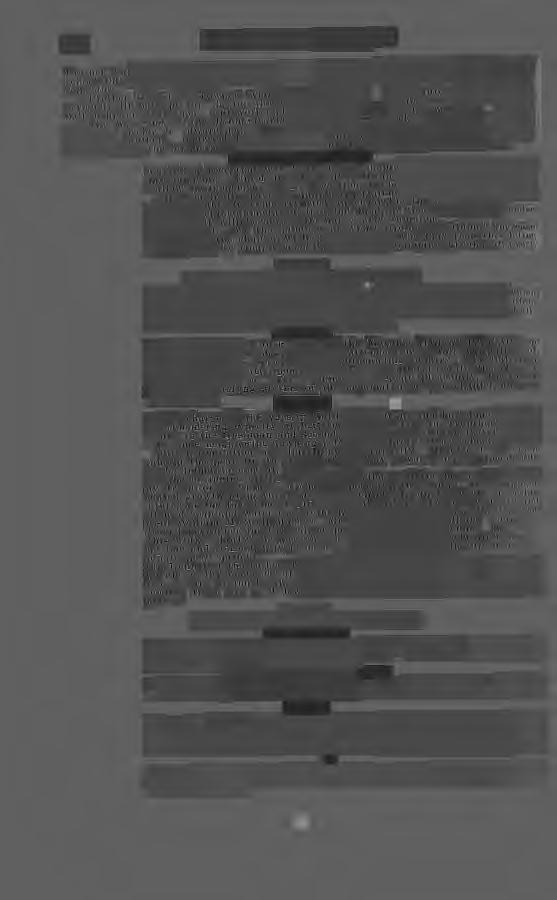


Social Activitie•
We hav e given one large party, a house party and have one scheduled for " ovember 18. We also are giving mid-we e k parties, where we invite a single sorority In tor an hour dance. These have made a g-reat hit for us.
Join the Local Pan-Ke1
Finally we accepted the invitation to join the local Pan-Hellenic Union and have found that it has already helped us greatly.
Ye John Harvard Chapter of ye Acacia. Fraternitie doth extend h eartie greetynges to all within ye Inner Gate of Samos, and trust eth that ye cominge year will prove most pleasant and profitable. ·
Ye prospects for our chapter ar'i\ indeed most e xc e ll ent. Yea, ver ily, for are we not ' commencynge ye present year with nin eteen as lu stie yeo men as e'er wore ye ryte-tryangle " In sooth, our number consl steth of V. D. Johnson and Brot hers Adkins, Amundson, Beavers, Bechtel, Becker. Davidson, Harris, Hayes, Hoffman, Leonard, McAllister, Needham, Rhod es, Sanderson, Smith, Tufts, Turner and Willard.
Ye chapter house is full to ye overfiowynge with ye most worthie and studyous of ye Brothers, ye house havynge been cleaned and repaired durynge ye summer in ye most thorough of manners.
On ye eleventh of November, followyn ge ye tourn ey with ye Princeton Knights of ye Leathern Armour, ye Beau Brummels of ye chapter did brynge manie faire maidens to ye house to trip ye li g ht fantastic, sustaynynge ye tyresom e with tea and suchlike nutritious provender. And lo, y e festivitie was a grand success, so that great is ye credit due ye Rt. Honorable anrl Worthie Brother Leonard for ye paynes and troubles he was put to in ye arrangement thereof. In sooth, ye success was so great that several of ye brothers formerly of ye species known as "Ye Haters of Ye Faire Sex," have gone about ye house of late with ye hangynge head and ye sad and pensive look e.
And lo, ye talk waxeth loud of a newlie conceived project, yea, eve n a formal dance, so that even now is ye place made definite and ye time set for ye e ighth of December next.
Ye smol<er committee hath these manie weekes past been lurking upon y e trails of worthie men-of-ye-trowel. And lo, ye smokers have been of weeklie occurrence, with one initiation alreadie held and another in ye foreground.
On ye most unluckie day of ye month of November, beynge ye thirteenth, lo there gathered at ye house seventeen of ye brothers. Ye augurs and omens were favorable, and behold! Strange proceedynges proceeded, and unusual happ enynges happened. And as ye hour waxed lat e, three more brothers w e re bound by ye fom·folde tye-ye Brothers William Riley Cook, William Arthur Porter and Harry Hocker Dukes. Then ye brothers became ryte merrie over ye refeshments, di scussynge ye uncouth experiences wh ic h had so startled ye about thr ee
Ye chapter has been fortunate in ye l arge number of visitynge brothers. After ye Cornell frolic, several of ye men of ye distant tribe known as Cayuga greete d ye brothers here. Brothers H e rlily of Michigan and Peacock, another of ye Cayugans but now with ye Professors of ye Massachusetts Aggies herd, have lik ew i se tarried here a moment. There are resydynge within ye gates of ye univ e rsiti e B roth e rs Hart of Chicago, who proddeth ye wearie in ye science of numbers, Pindarvis of Illinois and Grammes of Wisconsin, who are followers of ye t eac hyng es of Blackstone.
Ye chapter is particularlie fortunate in havyn ge ye Grande S ec r etaire , Brother Jenkins, a frequent visitor and attender of ye m eety nges.
Brothers Sanderson and Smith are President and Secretarie of ye Harvard Masonic Club. Brother Turn e r is a business ed itor of ye "Harvard Crimson," ye dailie sheet of ye universiti e He also hath charge of a table where most heartie sustenance is offered to those having ye pryce and other mora l qualificatyons. Broth er Bechtel i s among ye number of ye :::ross-country runn e rs.
When the roll was called in September it was disco ve red that ther e returned to Illinois Chapter to make ready for the rushing season eighteen men- e l eve n active and seven pledges who had been carried ovbr from last year . The loss of twenty brothers in the graduating class of 1916 was ke e nly felt when we realized the importance of the task of filling their places Believing that conservative action makes for ultimat e satisfaction, we have pledged only six new m e n. But we are on the job and working with a number of promising candidates.
An exp lanation of why our list o f active men has not chan ge d since school started is necessary and can easily be given We took the Initi ative in prepanng a school of candidates for Initiation November 11. Grand President Brown approved the plan and will be with us to see the finishing touches placed upon ten of them. This will set a precedent of which we shall be glad to tell you more at a later date. Doing things in a big way Is not to be confined to initiations. We are making of Illinois home coming this year a decennial celebration for our c l ass of ' 06. Every alumni has been personally invited to "come home" and to judge from the acceptances that have already been received means a great big, jolly reunion November 17 , 18 and 19
Our experiment with female help in every department of running th e house proved so satisfactory last year that we have carried it on Th e new re g im e Is running along smoothly and with economy before undreamed of.

Our social program started October 27 with an informal dance at the chapter house It was a highly enjoyable af'l'air attE-nded by thirty-three At the time of the Illinois-Purdue game at Lafayette about a dozen of our men VISited with the brothers at Purdue, who did not let defeat wit)l showing them royal entertainment. The boys who were there have not QUit telling about what a line time they had at the dance given by that chapter.
At this early date it is safe to predict that we will be as well represented In all university activities as Acacia has ever been at Illinois. Our men are making literary societies honorary societies, officers in the regiment and noise in the band. Anderson, our lone "I" man, has made of himself a ha l fback among Zuppke'e invincibles. But he will not go through the year Without company. Mongrieg bids fair to place with the javelin, Carbaugh will make somebody hustle to relieve him on the court, L. H. Collins is getting away to a good start on track, while C. D. Collins takes firsts in high hurdles, low hurd l es, pole vault and broad jump. Thfs is only the beginning of what we could tell about ourselves, but to avoid running the risk of having you think ' we are boastful we deem it advisable to halt.
The annual Masonic smoker to University Masons was given by Franklin Chapter on the 25th of October. Over seventy Masons were present. Addresses on Masonry were delivered by Honorable William L Murphey and Brother Bertram D. Rearick, 33'.
The active chapter was the guest of Dr. Phillip S. Stout, '04, at his annual Hallow'een party. The chapter certainly feels indebted to the host for the royal entertainment they received, and judging by the late hour some of the fellows returned home, we can well say they had a good ti me
'l'he chapter gave its first entertainment of the year to the ladies on Friday n ight, November 3. It was in the nature of a Hallow'een party and the house was decorat e d accordingly. Dancing and cards were the chief amusements Pumpkin pies (a Ia "Mammy") and plenty of cider were on tap. The affair was such a success that it was decided to have such events each month during the year.
Extensive arrangements are being made to entertain the Corndl Chapter during the Thanksgiving recess. Football, turkey, dance, initiation and sightseeing are down on the program.
A g uest book has been added to the house and its pages are being filled with a surprisin g rapidity The following members of other chapters have already placed their autographs in it: Wm. B. Leighninger, Ohio State; V. G. Kimball, Cornell; Griffith S . Jones, Wisconsin; Robt. W. Lyman, Yale; John E. Tl'eleven, W'isconsln; Eugene P. Deatrick, Cor n ell; Rufus C. Thaxto n , Texas; J. J. Sutton, Penn State; R. A. Fife, Iowa; Le Roy A. King, Columbia; Wm Maxwell Rosenfield, Yale; Charles F. Fel e <!y, Penn State; Foster Rudolph, Penp State ; B. W. Merwin, Kansas State; H. C P1 e rce, Cornell. ·
The store, under the management of Brother J L ester Armour, is doing a thriving business. Judging by the amount of five-pound boxes of candy that are being sold to the fe ll ows, we anticipate the announcements of several engagements in the next issue of the Journal.

J J Sutton, a member of Penn State Chapter, has enterea the Wharton School of Finance and Commerce. He is living in the house and will affiliate with Franklin Chapter as soon as he receives his demit.
Richard H Nagle (Whistling Rufus) has returned after a year's absence and Is majorin g in economics .
Brothers Hardenbergh, Hockenberry, Hutchinson and Ewen were among the :·oyal rooters who accompanied the football team to the Penn-Pitt game.
Brother Armour, our delegate to the Concl ave, gave on e of the best reports that has ever been recorded in the minutes of the chapter. He has handed on the enthusiasm which he received at the Conclave and has made us all feel the national spirit of Acacia.
Th e house at the present time is full and in order to accommod_ate new men doubl e -decked beds have been purchased. Prospectives are plenty and the utmost care is being taken in rushing the new men.
On December 4 Brother August Neul:>auer, our Venerab l e Dean and House Steward, left us to take a position as agricultural teacher at Wykoff, Minn Brother Neubauer has lived in the chapter house continuously for nearly four years, has had his share in the vicissitudes attending our purchase and occupation of our present house and has been a v e ry important factor in achieving our present success. When we started our first year in this house we had only three active men, one of whom was Brother Neubauer. In the time that has since elapsed he has by constant effort for the good of the chapter, by unfailing good nature, by courage and constancy In the face of obstacles, helped very materially to make us one of the strongest fraternl ties on the campus today. We can never repay him for what he has done for us but we can and do express our grateful appreciation.


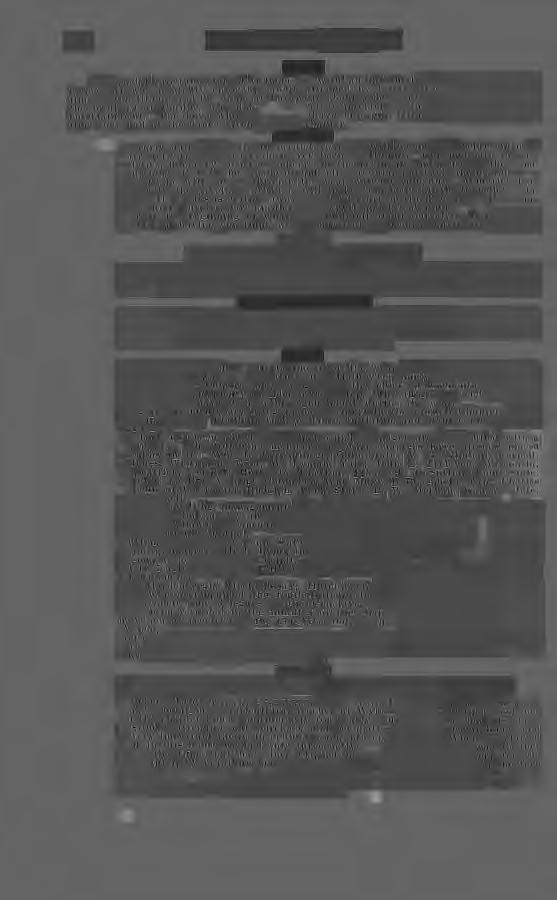
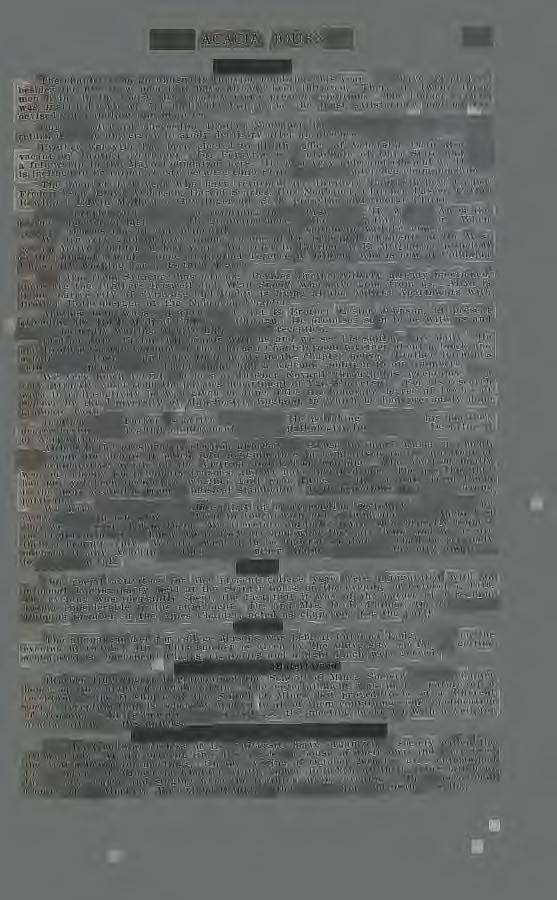
House Jlotes
The chapter Is In an unusually thriving condition this year. We have six pledges besides the nine new men that have already been Initiated. Th ere are twenty-three men living In the house-its capacity under present conditions. The budget system was Installed October 1st and bids fair to be the most satisfactory method yet devised for handling our finances
Our new steward, succeeding Brother Neubauer, Is Brother Leo Daum. Leo has returned to the university to study dentistry after an absence of two years.
Brother Forsythe has been e l ected to fill the office of Venerable Dean also left vacant by Brother Neubauer. Dr. Forsythe Is a graduate of Ohio State and has a fellowship In the Mayo Foundation h e r e. He is a very able and efficient v. D. but Is Inclined to be rather chesty becanse Ohio State won t he conference championship
The men of last year who have r et urned are Brothers Paul Stuck ey. Casper Frederickson, Lloyd Anderson, Harold S ear les. Gus Neubauer, Clarence Passer, Carlos Rawlings, Edwin Millhouse , Guy Ingersoll, S. T. Forsythe and George Clarke.
With Searles lt is a case of returning to his first love. He was at Ames the spring semester of last year. He graduates here at the end of this s e mes ter. When "Shorty " leaves one of our principal sources of excitement will be gone.
We are very g lad to have among u.s one of th e principal ornam e nts of the Wisconsin Active Chapter of last year. We refer to Brother A. E. McQuarrie, principal of the summer school in plac e of Brother Terence W. Gilbert, Who is now at Columbia University working for a doctor's degree.
Th e trio from Syracuse has l e ft us. Besides Brother Gilbert, already m ent ion e d, there are the Brothers Roswell and Allan Snody, who have gone from us. Allan Is In his native city of Syracuse and Roddy is living at the Antlers Apartments with Brother Rothenberger of the Nebraska Chapter.
Another man whose absence we r eg r e t is Brother Lester Johnson, at present attending the Rush Medical College at Chicago. He promises soon to be with us and we are patiently waiting to give him a warm reception.
Brother Jules Frelin still boards with us and we see his smiling face dally. He and Brother George Barnum of the Chi cago Chapter room together about a block and a half away from us and take their m ea ls in the chapter house Brother Barnum's skill at the piano and at brid ge make him a welcome addition to our number s.
We very much r eg ret the lo ss of Brot h er Kovalik through his acceptance of a very attractive offer from the physics d e partment of Yale University. For his research work In radio - activity he was given in Jun e, 1916, the honorary degree of Doctor of Sci e nce by the University of Manch<Jster, England, in which he had pre vi ously done graduate work.
Brother John Parker is active this year He is taking work for his master's degree besides his regular emp lo yment as l and pathologist for the U. S. Department of Agricu ltu re.
Alt hou gh the presidential e l ection afforded an excuse for much warm argument, as a topic for debate it paled int o insi g nificance in comparison to the question of the comparative merits of the Victrola and Edis on machine The Victrola finally won out, chiefly for pecuniary reasons , and we have installed one. The qu es tion that has not yet been decided is whether Bu ll Frog Blues or the Sextette from Lucia Is the more desirable from a musical standpoint Both selections have very strong partisans.
We hav e created a new office, that of corresponding secretary. We wish by every means in our power to k ee p in touch with our a lumni and mal<e th e m f ee l that we are interested in them We th e refore cordially invite and earnestly requ es t the brethren to let us know where th ey are and what they are doin g and we assure them a prompt reply. We a l so wish it to be understood that we shall be seriously of! ended if any Acacian of this or any other chapter comes to the city and fails to pay us a call.
Our social activities for the p1·ese nt co ll ege year were inau gurated with an Informal dancing party, held at the chapte r hou s e on the evening of October 7, 1916. The eve nin g was pleasantly spent, the fact that it wa s of the nature of a reunion adding considerable to the enjoyment. Dr and Mrs D. B. Palmer, th e form er an alumnus member of the Ames Chapter, acted as chaperons for the party.
The annual smoker for college Masons was held at Cataract Lod ge No . 2 on the evening of October 4th. This smoker is given by th e univ e rsity, so far as ge tting acquainted is concerned. Cigars, cigarettes and a light lunch were served.
llotines Freshmen Entertained
Brother Guy Ingersoll e nt ertai n ed th e School of Mines Society at our chapter hous e on the night of October 18th. '.rhe entertainment was In the natur e of a reception to the freshmen of the Schoo l of Mines, but proved to be of a d1f'ferent sort of reception than is ge nerall y applied to all of them containing some modification of "red owl." Refreshments were served and the meetin g broke up with a yell for Acacia, given by the miners.
Our Eastern Star sisters of the university ha ve organized a society called the Arema Club. At t he present time they ha ve no house of th e ir own and h ave used the Acacia house for meetings. O'n the evening of October 26t h th e g irls e nt ertained the members of Minnesota Chapter at th e hous e in token of their appreciation of this favor. Cards and singing were the features of th e e v e ning, with an occasional reading of the Gopher. We extend thanks to the Aremas for a pleasant evening.

Tamarack Hall, located at the corner of Como Carter Avenues, was the scene of our second informal dancing party on the evenmg of November 18th. This party served the double purpose of .a after our Wisconsin game, and as a means of entertainment for our v1s1ting W1sconsm brothers. We were pleased to have four of our Wisconsin Acacians with us at this party, namely, Birch, Fled! r, Johnson and Saecker. Mr. and Mrs . T. M. Broderick acted as chaperons for the occasion.
The active chapter entertained the alumni members at a smoker held at the chapter house on the evening of November 17th. We are sorry that more of our alumni could not be present, but hope to see them at Bridge and five hundred were the means of entertainment, after wh1ch a li ght lun ch was served.
Plans have been made for our first formal dinner and dance for this year. This party will be held at the chapter house on December 16th. We have eliminated flowers and taxicabs for this occasion. This formal is but a fore runner for others! since we expect to enlarge upon our activities in this line . A six o'clock dinner wil be served and dancing will commence at about 9 o'clock. No plans have been made as yet for our activities after the Christmas and New Year holidays. However, we expect to hold several parties, it being the plan of the chapter to give the members opportunity to attend outside functions as well as our own. ·
Le Roy Thomas of Dodgeville, Wis., student in the College of Dentistry. Le Roy ha!> hardly been with us long enough for us to become thoroughly acquainted with him . We believe, however, that he will make a good record and do us credit.
Roscoe C. Kirkpatrick Is a Hamline graduate with a degree of Ph. D., and he has been an assistant in the mathematics department at Hamline and an instructor in the Jackson High School. He is studying mining engineering in the College of Mines here.
Carl L. Schumann, Morris, Minn., an instru ctor in organic chemistry, Is a graduate of the University of Michigan, where h e received successively the degt·ees of B. S., M. S. and Ph. D. in chemistry. He is a member of the honorary fraternity Sigma Xi.
Glenn H Lanphear is a resident of Minneapolis and a graduate of Central High. He has a very distinguished record as bowler, being one of th best in the city. He will be the mainstay of our bowling team this winter. Chemistry is his chief collegiate pursuit
Oliver W. Guilbert, familiarly known as "Twist," is the third of our trio from ViTaseca and our second druggist. He believes that the Ed ison is the greatest voice reproducer ever invented a:nd should not be confused with the ord in ary talking machine In spite of his apparent extreme youth he is a Royal Arch Mason, hut has not outgrown the need of occasional discipline.
Guy A. Nelson of Pelican Rapids is our lon esome academic, and a freshman at that. His specialties are Spanish and doing the Highland fling for the edification of the brethren.
At the risk of making them feel somewhat puffed up, we must acknowl edge that we have a very promising appearing group of initiates. Nine men have been initiated this semester and almost as many more will probably be initiated next semester. A list of the new men fellows:
lngvald G. Bergh of Madison, Minn., student in the College of Dentistry, was initiated October 19. Before coming to Minnesota he attended Hamline University, where he made a good rE:cord at basketball. We expect, with his assistance, to make a good record in the interfraternity basketball l eague this winter.
Vernon D. Whitaker was initiated at the same time and is also a senior in the College of Dentistry. His home is at Litchfield, Minn. He is also a member of the Delta Sigma Delta professional fraternity and of the Gray Friars.
Minos A. Smith, initiated October 19, is our man from Oklahoma, where for two years he was principal of a graded school before he came to Minnesota to study law. He has invested in oil wells in his state in the district where millionaires grow overnight, and we naturally expect that some beautiful day he will give us a ride in the limousine he will get when his oil well turns out to be a gusher
The fourth man to be initiated October 19 was C l arence W. Passer of Waseca Minn., a junior in the College of Dentistry. He began work here in the College of Engineering, but like Brother Daum, de cided that filling molars with cement at solid go ld prices was a much more remunerative occupation. Clarence was on Dr. Williams' squad of football m e n this fall but just missed breaking into the newspapers.
The second initiation took place on November 14. Of the three men taken In at that time, Harry A. Miller, a sophomore in the College of Medicine, has the most distinguished record. He is a graduate of the St. Cloud State Normal and had degrees of A. B. and D. P. from Dixon College, Illinois. He has been a principal of schools two years in Minnesota, Professor of Science in Marion College, Fredericktown, Mo., and Dean of the Scarritt College of Merriville, Mo. Needless to say, as a student he will be of great assistance to us in maintaining our scholastic standing. 0. Young, Le Roy, Minn., began his college career at Carleton, where he recetved a degree of B. S. and was made a memb er of Alpha Sigma Rho, a local honorary society. He is studying medicine here and belongs to the Phi Beta l'l medical fraternity.

Leslie G Engstrom is from Rocl<wcll City, Iowa, and is a student In the College of Chemistry. He plays the plano, the tuba in th e uni versi ty band, the ukelele, and he warbles like a lark. Altogether he is a valuable acquisition and we appreciate him. Our last Initiation was November 28, at which time W. N. Williams and Ralph J Garber took the voyage. Th e latt er i s an Illinois man, having r ece i ved a de g ree of B. S. from the College of Agriculture of the University of Illinois. He has taught agriculture at Morgan and Monticello, Minn. At present he is ta king g radu ate work In agriculture.
Ward Williams Is another of our rather lengthy list of men who have had teaching e xperience. Being married h e cannot live in the house, but he and his charming wife favor us by chaperoning some of our parties. Williams has bee n prlnc'lpal of schools at St. Clair, Minn., and Is now a sophomore In the College of Dentistry
T e n active members and four holdover pledges were all that the Wisconsin Chapter had to start off the 1916-17 school y ea r. Needless to say, this condition meant a lot of work on the part of the men returnin g, and th e first two months of the semester have not found any end to the activity of r eb uildin g the chapter.
About a doz e n men got back to schoo l ea rly, howeY e r. and th e r esult has been a numb er of pledges who individually and co ll ectively look lil<e a fine lin e o f future Acacians at Madison.
The four original pledge m e n alluded to above were tak en into the active chapter three w ee ks aft e r school open e d- o n Friday, the 13th, as they will always r e m e mber that October Initiation day Starting out with Brothers Pederson, Bishop, Young, Fiedl e r, Crawford , Ax l ey, Brendel, Mucks, Meyer and Piggins , th e active list now Includes also Brothers Birch, Gregg, Holman and Van Liere, by initiation, and Brother Drips of Washington Chapter by affiliation. In addition we have Broth e rs Newmann, Knorr, Murray and Benton, the latter of Harvard Chapter, who are "just as good·' as active.
A strenuous rus hin g season resulted ir. the pledging of Carleton Saecker, a graduate from Lawrence College and a junior engineer; Dan T ea r e , a commerce junior; Eber Simpson, a first-year medic; Karl Borsack, classmate of Simpson; Welton Johnson, commerce junior; Geor ge Armstrong and Gus Schilletter, graduate students from Clemson College, South Carolina; G eo r ge J e nl<ins, a commerce sophomore, and Meade Morris, brother of "Silent Tim ," a l so a commerce junior Friday, No vembe r 24, ends the pledge term of five of thes e men.
The chapter entertained the Masons of the university and of Madison at a smoker, the first school eve ning of the sem este r, and a couple of weel<s lat e r the Mad i so n Lod ges gave a similar eve nt. Two hou se dances were followed by a home-coming dance October 27, and for the week of November 19- 25 two mor e events were planned, a p l edge dinner, to which our pledge men Invited one pledge from eac h other fraternity In school, and a house dance on Saturday evening.
The chapt e r has again entered the int erfrat er nity bowling and basketball leagues. Arlie Mucks, weight heaver of note, has l e d his bowling quintet to e le ven wins in the first eighteen g ames; and Saecker, who captained Lawr e nc e Co ll ege's team last year, has been gi'(en the l eadersh ip of the basketball forc es.
One of our new men, Simpson, is halfback on the varsity squad and rated as one of the best in the Western Conference He also plays b aske tball and baseball. Birch is ed itor of the Badger, the annual boo!< published by the junior class at Wisconsin. He and his sidekicker, Holman, are two of the l eadi n g politicians of that class and of the Commerce School. Holman has be e n e lected to the Student Senate.
Mucks again served as chief of 11ol ice at the annual class rush, with g reat credit to himself. He is now busy as chairm a n of the general committee for the big football banquet for 1,000 men, to be held the ni g ht of the Wisconsin-Illinois game, November 25.
Brende l is solo c larin etist of the band, and incidentally the m ain spring of the musical efforts in the house.
Acacia at Wisconsin slumped somewhat in scholarship a year ago but there were two red ee ming featur es. Th e Active Chapter arose from tw e nty-third to sixth among the fraternities, from the first to the second semester l ast year. The Acacia pledges ranked first both semesters among fraternity pledg es. It is to be hoped that the new blood will mak e g ood the prediction that the pledges' work of last yearOnesuggests. more item before closing. Santa Claus has been here already and we hop e h e does as well by all the other ch apters as he has by us. A cabinet Victrola is the newest a ddition to our par lor attractions.
Since our last l etter the one big event in our chapter was th e Eleventh National Conclave. It looked for a time as though the threatened r a ilroad strike would put a crimp in every arrangement, but when one considers that of the twenty-five chapters of Acacia only one chapter could not arrange to have a delegat e on the floor, it means that no effort was spared to make this Co nclave the best ever. We at Purdue
were very proud to have the great honor of entertaining the Conclave, and it affords us no little satisfaction to learn that all visitors and delegates spent an enjoyable time with us. It was a great pleasure for us to become more Intimately acquainted with the officers of the National Fraternity and the men of the other chapters. Realizing the opportunity given us in having the Conclave here, espeCial efforts were made to have the house in order During the summer a number of the fellows remained in the house and kept things in fine shape, and also did no little work in fixing up the odds and ends. Our chapter room was provided with a suitable ceiling and the beams covered with cypress and stained. The exterior of the house also received a coat of paint; in fact, things everywhere were put in first - class shape.



The chapter was particularly fortunate in having nineteen o l d men to form the nucleus of the chapter this year. A pretty good start. Six men have been pledged and will take the long journey in due time. Brother Laramore, '15, has been transferred to Purdue for the winter, and is working toward a Master's degree. We have a large field to choose from here and a number of good prospects are under consideration now. Our chapter roll should include thirty men by January 1st. The men in the house represent the four classes and the different departments of the university about equally.
In the world of student activities the chapter is still tal<ing an active part. This year we have in the house the football, baseball and basketball varsity managers, an assistant manager in football, two editors on the staff of the college daily, and other men in class offices and other lines of student activities These all tend to make Acacia have a large influence among the students. Our standing among the other fraternities in regard to scholarship is near the head of the list, as we ranked third last semester, excluding the honorary fraternities.
We have done very little in the social line so far this semester. Our annual Masonic smoker for the Masons of the university and faculty was held in the chapter house on the evening of October 3rd with over 120 in attendance In this little social gathering we become better acquainted with the Masons of the student body and faculty, and an excellent opportunity is afforded to get a line on prospect8. Our first dance this semester, given in honor of our p l edgees on October 28, the evening of the Illinois-Purdue game, we had as guests eight of the men from the Illinois Chapter who had come over for the game. The chapter was delighted to have the opportunity and we sincerely believe that little visits like this are the surest way of bringing abo u t a closer re l ationship of the ditrerent chapters. Of course it is impossible for all chapters to visit with each other, but those in each section could, with very little difficulty, make weel< - end trips to neighboring chapters. The Chicago Chapter extended an invitation to Purdue Chapter to attend their autumn dance on the evening of the Chicago-Purdue game. Eight of the bunch attended and a most enjoyable evening was spent in dancing and becoming acquainted with members of the Chicago Chapter. Purdue Chapter extends to all brothers a hearty invitation to make the chapter house a stopping place when they are In the vicinity. Come and see us, even though it be only over night. Our annual home coming will be held during the week end o f the Indiana- Purdue game, and an el'rort is being made to have a large number of "old grads" back at that time. The social calendar is marked December 15, the Friday befcre the university closes for the holidays, as the date of our formal dance. The success of our first effort last year is creating an unusual amount of anticipation for a good time for this dance and I am sure none will be disappointed. The two dances mentioned will be all that we attempt in the way of social acti•; ities during this semester.
High Cost of L i vin g
Owing to the increased price of food materials, it was deemed advisable for the steward to increase the cost of board from $4.25 to $4.50 per week. Along with the Kansas State Chapter, we are providing ourselves with a new set of dishes, which will fill a long-felt need
Scarcely a week goes by but some one of our old men drop in to see us for a while; some can only remain over night, others make a longer visit. The longer they can stay, the better we like it, for we want them to know that the ActiYe Chapter is interested in them, and to have them keep in touch with what we are attempting to do. Not only our own men visit us, but men of the other chapters drop in occasionally. Just recently Brother Leach of Ames spent a few hours with us. We wish more could their paths leading this way
In closing, the Purdue Chapter extends best wishes to all sister chapters and many brothers as possibly can to drop in and say 'h'ello." You are always
The members of the Iowa Stat e Chapter returned this fall looking forward to a new fraternity home, which was started late last spring and which we expect to move Into by the middle of November.
It is the hope of the chapter that we can move in and be settled for the Ames-Iowa game, November 18, 1916.
The house will easily accommodate twenty - four men.
The Old Men
The chapter started with twelve of the old men back, in fact all, except one, ot the undergraduates returned.
Venerable Dean Coquillette returned early after spending the summer with the Alamo Engine Company of Omaha, Neb.


Senior Dean Wheaton spent the summer at Chicago, Ill. , his home city.
Secretary Bird reports a good s ummer, part of which was spent at Okoboji Lakes. Professor Householder of the Physi cs department, our Tr easu r er spent th e summer at the University of Wisconsin. '
John Wooley took a trip East this summer in his "ftivver." He will be with us In the new house.
"Scotty" Wilkins unfortunately spent part of the summer In th e hospital at Rochester, Minn. He is now back at work in the Farm Crops department.
R. J. Pearce of the landscape architectural department spent th e summer a t Ames.
C H. Combs, the steward for this year, arrived in time to sav e us from starvation. Harlan W Johnson reports an e njoyable trip to Duluth, Minn ., durin g the summer.
C. R. Sandifer spent the summer working with the county engineer at Albert Lee, Minn.
F. B. Beckwith was at hom e in Rockwell City, Iowa. Among other li ght occupations he helped build a sailboat on Twin Lak e s.
C. A. Martini returned from a visit to his home In Ohio. He showed up minus his fraternity pin.
R. L. Cochrane was at ho:ne in D e nison, Iowa. "Bob" claims a real r ep utatio n as a chicken picker.
J. L. Lane worked with the good roads section of th e college experim e nt station. We regret to l earn that Brother H. R. Till has been confi n e d to th e hospital In Des Moines. Brother Till was with us in the house last year.
Iowa State has been exceedingly fortunate in p l e dgin g this fa ll. Eight n e w m e n are wearing the little black button with the gold trian g le
S. B. Worth hails from Monroe, Iowa, and is a freshman in Vet. Med.
D. R. MeHaffey comes from Eldon, Iowa, and is a senior Agronomy student.
E. F. McKune is a post-graduate in Hort. H e took his under grad uat e work at Colorado Agricultura l College.
R. W. Merritt is a jun ior Civil Engineer. He holds an A. B. degree from Gustavus Adolphus Co ll ege, Saint Peter, Minn.
R. W. Combs, a freshman in Vet. M e d., comes from Buffalo Cente1·, Iowa. He is a brother of our distinguished steward.
W. J. Little is a student of Agriculture His hom e is at King s l ey , Iowa.
H. W. Hulbert h as a teaching fellowship in the Farm Crops departm en t. Hulbert took his undergraduate work at Michi g an Agric
V. L. Hein is a junior in Electrical Eng in ee ring. His hom e is at Hubbard, Iowa Initiation
On October 28 three worthy p l e dg es cr ossed the d eser t to a better und ersta nding of Acacia Th ey were F. B. Beckwith, R. L. Cochrane and E. F. McKune. All reported an enjoyab l e trip
J. L. Lane spent a pl easa nt w ee k e nd at the Missouri Chapter on the occasion of the Ames-Missouri football game
0 G. Wheaton, C. H. Combs, F. B. Beckwith and R. L Cochrane were gues ts of the Nebraska Chapter on November 4, the occasion being the annua l gr idiron battle betwee n Ames and Nebraska
The Washington Chapter has this year moved into its n ew home at 4703 Eighteenth Avenue Northeast. We are now loc ated much closer to the campus than before and have a much better hous e We opened our doors on September 12th at the beginning of the school year with the following memb ers and p l edges: A. S. Grenland, Geo. A Jensen, Earl J. Gunther, Wm. H. Hendricl<s, Cecil F. Blogg, J C. Palmer, C. L Anderson, C. P. Suman. Pledges : Arthur Anderson, Chas. Coffman, Arthur E. Carlson, Tho s . P . Evans, Warren L. Buschlein and Chas. F . Morris. Since that time the following men have b ee n pl edged: H. Percy Rowles, '2 0, Great Falls, Mont.; Frank Martin, '20, Doty, Wash., and Jam es J. Gannon, '1 9 of K e nt, Wash. With this representation the Washington Chapter feels sure that it will have another successful year.
The annual Hallowe'en dance was g i ven at the chapter house on th e night of October 28t h. It was our first opportunity to view the new hou se arrayed in gal a attire and it certainly did look like a typical Hallowe'e n ballroom. Th e decorations were in the form of autumn l eaves, pumpkins and sho c l<s of corn together with black a nd orange streamers and Hallowe' e n novelties. Everybody seemed to e njoy themselves. The patrons and patronesses of the evening were Mr and Mrs William G. Mann, Mr. and Mrs. Dallas Johnson and Dr. and Mrs. C C Tiffin.
The annual Masonic smoker, given under the auspices of the Acacia Fraternity , was held in the Men's Building on the University ca mpus the evening of Friday, October 27th. About 85 from the city and student body and faculty attended. The events of the evening were the fencing and jiu jitsu exhibitions staged by some Japanese ath l etes. We also had a four-round boxing bout which ended in a knockout. Brothers H. A. and C. F. Blogg (Franklin and Washington), gave us exhib iti o n bouts with the Italian sabers and dueling swords. Music was furnish e d by the 37-piece Angora Grotto Band. The music:; was the r ea l t rea t of th e evening and the Washington ChaptPr is certainly deeply indebted to the members of the Grotto Band for their assistance in making it t he most succes sful Masonic smoker ever staged at the U. of W. Prof. l<Jdmond S Meany, Prof. John Weinzirl, Proph e t
Monarch Frank A. Paul and several other memb e rs of th e Grotto favored us with short talks. Brother A. S. Grenland deserves c redit for his capable manner ot holding down the position of chairman.


On Sunday afternoon, November 5th, between hour:S of 4 and 6, we entertained the moth ers and sisters of our m e mbers. To e affair was well attended by about 40 of the moth e rs, sisters and sweethearts of the men:tbers. Light refreshments were served and after meeting all of the m e mbers and mspecttng the new house they depart ep, convinced that our n ew home is far better than the old one.
Ho nors
We are pleased to announce that Warren L. Bueschlein, a junior in chemical engineering, was recently initiated into Phi Lamda Upsilon, the chemical honorary frat ern ity.
Visit o rs
Among the r ece nt visitors at the house have been Broth e r Wilson from California Chapter Brother Hoffman from Harvard, Brother Kutnewsky of Minnesota, Brother Montgomery of Colorado, Brother Blogg of Franklin, Brothers Brooks and Hurley from the Aztec Club of 0. A. C., and Brothers Daly and Todd of th e Washin g ton Chapter
On Saturday evening, November 11th, the Achoth Sorority e ntertained in honor of the Acacia at a dancing party which was given at their chapt er hous e on the University Boulevard. The boys were d e lighted with their eve nin g spent with the "Stars" and will r ec iprocate in the n ea r future.
Th e memb e rs are planning a Thanks g iving dinner and dan ce to be give n at the chapter house in honor of the visiting Acacians on the Ca!iforia football t eam, who will come to us for th e annual contest betw ee n the Gold e n Bears and th e Purple and Gold. We are sorry ind ee d that \l\Tashin g ton Chapter does not h ave some m embers on the football team because this affords a n e xcellent m ea ns for th e m e mbers to visit other chapters.
Delega t e J. C. Palmer return e d to the campus about September 21st from his trip to the Conclave. He g ave an extended report before th e chapter of all that took place at the Conclave and reported an excellent trip. He brought back with him the ritual to a new order altogether foreign to anythin g yet m a intain ed at Washington, being The Order of The Yellow Dog. A new "Kennel" was started and up to date about 19 n e w men have been initiated into the secrets of th e ord er . Monarch Frank A. Paul of the Grotto says that it even rivals his organ ization for fun and frivolity. Brother Wilson of C3.lifornia was initiated into th e my steries and expects to start a "Kennel" in California upon his return to Berkeley. We owe Purdue Kennel for the pleasures of this new organization on the U of W. campus.
Washin g ton was well r e presented in the national military circles this summer, for we sent four Acac ians to the border. They were Captain Kutnewsky of Minnesota Chapter and Brothers Coffinb e rry, Todd and Archer of Washington Chapter.
Hiram B. Conibear, crew coach at Washington a nd memb e r of Washington Chapter, has had a very ex t e nsive trip in the East. We look for his return about December 1st. Athl etics
We should not forget to mention th e athletic side of Washington Chapter. Yes, we r eally have a basketball t ea m and ha ve a manager and captain, too , but by the result of our string of de fea ts and scores p il ed up you might think our team was unn ecessa ry and would do well to retire. "We never quit." The scor es are as follows:
Sigma Phi.
Total score-O'pponents
We refus e to reveal the identity of the team.
Colorado Chapter is starting out on what promises to be one of th e most successful years of its existence.
O ur new house is a .i ewel and although a little farther from the campus than most organizations of a similar nature , we who Ji ve in the house are ready and willing to walk a little farther in order to li ve in such a house Th e distance also ha s another advantage in that rather than go to town in search of amusement th e men stay at home and study At present all si g ns point to our h eadi n g the scholarship Jist again.
On the 20th of September we gave our annual smoker for all the Masons In school and. entertained a very comfortable cro"•d Card tables were brought into play as the maJOr form of amusement and the evening was closed with refreshments of elder and doughnuts.
An infoi_"mal dance was held at the chapter house on the evening of November 6th an<!- was enJoyed by all the active members as well as by several alumni members . This was th e fir s t dance given this year and the committee in charge is to be compllmt-nted for the g ood time they showed us. Brother and Mrs. Arthur, Brother and Mrs Hagen, Brother and Mrs. Poe, and Brother and Mrs. Evans were patrons and patronesses.
Lodg e V isit a t i ons
Our Masonic t e am which made such an impression upon the Masonic circles In Bo uld er and Denver last year has returned nearly intact and is now ready for work this year. They are to put on the work at one of the local lodges in the near future and expect several invitations fr o m the Denver lodges this year.





Colorado seems to have "struck a slump" in football, but we lay it to the fact of a change In coaches. "F ightin g Bob" Evans , the new coach, has th e respect and confidence of every man on the squad and of the student body in general. It Is a safe prediction to say "look out for Colorado next year." Brother Shugren Is on the squad.
Brother Earp won the singles championship In the fall tennis t ournament. Brother Earp and A . B. W!lllson won the doubles championship in the same tournam e nt. All of the finals were bitterly contested and the winners won out only because of their steady playing In the pinches.
Note•
Brother A G. P!errott Is In the Harvard Graduat e School this year. Brot h er Dr . C. C . Tiffin was e l ected county coroner of King County, Washington, at the r ece nt election.
Colorado Chapter takes this opportunity to wish all Acacia men a very successful year and fraternal good wish es to each Acacia Chapter in addition.
Syracuse Chapter opened with five active men. We have four p l edges , with good prospects of four more. On account of the danger of infantil e paralysis, the opening of the university was postponed till October 3.
Our social activities began with a Masonic smoker October 11. Thi s proved a decided success and we expect to repeat it later In the y ear.
The time gained by the late opening of the university was spent in putting the chapter house in first-class shape and adding a new coat of paint.
At present we have eleven men living in the house. This is the lar gest numb er we are able to accommodate In our present house.
In scholarship we fell off 1.4 per cent last year. Our average was 83.2. We were surpassed by two medical fraternities but our nearest non - professional Greek had an av e rage of 89 9.
vVe suffered· in membership since a large proportion of our m e n l as t year were seniors.
On the evening of Novemb e r 16 we expect to hold an informal party, and on th e following evening, which is th e evening before the Colgate foot ball game , we shall Initiate two men. Owing to a university ruling, our freshmen cannot be initiated till the second semester.
Brothers Green, Littell and Faga n are b ac k at the univ e rsity takin g g raduat e work.
O'n the evening of November 9, Syracuse will hold a monster crew ce l ebra tion and bonfire to commemorate the victory of the Syracuse varsity and junior c rews on the Hudson last June
The chapter was agree2.bly surprised recently by a visit from Brother C. W. Perry, who was on his way home from the T e xas bordEr. Broth e r Perry was a m e mb er of the 74th New York infantry. Brother Perry was graduated from Syracu se University In 1909 with the de g ree B S., and in June , 1912, received the degree of M. S. He is married and lives at Jam es town, N. Y.
Our other members "On the Borde r" were Brothers Terzian and Ransier, both sergeants in battery A, 1st New York artillery, which return e d to Syracuse recently and was mustered out of service November 4th. Brother Ransier was a g raduate of the Law College with the class of 1915, and Brother Terzian was a g raduate of the Engin ee rin g College with th e class of 1913.
Brother John L. Jones of the Yale Chapter, and r ece ntly of th e faculty of the University of Pittsburgh, is one of t he new members o f the mathemati cal faculty of Syracuse Univ.e rsity.
Our Officers for the present year are V. D., George Adsit; S. D., John W. Faust; Secretary, H. B. Fagan; Treasurer, Preston Daratt.
Brother F. ID. Lott, who is on an extensve business trip through the Middle West, was among the recent visitors at th e chapter houst:
The opening school year finds Kansas State Chapter in excellent shape. · Our house is full, our financial standing is sound and our rushing efforts were r ewarded by our securing four excellent men. Th e pledges follow : Harry Vaupel, senior in Milling; Chauncey Yeoman, LaCrosse, Kans ., freshman in Agricultur e; Edgar Lawton, Larned, Kans , freshman in Mechanical Engineering; Neal Smith , Arcadia, Kans , fr es hman in agriculture. They are promising men and we are justly proud of them.
Chauncey has made the Freshman Varsity squad and bids fair to win a berth with the r eg ulars next year Lawton is goi n g out for basket-ball and m ay l and a place by next year
Initiati on
Initiatory ceremonies were h e ld on October fourt ee nth. Norma n A. Giles, William N. Caton and Harry Vaupel "crossed the des er t sa nds " in fine style and are now linin g up with the "old heads."
Nate Harwood is our sol e r ep r ese ntative on the Varsity squad this year, and he played a wonderful game at half in the ga m e at K. U. Fifteen of our men went to K. U. to att e nd the game and an equall y stellar at traction , th e dance given by the Kansas Chapter. We had a wonderful time "The Boys" at Kansas are truly royal entertainers.
Joe Val e a nd Alec Alexander w ere there for the ga m e and both promise to co m e and see us Homecoming Day, November eleventh. Byarly dropped in to say hello
one night, and Jimmie Bond called us up and told us he was in town and leaving the same ni g ht
Two of our men, Brother W. W. Frizell and Brother Kurt Peiser, . attended the thirty-sixth s e mi-annual Scotti sh Rite reumon of the Lawr e nce Consistory No . 6, held October 24-25-26-27, where they, with many others , an_d acquired new light and information in Masonry. returned witJ;l higher and ren e w e d zeal also with the treasurership and secretaryship, respectively, of the class. we have at present four Knights Templar and three 32" men in the hous e.


Harry Re e d is our V. D. this year and is handling the "bunch" in good shape And listen, you "old grads," we have one combination th_at simply can't, be beaten anywh e re. H!lsy, our steward, and Jim, our cook, are sett1ng a table that s certainly worth while Jim is a Santa Fe dining car product and the viands he concocts are worth coming miles to sample.
We also have a quartette The folks all say that they are the best ever; at least, th ey cannot be equalled by any bunch in town We almost forgot, but there's a second string quartette in the house that's making the "regulars" worry.
We are not bragging about our grade standing this year, but can only say that we will do better next time. Acacia stood fifth on the list last spring term. Our men are allied with a great number of college activities, which cannot help but have an effect upon the grades of the chapter. The question is, which is most worth while. Several of our men are self-supporting and their outside work seriously interferes with their study periods. However, we still have our eyes toward the top and may go part way this fall.

Our anniversary party will be held on December 9. It Is to be a "Formal," and Initiatory ceremonies will be held in the afternoon previous to the dance. We are expecting a great time and hoping that the Alumni as well as the boys from the surroundin g Chapters will be her e en masse. We are expecting to publish th e second issue of the "Kansas State Argos" some time soon, and In that organ will be found more Items of interest to our Alumni.
About fifteen of the Acacia men from this Chapter went to Lawrence Friday night to attend a Chapter danc e th ere. They remained for the Aggie-K. U. football ga me
Notes
R. W. Conover, assistant professor of the English department, was a dinner g uest at the Acacia house on Tuesday evening
Carl Baer and W. M. Shorup were up from Lawrence to spend th e week end.
The Acacias danced at th e ir fraternity house on Osage street Saturday night. Mrs. Bolz of Top eka was the Sunday dinner guest of her son, George Bolz. Dinner g u es ts at the Acacia house Sunday were Coach and his wife and Mrs. Halm of Topeka -CllppingsKansas State Collegian.
With the opening of the new year the Kansas chapter of Acacia finds itself enjoying one of the best years of its history. The entire membership of the fraternity is alive to the responsibilities of making the chapter the best and most r e presentative on the K. U. campus. Its memb e rs include men from different parts of the University, men who r ea liz e the importan ce of insuring a firm, steady growth of both the local chapter and the National Fraternity. Following the Conclave at West Lafayette, Kansas sees than ever before that the tr e nd in th e future development of the organization lies m th e Ideals expressed at Purdue and in those already so well grounded In the chapte rs of the great Middle West.
Fifteen old men return ed to school this year. Frank Thayer, of the Wisconsin chapt e r, now Instructor in Journalism in the University, has affiliated her e Burton Smith , a pledge at th e opening of school, having been held over from the last scholastic year, was initiat e d in Novemb e r. Floyd Hart, an active man, was forced to discontinue hi s university work because of poor health; therefore the number of active men is now sixteen.
. was the first thing th a t demanded attention. The rushing committee did Its best, With the result that fourteen men have been pled ge d this fall. Th e n ew men are: Crosby Deacon, J. R. Hess, J. A. Winchester, A. B . Richmond, A. Troup, Guy A. Robinson, Clay Fisk, 0. H. Burns, T. L. Johnson, J. E. Welker, Jesse D. Kabler, C. H Richter, B. L eRoy McMillen and S. 0. Rice.
Rice is a faculty man. At one time he attended the Univ e r s ity of Missouri, but l ef t sch'?ol to make his way in the newspaper business. H e h e ld the position of assoCiate ed itor of th e Weekly Kansas City Star before coming to K a n sas as Director of Publicity and Assistant Professor of Journ a lism. Welker and Burns are both doing so me instructional work, but are working for high e r d egrees
From the chapter plans the big Initiation of the year will be held lat e In Januar y . Kansas I;> out th e idea suggested by Michigan last year, that Is , to hold one ge n e ral tmti a tion each year. Other men pledged lat er in th e year will of course, probably be given light in Acacia in th e spring. '
Greater things are promised the Kansas chapter At one of the most successful homecoming banquets ever given, definite plans were laid for a new Acacia home, a h ome that will accommodate the n eeds of th e fraternity for the next thirty years. Alumm are bac k of the project, and Kansas C ity Acacia men are attending to the





financial end of a house that will mean a greater Acacia at K U. Over sixty attended the homecoming, following the annual football game with Missouri.
In social life the chapter has not neglected Its obligations to train the younger men and give them that something that stamps a fraternity man wheresoever he may go In later life. Several house dances have been given, and one more ostentatious party was given downtown at the time of the football game with the Kansas State Agri- cultural College. This occasion gave evidence of the cordial relation of the Manhattan and Kansas chapters. Plans are now being made for a formal party In the spring.
Kabler made a name for himself on the gridiron this fall and was recently awarded a "K." Fisk was given a reserve football "K." Wallace Hake, venerable dean and Conclave delegate, was on the debate team that met Nebraska at Lincoln just before the holidays. Albert Irwin and A. B. Richmond are on the debate squad, and It is likely that both men will be on debate teams to be chosen later In the year. Irwin is a member of the student council. Several of the men have been instrumental In forming a commercial club here.
The new men who have won honors are: Burns, a debate "K," Delta Sigma Rho, debating fraternity, and Phi Delta Kappa, educational fraternity; Deacon and Troup, Phi Chi, medical fraternity; Johnson and Welker, Nu Sigma Nu, medical fraternity; and Robinson, Alpha Chi Sigma, chemical fraternity.
The old men who hold membership in honorary societies or professional fraternities are: Clayton and Thayer, Sigma Delta Chi, journalistic fraternity; Hake, A. H. 0. K. U. Club and the Jurisprudence Club, debate "K," Delta Sigma Rho, Phi Delta Phi law fraternity; Treece, Nu Sigma Nu; Madden, Theta Tau, engineer fraternity; Pedroja, Phi Alpha Delta, law fraternity; Grayson, Phi Chi; Schreiner, Sigma Xi, honorary scientific fraternity. Arend is a member of the Black Helmet, sophomore class society, and Pedroja is a member of the Owls, a society made up of men chos e n from the junior class.
For th e first time In five years Acacia did not win the first place in scholarship for the national fraternities, having missed the honor by a fraction of one point Delta Tau Delta won first
Most significant In the newer movements of . the fraternity is the formation of a permanent alumni association. J. W. Hill, former associate editor of the Acacia Journal, was Instrumental in the establishment of the Alumni Association of the Kansas chapter. The purpose of the association Is to bring the older men into more active touch with the chapter, to assist the chapter in rushing, to bring about a better undersandlng betwee n the id eals of the older and the newer men. Noble Sherwood Assistant Professor of Bacteriology, is president of the association; J. W Hill, of Cherokee, Oklahoma, Is secretary.
The chapter has published one number of the "Letter From Home" this year. Grand Presid e nt Brown, in commenting on the letter, wrote that it was one of the best chapter letters he had ever seen. Kansas hopes to make the letter a vital forc e in unifying the men of Acacia, the men who have traveled a long, toilsom e journ e y to the portals of the Kansas chapter. Baysinger, Thayer and Ingalls are editors of the "Letter From Home "
In starting this year Kansas extends to all sister chapters the best wishes for a prosperous future. It extends to Texas, the youngest chapter, Its most sincere greetIngs and hopes that the chapt e r in the South will help in the upbuilding of a greater
The Acacia Fraternity was at hom e Tu esday eve ning to th e Masons of the univ ersity and of the city in its characteristic hospitable way. The affair was the a nnu a l Informal smoker given to the Masons of th e univ ers ity near the op e ning of th e session for the purpose of getting acquainted, and impressing a cordial w e lcom e upon all Masons. Light refreshments were served throughout the evening, and a generous round of toasts and appropriate music added to the entertainment.
Aobtu 75 were pres e nt, including a number of Masons promin e nt in downtown lodges and In the faculty. Short talks were made by W T Pfaeftlin, Wilbert H. Young, Alonzo T. McKean, Jo e Muenst e r and Dr. Wicklin e from among th e town Masons, ana by severa l prominent in th e facult y .
S ugg e stio ns
The material for the Journal should b e separated. Th e chapter letters should not contain alumni news items, nor should the alumni news ite ms b e written on the same sheet of paper with the chapter letter. Sp ace should be allowed between l as t heading of alumni news for clipping. There should be at least one inch b e tween each subdivision The best form would be to hav e a separate sheet of paper f o r Engage.ments, Marriage, Births and Alumni Personals. These suggestions are not essential but if followed will greatly assist the editor.
Write your chapter letter and then "boil it down" before reading in open meeting. There has been no attempt made to condense any of the letter appearing In this Issu e. Read them and then act according to your judgm e nt.







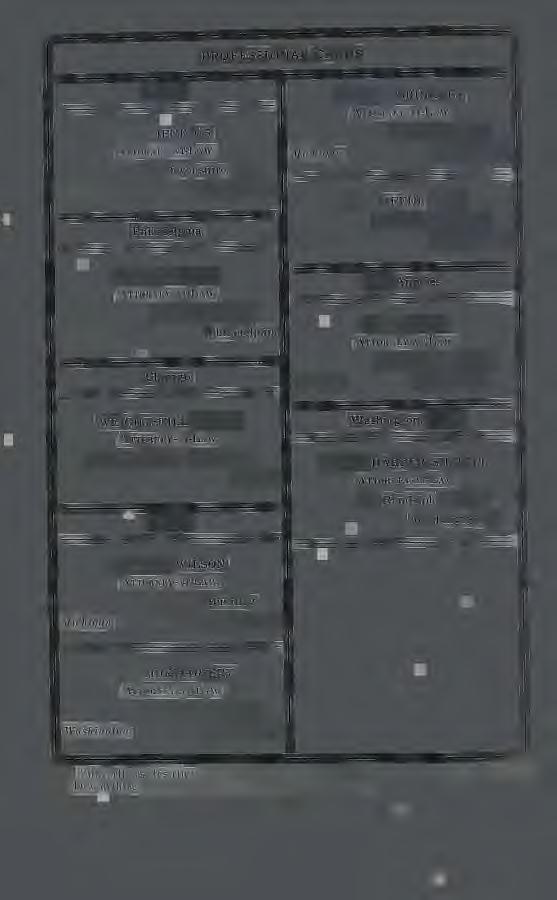
Boston
A A. JENKINS
CHAS. A. BRINKLEY
ATTORNEY-AT-LAW
New York Block,
ATTOR NEY-A T-LAW Michigan Seattle, Wash . 85 Devonshire, St., Har vard Boston, Mass.
c. C. TIFFIN, M. D . Philadelphia
Joshua Green Bldg. , Colorado Seattle, Wash
LEWIS H. KIRK
ATTORNEY-AT-LAW
575 Drexel Bldg. , Franklin Philadelphia
Los Angeles
W. L. MANN
ATTORNEY-AT-LAW
443 Title Ins. Bldg., Chicago Harvard Los Angeles, Cal.
WEIGHTSTILL WOODS Washington, D. C.
ATTORNEY -AT-LAW
Suit 1104, 112 W Adams St., DAVID HARPER SIBBETT Chicago Chicago
ATTORNEY-AT-LAW
501 Randolph St N W Seattle Washington, D. C
JOHN R. WILSON
ATTORNEY-AT-LAW
Central Building, Michigan Seattle, Wash.
V. A. MONTGOMERY
ATTOR NEY-A T-LAW
Joshua Green Bldg. , Washington Seattle, Wash.
Sub sc rib ers desiring cards should se nd copy with fifty c e nts to A. A. J enkins, 85 D evonshire St., Boston, Mass. Fifty cents a year .
224